|
|
All Countries Ships with Sails
|
 Adventure Galley — English galley Captain Kidd's flag ship. Because she had become worm-eaten and leaky, Kidd ordered her to be burnt. LAUNCHED: 1695 → FATE: Burnt and sunk at Saint Mary's Island in 1698. |
 Alabama, CSS — American Confederate screw sloop-of-war A successful commerce raider that attacked Union merchant and naval ships during the American Civil War. She boarded nearly 450 vessels and captured or burned 65 Union merchant ships. LAUNCHED: 1862, July 18 → FATE: Sunk in June 1864 by USS Kearsarge at the Battle of Cherbourg. |
 America — American racing yacht; schooner Won the Royal Yacht Squadron's 53 mile regatta around the Isle of Wight, August 22, 1851. The international sailing trophy, America's Cup, is named after her. During the American Civil War, she served in the Union blockading squadron off Charleston, then after the war as a training ship at the Naval Academy. LAUNCHED: 1851, May 18 → FATE: In disrepair, her remains were burned in 1945 at Annapolis. |
 Ariel — English clipper ship Famous for almost winning The Great Tea Race of 1866, an unofficial race between Fuzhou, China and London. On September 6, 1866, the Taeping docked twenty minutes ahead of Ariel. LAUNCHED: 1865 → FATE: Went missing in early 1872. |
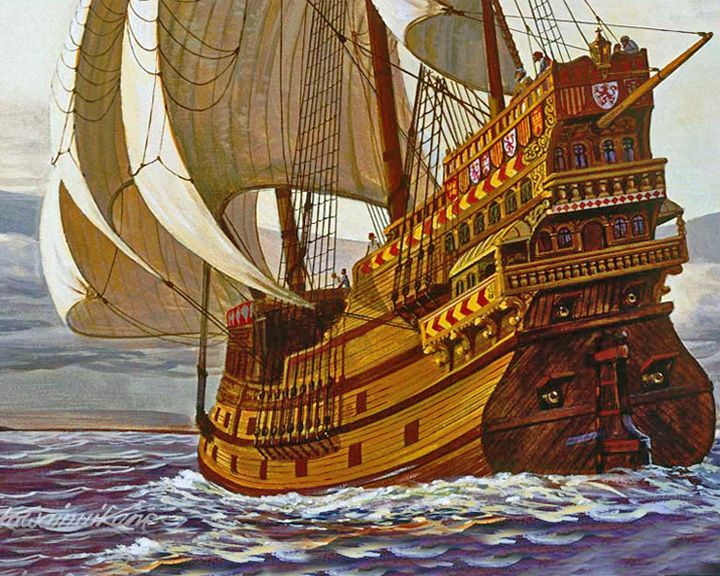 (Another (Another Ark Royal, HMS — English galleon English flagship that fought against the Spanish Armada. During the reign of James VI and I, she was renamed Anne Royal. Several British aircraft carriers have been named Ark Royal. LAUNCHED: 1587 → FATE: Accidentally sunk in April of 1636; raised and broken up in 1638. |
 Artemis — American sloop The ship on which Claire and Jamie Fraser travel across the Atlantic in pursuit of the Bruja as seen in season 3 of the TV series Outlander. The ship was never in the water. Green screen was used to fill in ocean background. LAUNCHED: 2017, for the TV series → FATE: inconclusive. |
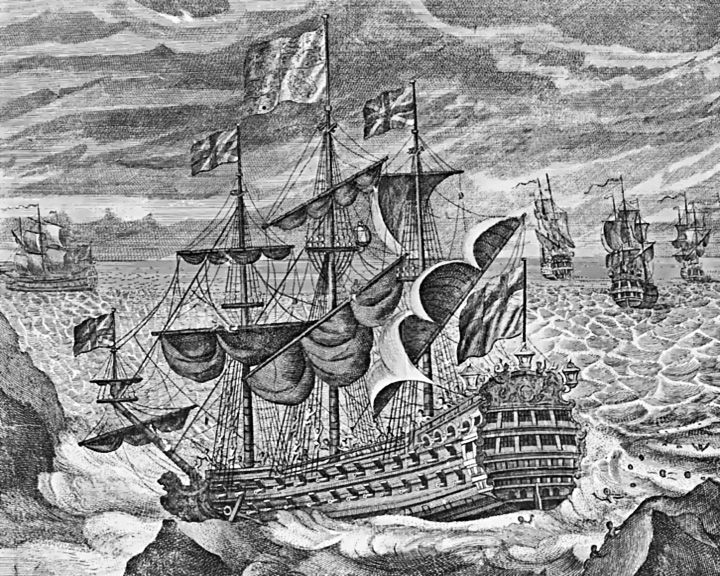 Association, HMS — British second-rate ship of the line After serving with distinction at the capture of Gibraltar, she ended up lost in a storm and wrecked with 3 other ships with the loss of nearly 2,000 lives. The rediscovery of the Association and so many historical artefacts led to legislation such as the Protection of Wrecks Act to preserve British historic wreck sites. LAUNCHED: 1697 → FATE: Wrecked of the Isles of Scilly October 22, 1707. |


|
Page 2
|
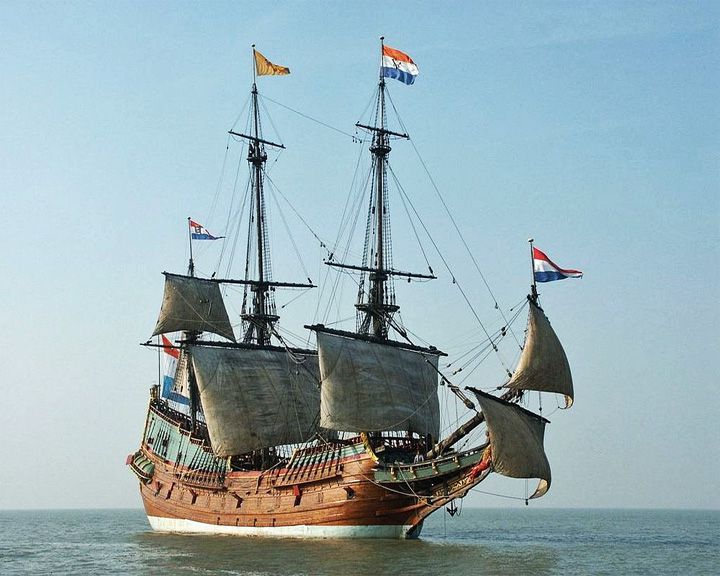 Batavia — Dutch galeon The original ship was made famous by the mutiny and massacre of over 125 crew and passengers. The replica was built with traditional materials using the tools and methods as in the original Batavia's construction. LAUNCHED: 1628, original ship; replica completed 1995 → FATE: Wrecked on Houtman Abrolhos in June 1629; replica is on exhibit at Lelystad, Netherlands. |
 Beagle, HMS — English sloop, or brig-sloop, two-masted She carried Charles Darwin on his historic expedition beginning in 1831. Robert FitzRoy was captain during the historic round-the-world trip. In 1845 the Beagle was refitted as a static coast guard watch vessel. LAUNCHED: 1820, May 18 → FATE: Sold for scrap in 1870. |
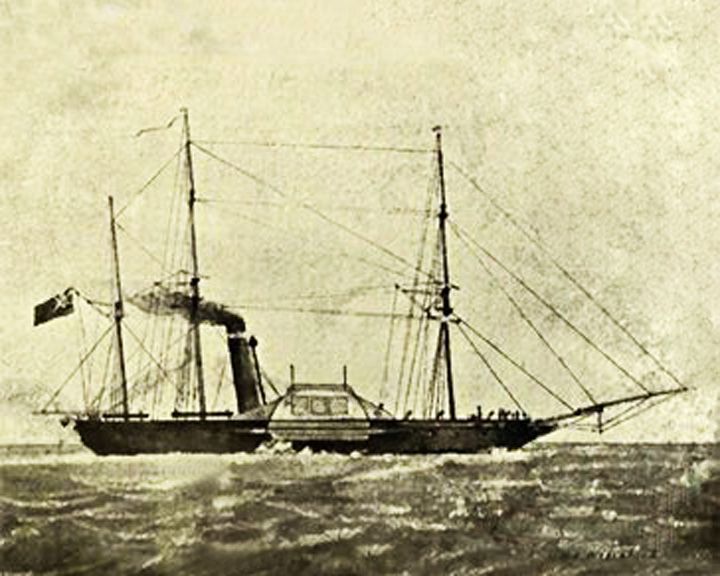 (Another (Another Birkenhead, HMS — British frigate, steamer The protocol "women and children first" originated on this sinking ship. Only 193 of the 643 people on board survived. Over the years, numerous attempts have been made to salvage the gold thought on board. LAUNCHED: 1845, December 18 → FATE: Struck a hidden reef and sank February 26, 1852. |
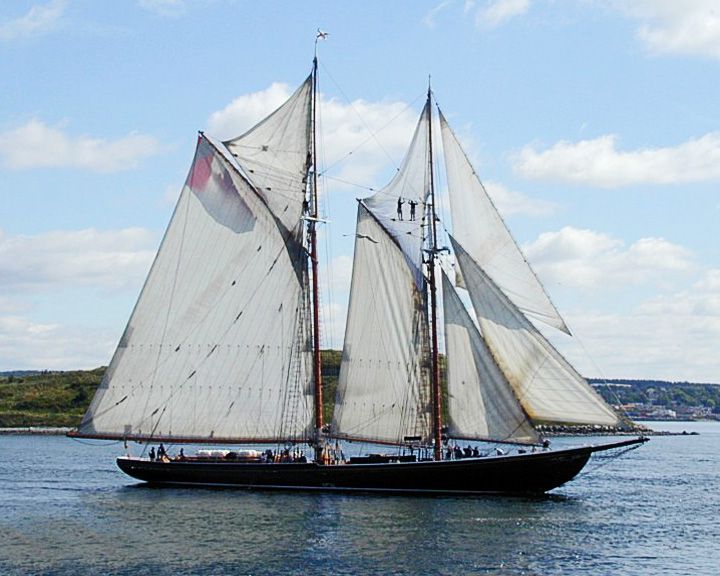 (Another (Another Bluenose — Canadian schooner, fishing and racing Featured on the Canadian dime and once on a Canadian 50 cent postage stamp (see "Another IMAGE") and appears on some Nova Scotia licence plates. During its racing career Bluenose was never beaten and held the International Fisherman's Trophy for 18 consecutive years. LAUNCHED: 1921, March 18 → FATE: Struck a coral reef and abandoned off Haiti on January 28, 1946. |
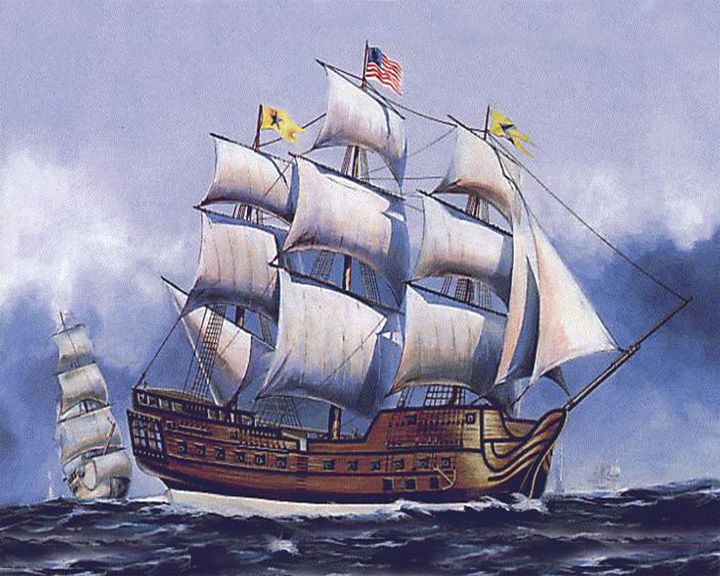 Bonhomme Richard, USS — American frigate Warship commanded by John Paul Jones. She defeated HMS Serapis in the Battle of Flamborough Head. LAUNCHED: 1766 → FATE: Sank in battle off the coast of Yorkshire September 25, 1779. |
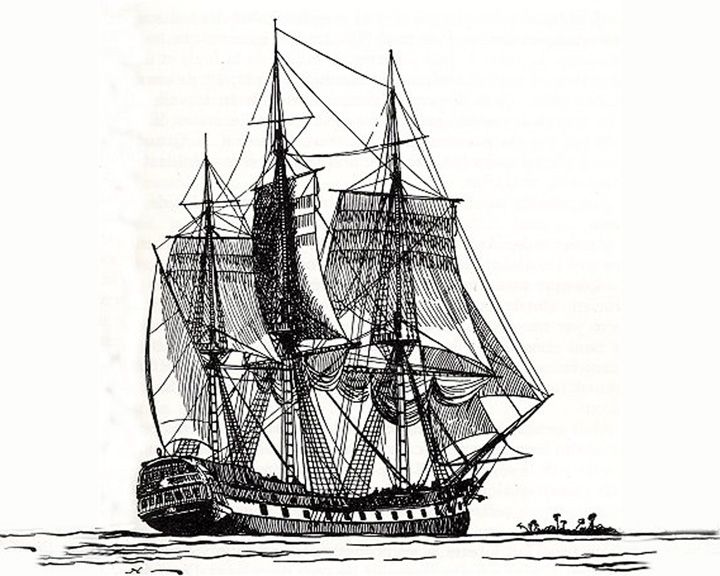 (Another (Another Boudeuse — French frigate First woman to circumnavigate the globe on board, Jeanne Baret, disguised as man. She is also famous as the exploration ship of Louis Antoine de Bougainville, 1766-1769. ("Another IMAGE" is the commemorative stamp issued.) LAUNCHED: 1766, March 18 → FATE: Broken up for firewood at Malta in early 1800. |
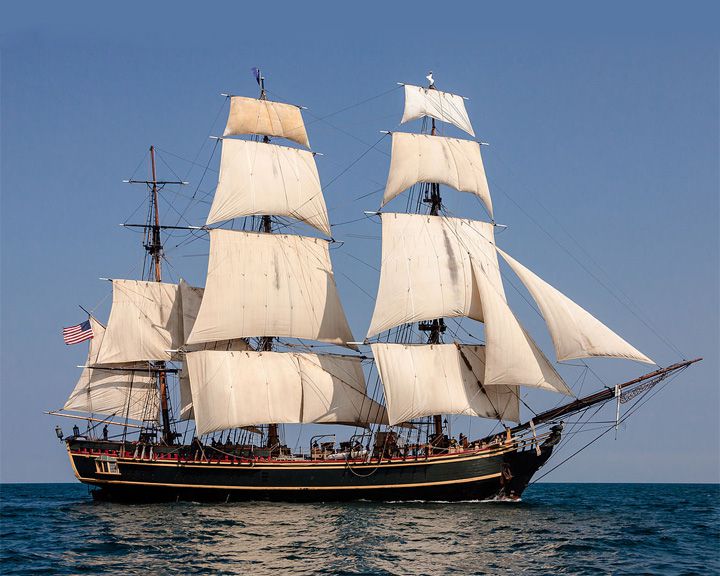 (Another (Another Bounty (replica) — Canadian collier, three-mast (American owned) A reconstruction of the original 1787 Royal Navy ship built for the 1962 movie Mutiny on the Bounty. She also appeared in the 1989 movie Treasure Island and the 2006 and 2007 movies Pirates of the Caribbean. Over the years, she was also used for promotion, entertainment, and education. LAUNCHED: 1960, August 18 → FATE: Sank near North Carolina during Hurricane Sandy on October 29, 2012. |
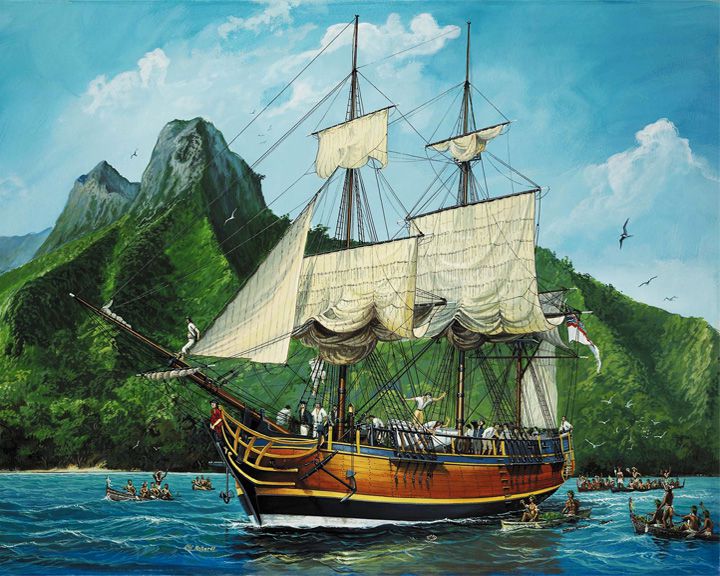 Bounty, HMS — English collier, three-mast Mutiny aboard ship, April 28, 1789, led by Fletcher Christian against Captain William Bligh. Its mission was to pick up breadfruit plants from Tahiti and transport them to the West Indies. The mutiny was dramatized in several books and movies. LAUNCHED: 1784 → FATE: Was burned by the mutineers on January 23, 1790. |
|
Page 3
|
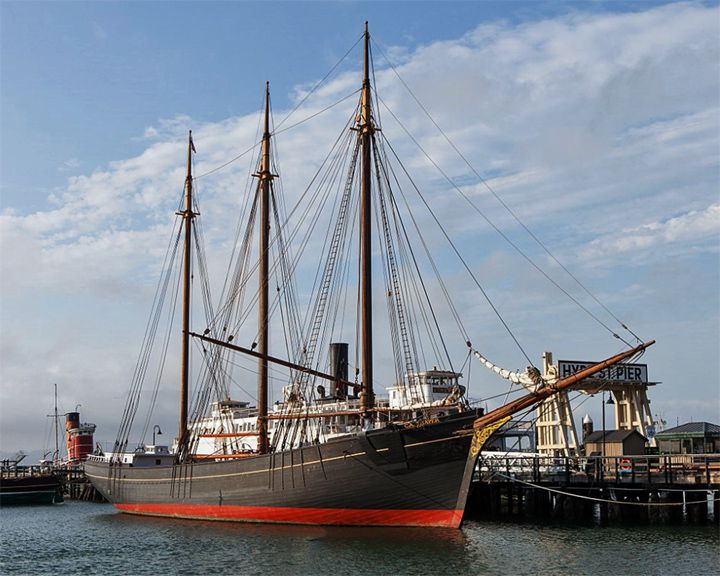 C.A. Thayer — American three-masted schooner Last survivor of the schooners in the West Coast lumber trade. In 1912, she was converted for use in the Alaskan salt-salmon trade. In 1984, she was designated a National Historic Landmark. LAUNCHED: 1895 → FATE: She made her final voyage in 1950. After several restorations, she now is on exhibit at Hyde Stree Pier, San Francisco. |
 Carroll A. Deering — American five-masted commercial schooner A famous maritime mystery after she was found with her crew of 11 missing. Theories of her demise include piracy, mutiny, hurricane, and paranormal events. Nine other ships also disappeared without a trace in that same area at about the same time. LAUNCHED: 1919 → FATE: Found wrecked off Cape Hatteras on January 31, 1921; scuttled on March 4 that year. |
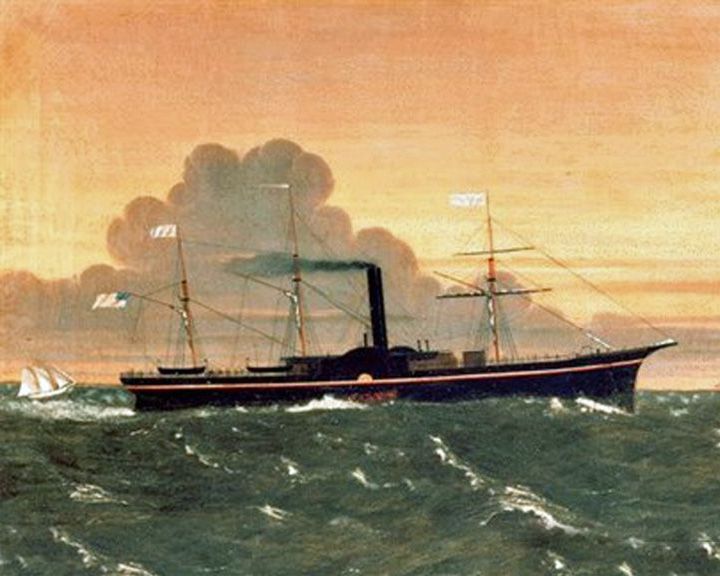 (Another (Another Central America, SS — American paddle steamboat, stern-wheeler; three-masted Sank in a hurricane in 1857, along with 400 passengers and crew and 30,000 pounds of gold. She operated between Central America and the eastern coast of the United States during the 1850s. LAUNCHED: 1852, October 18 → FATE: Sank on September 12, 1857 about 160 miles east of Cape Hattera. |
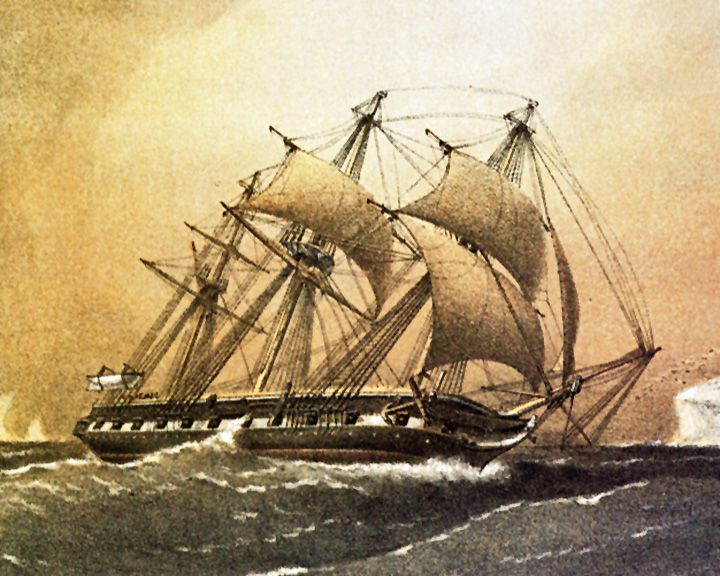 (Another (Another Challenger, HMS — British corvette; steam-assisted Undertook the first global marine research expedition. She was the flagship of the Australia Station between 1866 and 1870. LAUNCHED: 1858, February 18 → FATE: Broken up for her copper end in England in January, 1921. |
 Champion of the Seas — English clipper ship On her maiden voyage, she set a record for the fastest run in 24 hours of 465 nautical miles or 861 km. She was the passenger ship built for the run from Liverpool, England to Melbourne, Australia. LAUNCHED: 1854, April 18 → FATE: Abandoned off Cape Horn in leaking condition in 1877. |
 (Another (Another Charles W. Morgan — American whaling ship World's oldest surviving merchant vessel; America's only surviving wooden whaleship. After a 5-year, multi-million dollar restoration, she set sail again, July, 2013. LAUNCHED: 1841 → FATE: On exhibit at the Mystic Seaport museum in Mystic, Connecticut. |
 (Another (Another Christina O — Greek luxury yacht Famous yacht of Ari Onassis and his wife, former first lady, Jackie Kennedy. Originally a Canadian built anti-submarine River-class frigate, after WWII, she was purchased by Onassis, refitted as one the largest yachts in the world, and hosted many famous personalities. LAUNCHED: 1943, July 18 → FATE: Available for charter cruises from many ports. |
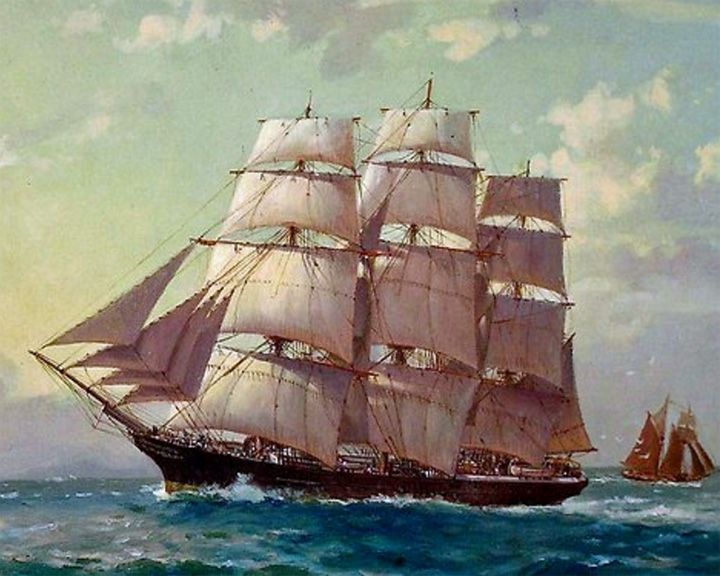 City of Adelaide — English clipper ship The world's oldest surviving clipper ship. From 1864 to 1887, she played an important part in the immigration of Australia. She is now part of the National Historic Ships of the United Kingdom. LAUNCHED: 1864, May 18 → FATE: Out of service since 1948, current being restored. |
|
Page 4
|
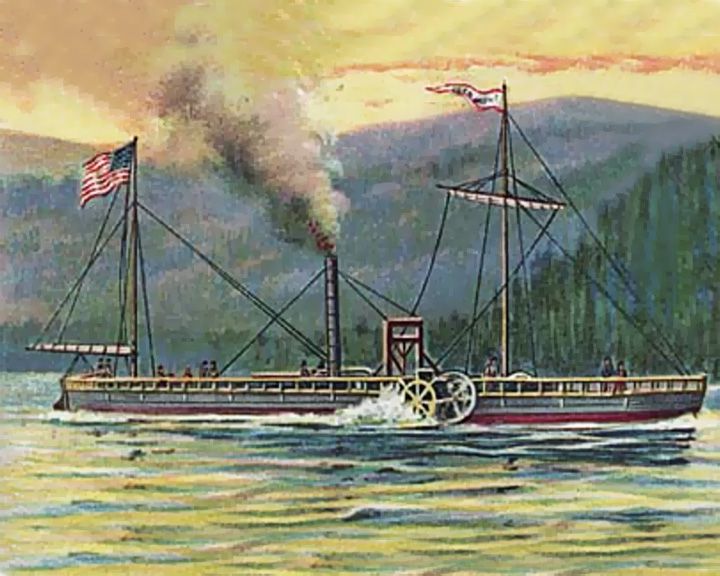 Clermont — American river steamboat First enduring and financially successful steamboat, running on the Hudson River. She was never known as Clermont at the time, but North River Steamboat. After it was lengthened and refitted in 1808 at Clermont, NY, it was named the North River. LAUNCHED: 1807, August 18 → FATE: Retired in 1814, then scrapped. |
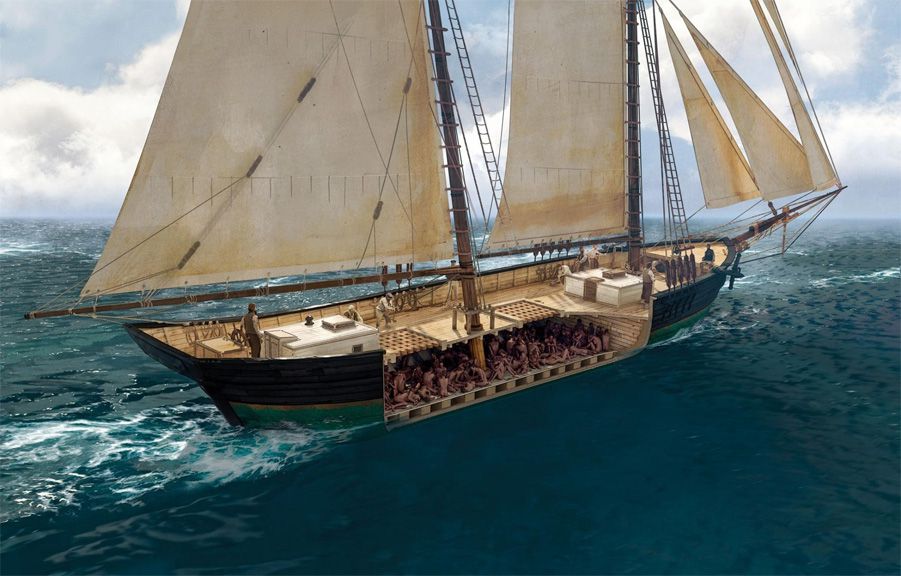 Clotilda — American two-masted schooner Last known slave ship to bring captives from Africa to the United States. The shipwreck was discovered in early 2019. LAUNCHED: 1855 → FATE: Burned and sunk in the Mobile-Tensaw River Delta probably in 1860. |
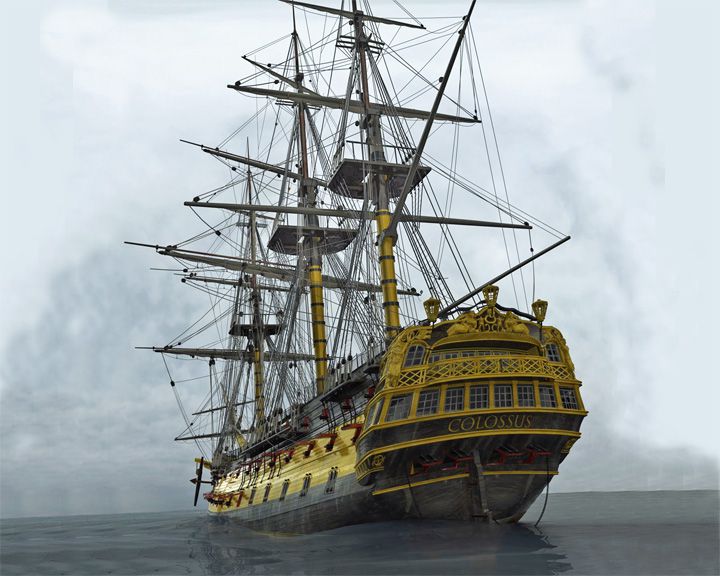 Colossus, HMS — British third-rate ship of the line After many battles and much glory, she lost her way and ran aground and sunk with one fatality. In 1974, fragments from the Colossus were discovered and reconstructed and are now displayed at the British Museum in London. LAUNCHED: 1787, April → FATE: Wrecked of the Isles of Scilly December 10, 1798. |
 Columbia Rediviva — American full-rigged 3 masted sailing ship First American ship to circumnavigate the globe. In 1792, Captain Robert Gray in command, she was the first ship to enter the Columbia River in the Pacific Northwest. LAUNCHED: 1787 → FATE: Salvaged in 1806. |
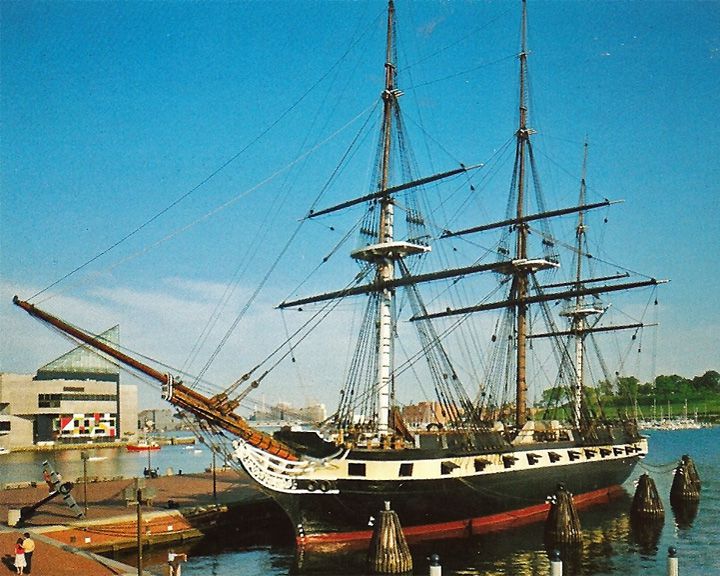 Constellation, USS — American sloop-of-war The last sail-only warship designed and built by the U.S. Navy. This flagship of the USN African Squadron from 1859-1861 disrupted the African slave trade off the coast of Africa. LAUNCHED: 1854, August 18 → FATE: On display at Annapolis, Maryland as a museum ship. |
 Constitution, USS — American three-masted heavy frigate Oldest commissioned ship afloat in the world. She was larger and more heavily armed than the standard frigates of the period. LAUNCHED: 1797, October 18 → FATE: On display at the Boston Navy Yard as a museum ship. |
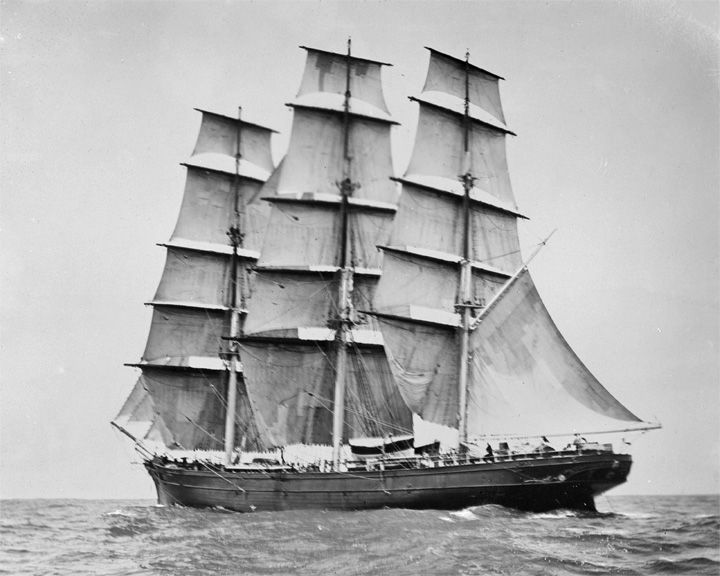 (Another (Another Cutty Sark — English clipper ship Lost China-to-London race to ship called Thermopylae. She is one of three remaining original composite construction (wooden hull on an iron frame) clipper ships from the nineteenth century. LAUNCHED: 1869, November 18 → FATE: Now preserved in dry dock in Greenwich, England. |
 Discovery — British three-masted barque The ship that carried Scott and Shackleton on their first successful journey to the Antarctic. She was locked in the ice of the Antarctic for two years. The ship was eventually freed in February, 1904 by the use of controlled explosives. LAUNCHED: 1901, March 18 → FATE: Museum ship in Dundee, Scotland. |
|
Page 5
|
 Driver, HMS — British side-wheeler paddle sloop First steamship to circumnavigation the globe. She was the first steamship to visit New Zealand, arriving January 1846, and was involved in the New Zealand Wars. LAUNCHED: 1840, December 18 → FATE: Wrecked on Mayaguana Island on August 3,1861. |
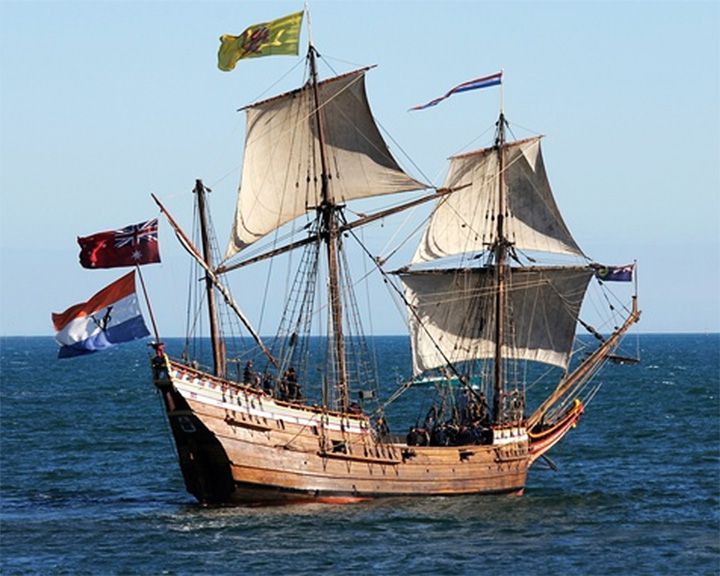 Duyfken — Dutch barque First authenticated European discovery of Australia, 1606. Prior to finding Australia, she explored much of South Pacific including the "Spice Islands" as part of the Dutch East Inda Company fleet. Her replica was built in Australia. LAUNCHED: 1595, original ship; replica launched January 24, 1999 → FATE: Condemned and dismantled in July 1608; replica on display at Elizabeth Quay in Perth, Austrailia. |
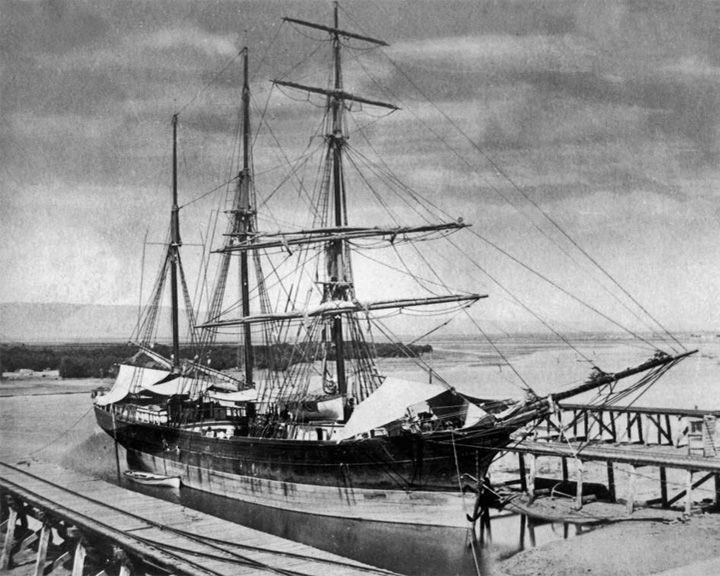 Empress of China — American three-masted, square-rigged sailing ship First American ship to sail from the newly independent United States to China, opening what is known today as the Old China Trade. She left New York harbor on Washington's birthday, February 22, 1784 and returned to New York after a round voyage of fourteen months and twenty-four days. LAUNCHED: 1783 → FATE: Unknown. |
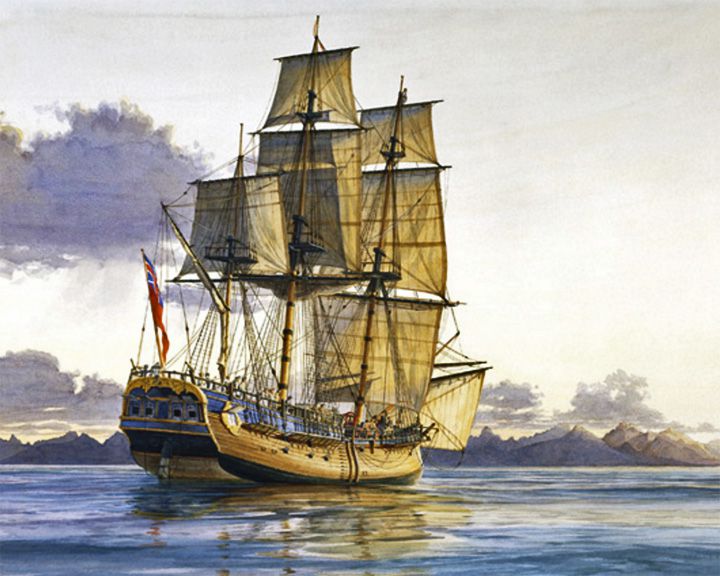 (Another (Another Endeavour, HMS — British collier, three-masted; refitted in 1768 for the expedition James Cook's ship during his voyage to explore the Pacific Ocean and Terra Australis Incognita. She became the first ship to reach the east coast of Australia at Botany Bay in April 1770, and went on to circumnavigate the world. LAUNCHED: 1764, June → FATE: Later renamed Lord Sandwich. Scuttled in a blockade of Narragansett Bay, Rhode Island, in 1778. |
 (Another (Another Endurance — Norwegian barquentine, three-masted Used by Sir Ernest Shackleton for the 1914 Imperial Trans-Antarctic Expedition. Her original purpose was as an luxurious ice-capable steam yacht designed for polar conditions. She was one of the strongest wooden ship ever built. LAUNCHED: 1912, December 18 → FATE: Crushed by pack ice in the Weddell Sea in 1915. |
 Eos — American three-masted Bermuda rigged schooner, built in Germany The largest sailing yacht in the world with an overall length of 305 feet or 92.92 meters. With much of its length in the bowsprit, the length at the waterline is less than the Maltese Falcon. LAUNCHED: 2006 → FATE: Still in service. |
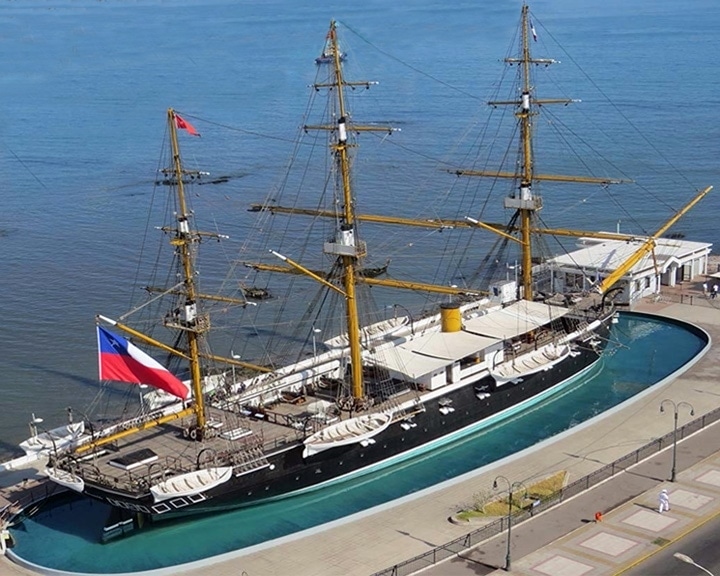 (Another (Another Esmeralda — Chilean wooden hull steam corvette Engaged the Peruvian ironclad Huáscar in the Battle of Iquique despite the material superiority of the Peruvian ship. A replica of Esmeralda is a museum ship in Iquique, Chile. LAUNCHED: 1855, June 26 → FATE: Rammed and sunk on 21 May 1879 at the Battle of Iquique during the War of the Pacific. |
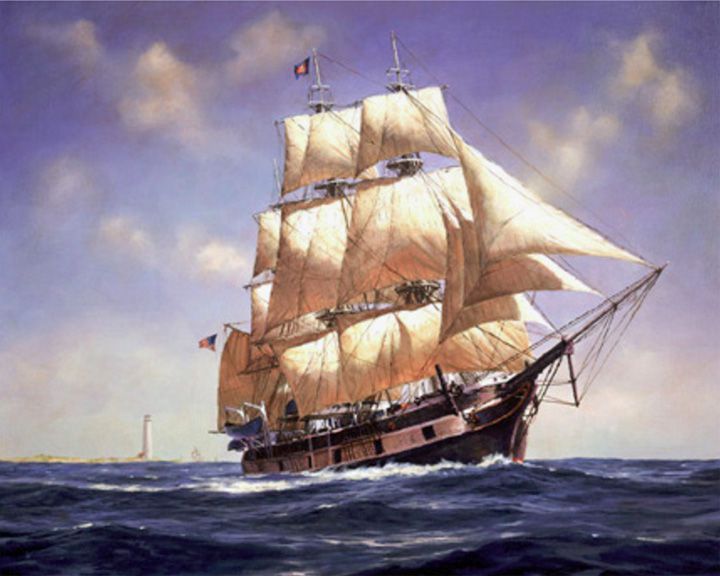 Essex — American barque; whale ship, a three-masted Basis of Nathaniel Philbrick's book In the Heart of the Sea and the movie as well as the inspiration for Herman Melville's 1851 classic novel Moby-Dick. She left Nantucket in 1819 on a whaling voyage in the South Pacific with 21 aboard. It was attacked and sunk by a sperm whale in the Pacific Ocean. Only two men survived. LAUNCHED: 1800, approx. → FATE: Sunk in the southern Pacific November 20, 1820. |
|
Page 6
|
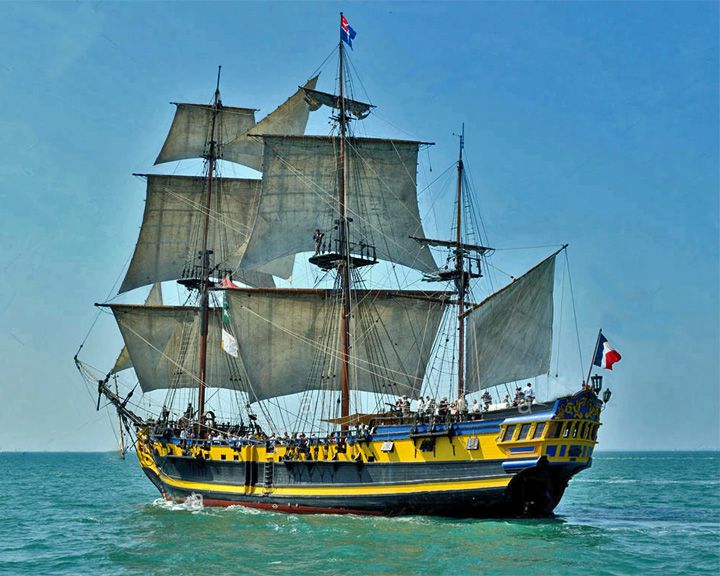 Etoile du Roy — British frigate, sixth-rate Stand-in for several different ships for the British TV series Horatio Hornblower, 1998-2003. The three-masted frigate was built specifically to represent a generic Nelson-age warship, with her design inspired by HMS Blandford built in 1741. LAUNCHED: 1997, September → FATE: Sold to a French company and now on exhibit at Saint-Malo, Brittany. |
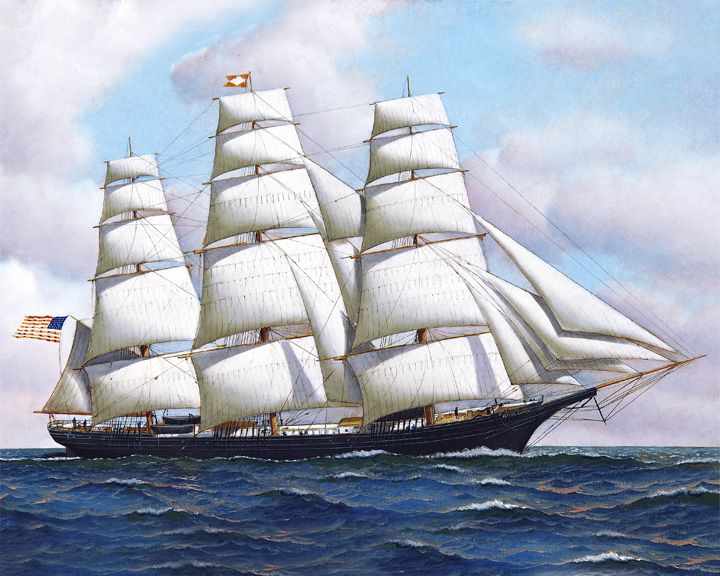 Flying Cloud — American clipper ship The most famous clipper ship, she set a world record (until 1989) for the fastest passage from New York to San Francisco in 89 days, more than 16,000 miles. The ship's navigator was a woman, Eleanor Creesy wife of Josiah Perkins Creesy who skippered Flying Cloud. LAUNCHED: 1851 → FATE: Went aground at Saint John, New Brunswick June 19, 1874. |
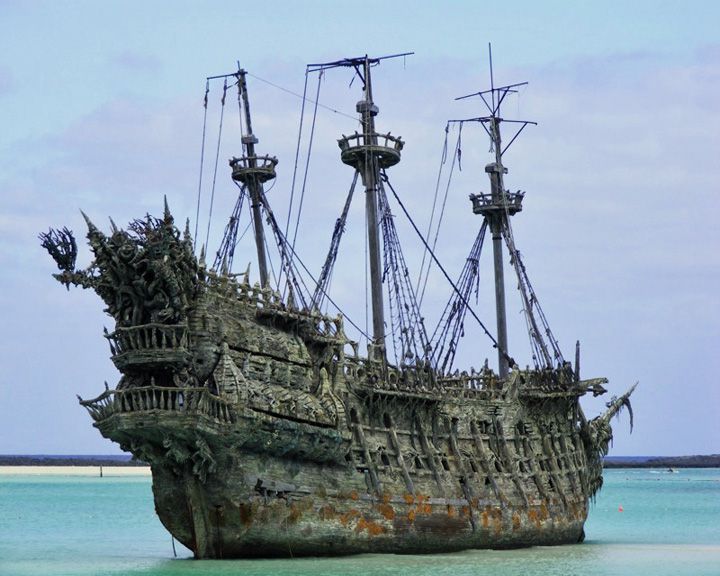 Flying Dutchman — Dutch sailing ship of unknown sort A legendary ghost ship that is doomed to sail the seas forever. She is much cited in movies, TV, books and other amusements. LAUNCHED: 1790, first reference → FATE: Casting about forever. |
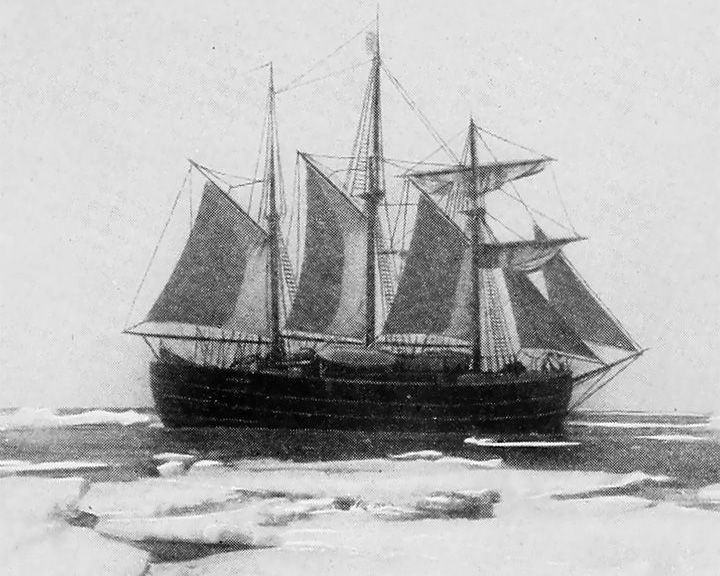 Fram — Norwegian schooner Used in expeditions in the Arctic and Antarctic regions by the Norwegian explorers. Most likely she was the strongest ship ever built, having sailed farthest north and south than any other wooden ship. LAUNCHED: 1892 → FATE: Currently on display at the Fram Museum, Oslo, Norway. |
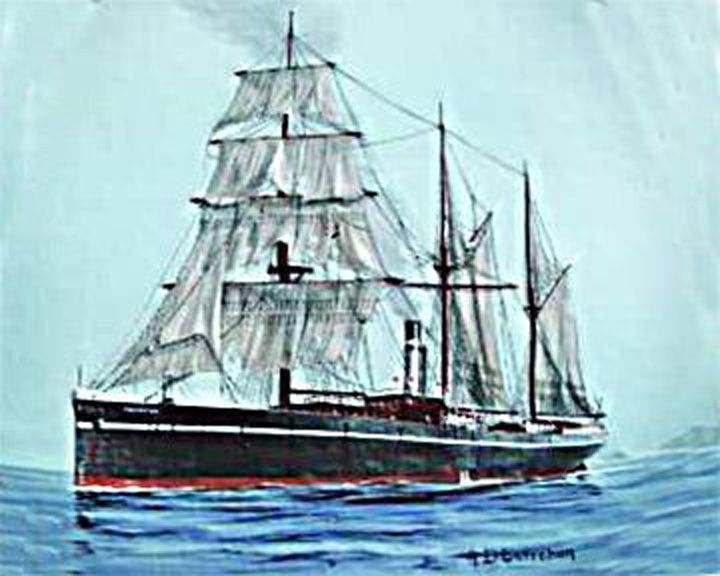 (Another (Another Frigorifique — French steamship First to carry frozen meat across the ocean; from Argentina to France. The first commercially successful shipment of frozen meat that launched the industry was by the steamship Dunedin from New Zealand to England in 1882. LAUNCHED: 1876 → FATE: Sank after a collision with British coal freighter Rumney along the coast of France in March of 1884. |
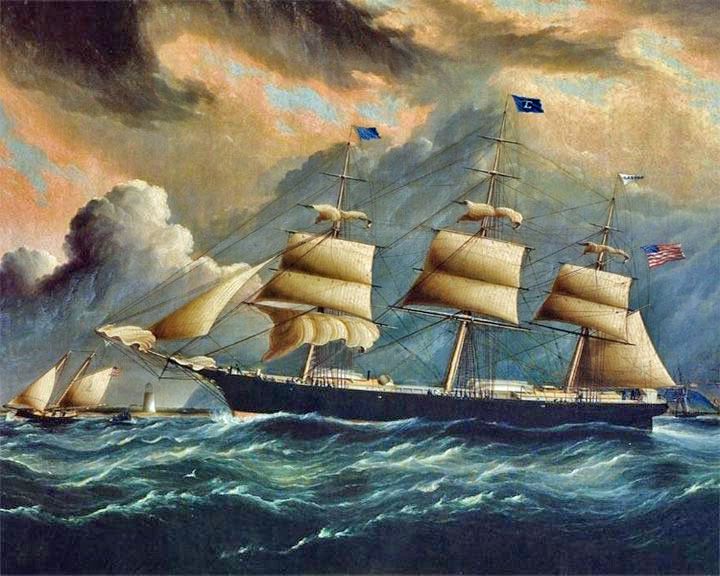 (Another (Another Gaspée — English single-masted sloop-of-war, used as a fast revenue cutter Subject of the "Gaspée Affair," the torching of the ship by a group of American colonialists, leading up to the American Revolution. The city of Warwick, RI commemorates the Gaspée Affair with a festival and parade, including burning the Gaspée in effigy. LAUNCHED: 1764, January → FATE: Looted and burned in Narragansett Bay June 9, 1772. |
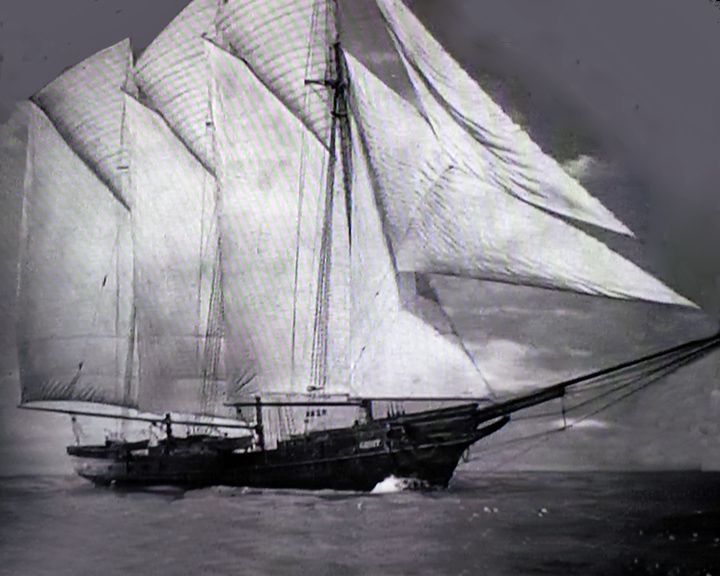 Ghost — American schooner; a seal-hunting ship The setting for the 1941 movie The Sea Wolf, starring Edward G. Robinson and Ida Lupino. The story is based on the novel The Sea Wolf by Jack London. LAUNCHED: 1941 → FATE: Inconclusive. |
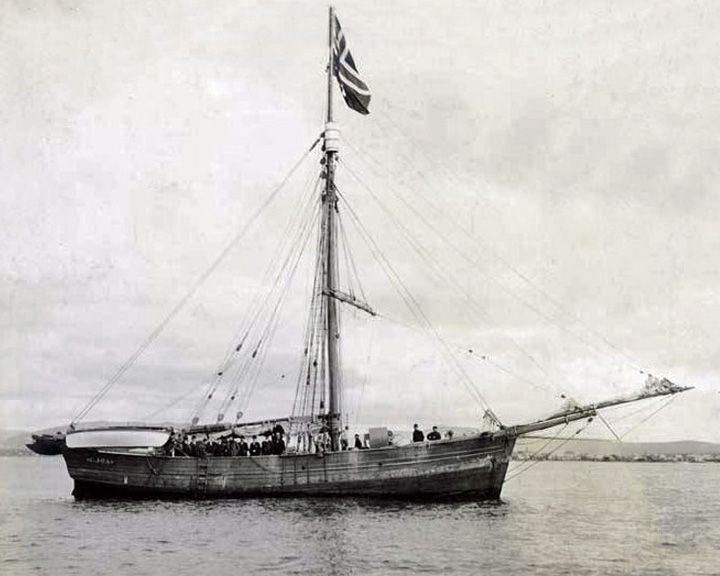 Gjøa — Norwegian sloop, square sterned The first vessel to transit the Northwest Passage. She reached San Francisco in 1906 where she was put on display, but slowly deteriorated until 1949 when she was refurbished. Then in 1972 she was returned to Norway. LAUNCHED: 1872 → FATE: On display at the Fram Museum in Bygdøy, Norway. |
|
Page 7
|
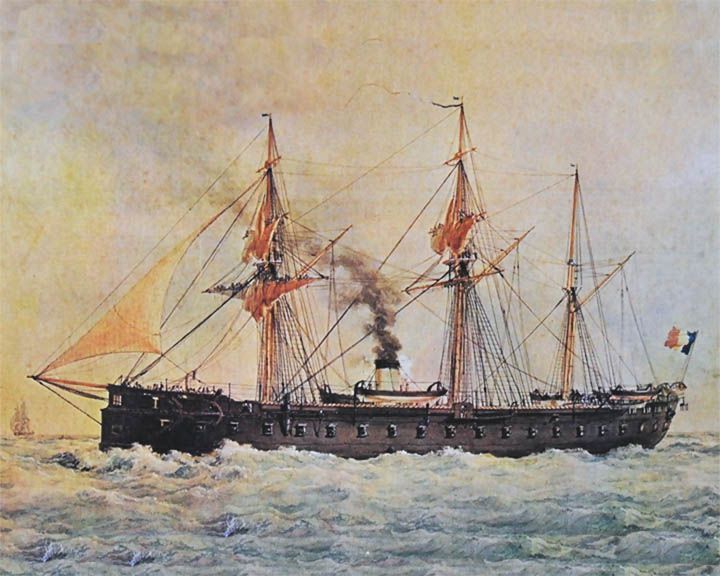 Gloire — French ocean-going ironclad First ocean-going ironclad, developed in response to navel gun technology, including the Paixhans gun, thus rendering obsolete traditional unarmoured wooden ships-of-the-line. She was constructed with light barquentine sails as well as a steam-powered screw. LAUNCHED: 1859, November 18 → FATE: Scrapped in 1883. |
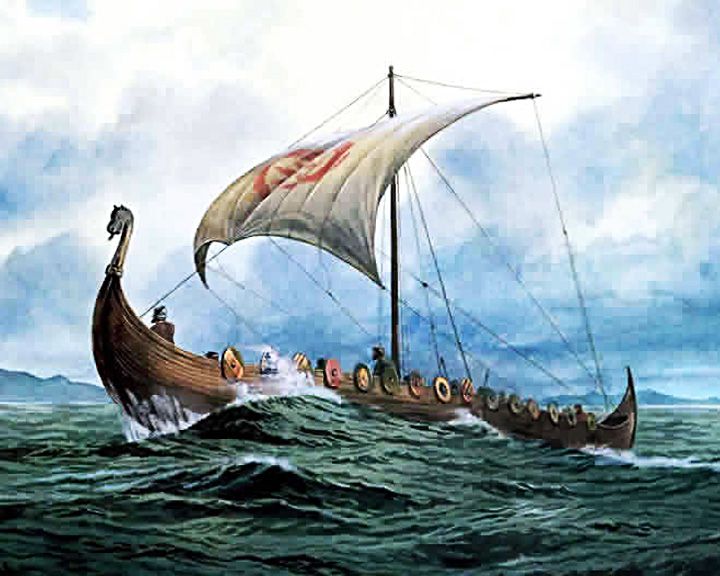 (Another (Another Gokstad — Viking clinker-built ship Viking ship found in a burial mound at Gokstad farm in Sandefjord, Norway in 1880. Later she was used for the burial of an important chieftain who died about 900 A.D. (A replica is on display at the Hjemkomst Center museum in Moorhead, MN.) LAUNCHED: 890, circa → FATE: On display at the Viking Ship Museum in Oslo, Norway. |
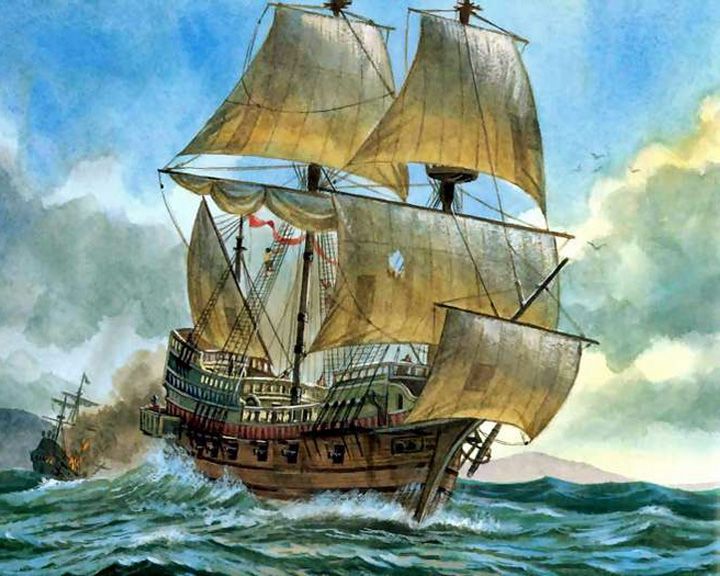 Golden Hind — English galleon Second ship to circumnavigation of the globe between 1577 and 1580, captained by Sir Francis Drake. Several replicas were built, the latest the Golden Hinde lauched in 1973. LAUNCHED: 1576, probably → FATE: In dry dock at Deptford, England as a museum piece, rotted away after decades around 1650. |
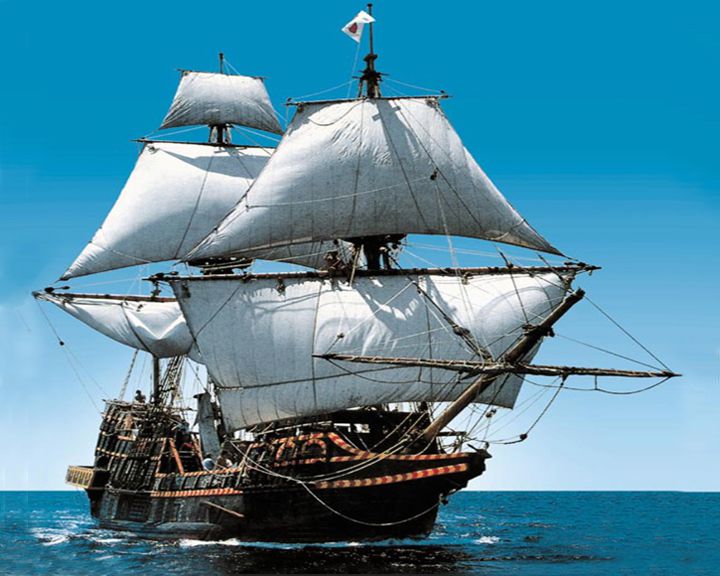 Golden Hinde — English galleon A full-size replica of the 1577 Golden Hind and appeared in several movies. She has travelled a distance equal to more than five times around the globe. Like Francis Drake's ship, she has circumnavigated the globe. LAUNCHED: 1973 → FATE: Since 1996 she has been berthed at St Mary Overie Dock, Southwark, London. |
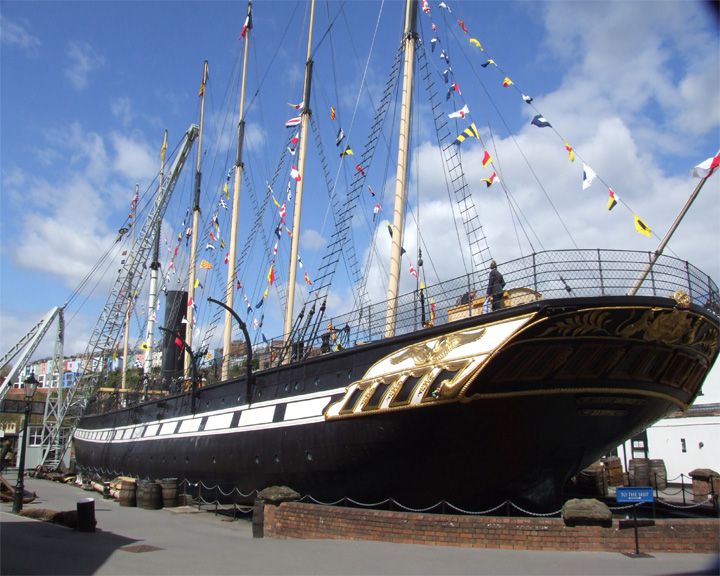 (Another (Another Great Britain, SS — British steamship, passenger ship First steamer to cross the Atlantic. Also first built of iron and with a screw propeller. She ran aground in 1846 and was sold for salvage, repaired and revised. In 1881 she was converted to sail. In 1937 she was retired and scuttled. In 1970 she was recovered and eventually restored as a museum ship. LAUNCHED: 1845, July 18 → FATE: Now a museum ship in Bristol Harbour. |
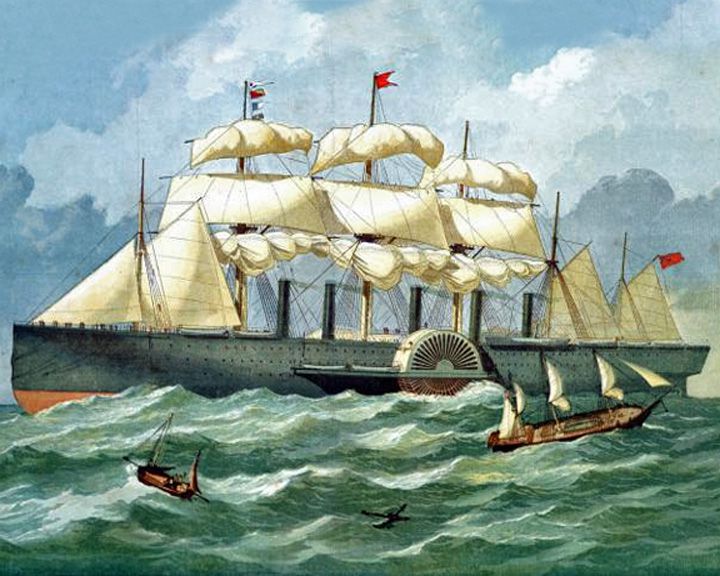 (Another (Another Great Eastern, SS — British iron paddle steamboat, side-wheeler with sails The world's largest steamship; successfully laid cable across the Atlantic Ocean. She completed 45 crossings in eight years; then she was used for carrying mail, then troops. LAUNCHED: 1858, January 18 → FATE: Broken up for scrap at Rock Ferry on the River Mersey in 1889. |
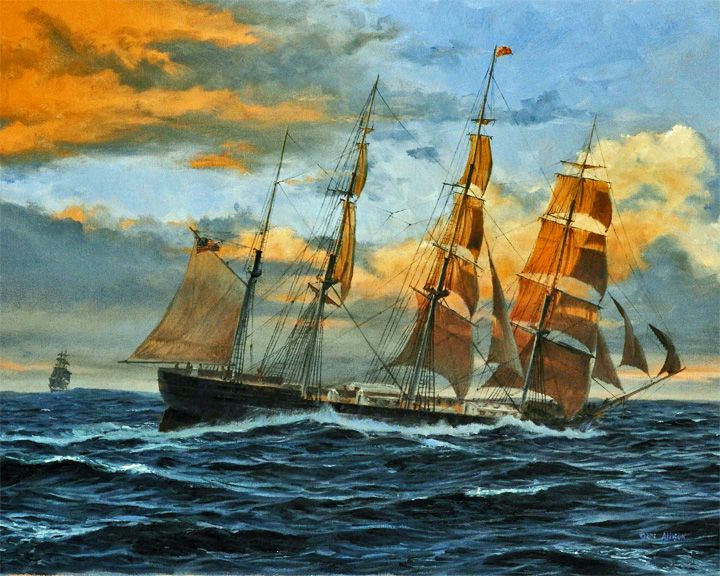 Great Republic — American clipper, four-masted The largest wooden clipper ship ever constructed, requiring 1,500,000 feet of pine, 336½ tons of iron, and 56 tons of copper. In 1853, fire sank her; but she was salvaged and rebuilt as a three deck vessel and went on to set transatlantic speed records. LAUNCHED: 1853, October 18 → FATE: Abandoned during a hurricane off Bermuda March 5, 1872. |
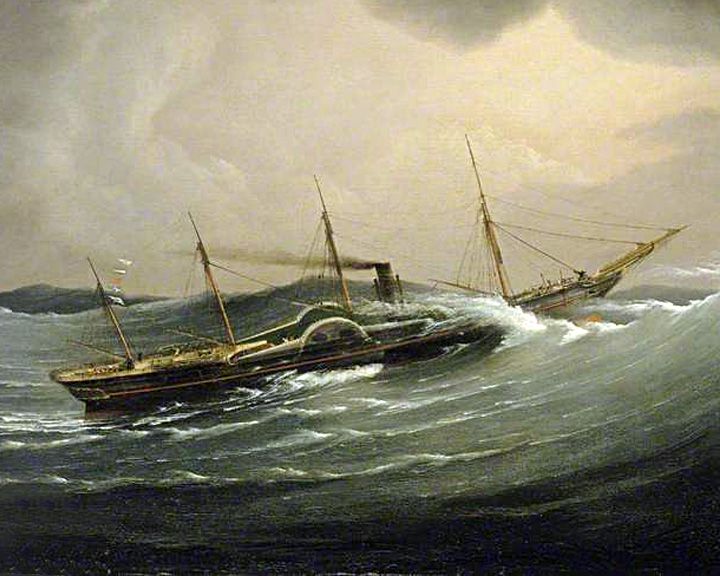 Great Western, SS — British paddle steamboat, side-wheeler First paddle ship built for crossing the Atlantic; completed the crossing in April of 1838. In later years, she was used as a showboat, a floating palace/concert hall and gymnasium. LAUNCHED: 1837, July 18 → FATE: Taken out of service December of 1846, she was broken up in 1856. |
|
Page 8
|
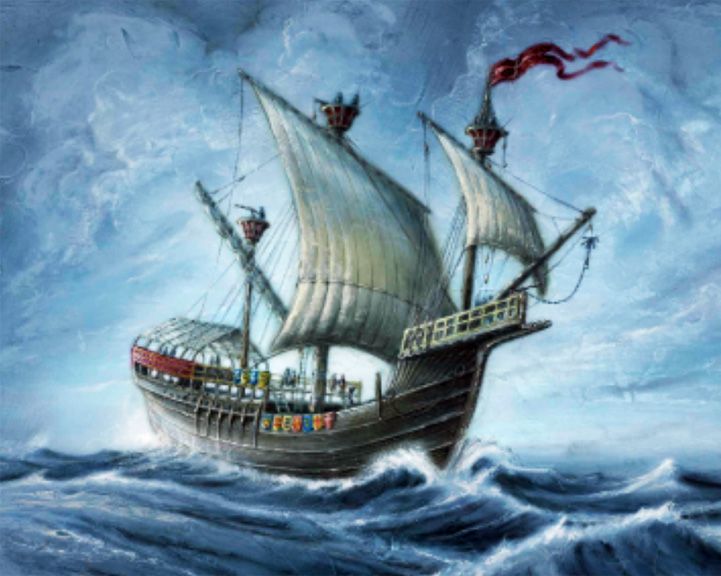 Gribshunden — Danish warship, one of the first carvel-built vessels and among the earliest armed with guns. She was the flagship of the King of Denmark, Hans, on her way to a political summit with the Swedish leader when she sank, killing a number of those aboard and the summit. In 2015, the wreckage attracted international attention when a near perfectly-preserved wooden figurehead of a mythical beast was brought to the surface. LAUNCHED: 1485 → FATE: In 1495, she sank after an accidental fire while in the Baltic Sea off the coast of Ronneby in southeastern Sweden. |
 Half Moon — Dutch flyboat, square-rigged, three-masted, wooden Henry Hudson's ship looking for Northwest Passage. Englishman Henry Hudson was in the service of the Dutch East India Company. LAUNCHED: 1609, March → FATE: In 1618 the ship was destroyed during an English attack on Jakarta. |
 Hannah, USS — American schooner The first armed American naval vessel of the American Revolution and is claimed to be the founding vessel of the US Navy. The city of Beverly, Massachusetts and the town of Marblehead, Massachusetts each claim to have been the home port of the schooner. LAUNCHED: 1775, September 2 → FATE: Unknown. |
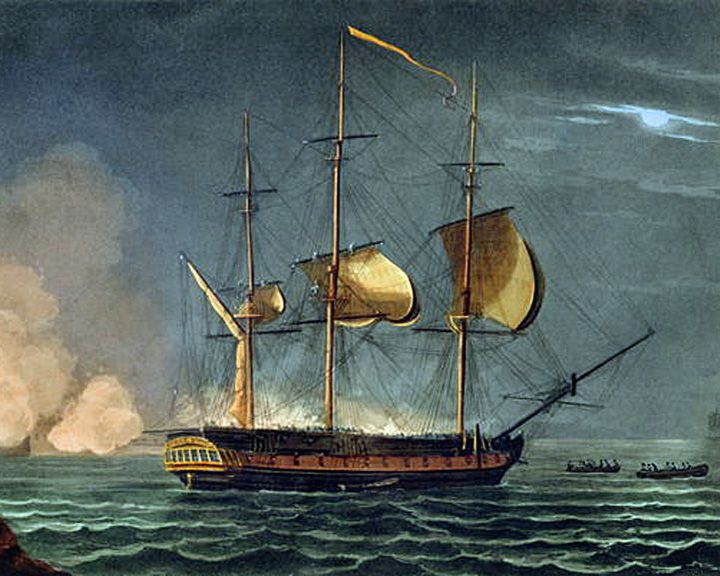 Hermione, HMS — British frigate, fifth-rate Notorious for having the bloodiest mutiny in British naval history. Mutineers gave her to the Spaniards in 1797 who put her in service as Santa Cecilia. She was retaken by the British in 1799 and renamed the Retaliation. LAUNCHED: 1782, September → FATE: Broken up at Deptford in June 1805. |
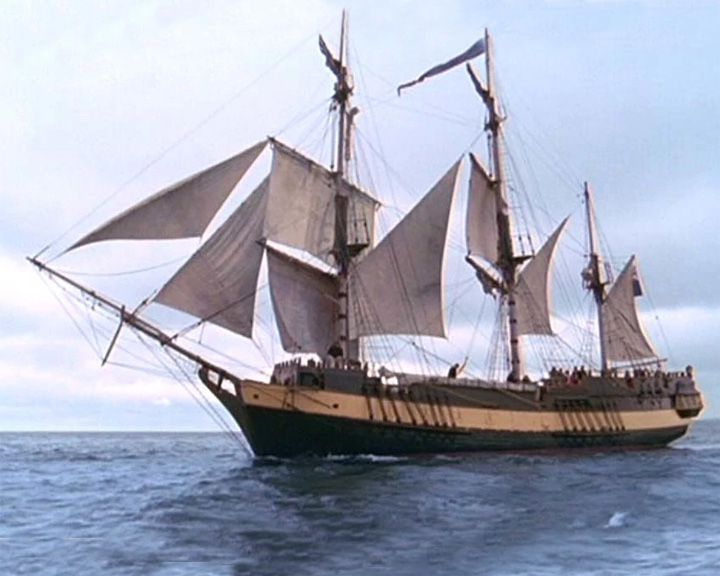 Hotspur, HMS — British sloop-of-war Ship of Horatio Hornblower in the book series and British TV series Hornblower and the Hotspur by C. S. Forester. In the TV series, she is captured by the French. After Hornblower and the crew later discover the ship, they succeed in retaking it. LAUNCHED: 1962, for the book; 1988 2003 for the TV series → FATE: Unknown. |
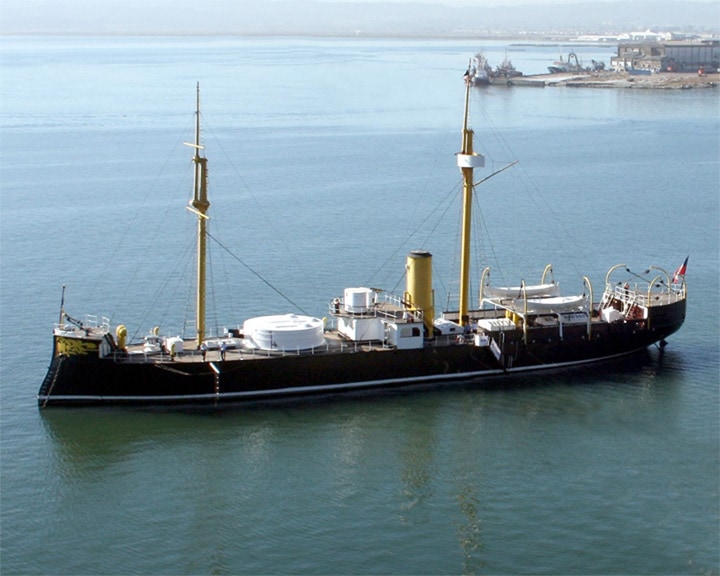 (Another (Another Huáscar — Peruvian iron-clad turret ship The flagship of the Peruvian Navy and participated in the Battle of Pacocha and the War of the Pacific of 1879–1883. She is the second oldest armored warship afloat and the oldest monitor afloat LAUNCHED: 1865, October 6 → FATE: She was restored and is a memorial ship anchored in Talcahuano, Chile. |
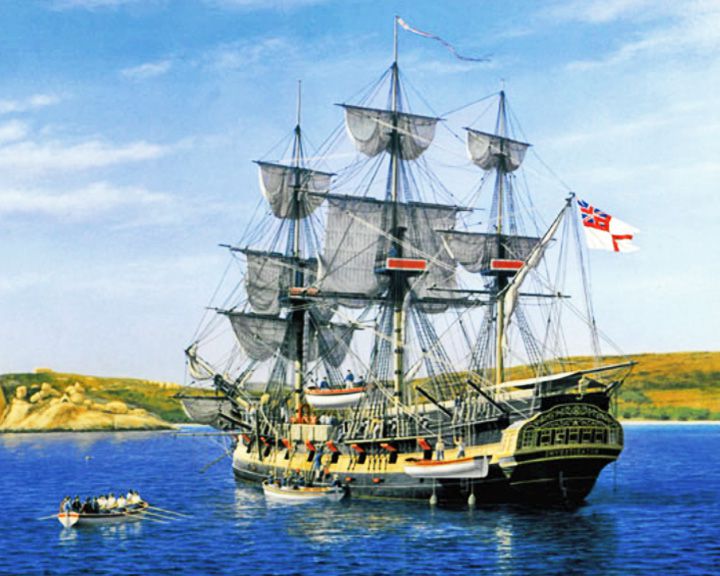 Investigator, HMS — British collier, then in 1801 converted to a survey ship. The first ship to circumnavigate Australia. The Royal Navy sold her in 1810 and she returned to mercantile service under the name Xenophon. LAUNCHED: 1795 → FATE: Broken up about 1872. |
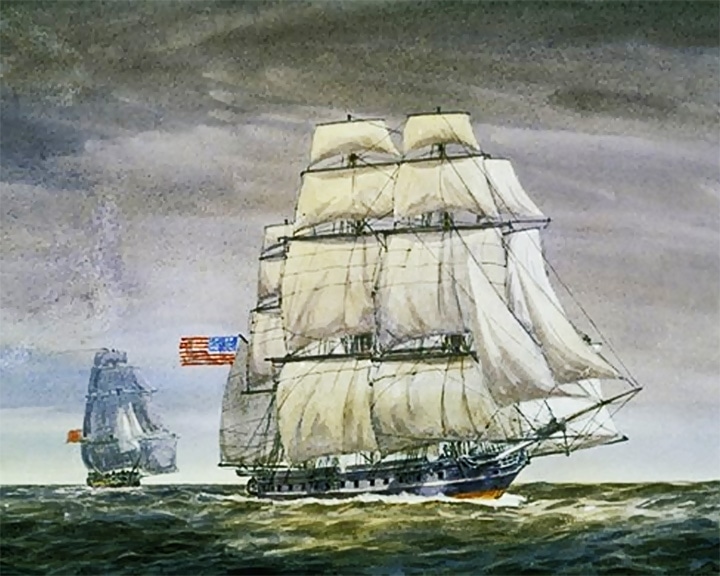 John Adams, USS — American frigate She participated in the raid on Combahee Ferry that Harriet Tubman, the former slave and Union operative, organized with Union colonel Montgomery. She fought in the Quasi-War, the First and Second Barbary Wars, the War of 1812, the Mexican–American War and the American Civil War. LAUNCHED: 1799, October → FATE: Sold October 1867 to the British to use as the Hong Kong Water Police Headquarters. In February 1884, she caught fire and was lost. |
|
Page 9
|
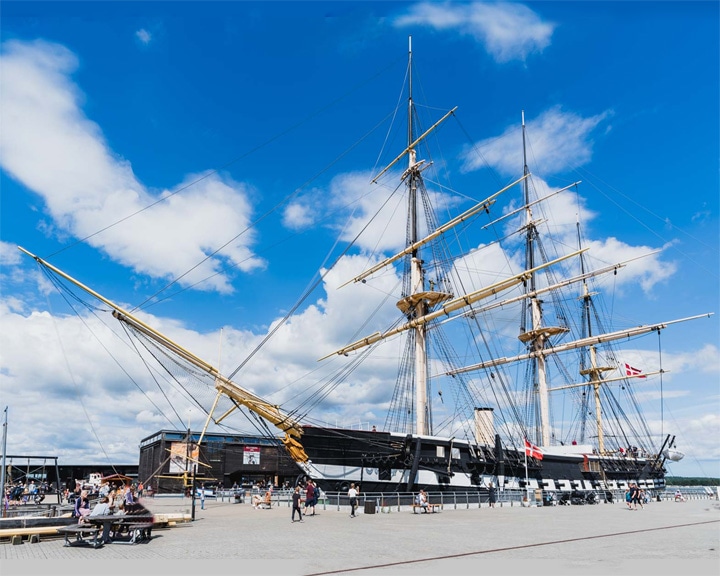 Jylland, HDMS — Danish screw-propelled steam frigate The world's largest wooden warship still in existence. She took part in the Battle of Heligoland May 9, 1864 LAUNCHED: 1860, November 20 → FATE: She is preserved as a museum ship in the small town of Eblet, Denmark. |
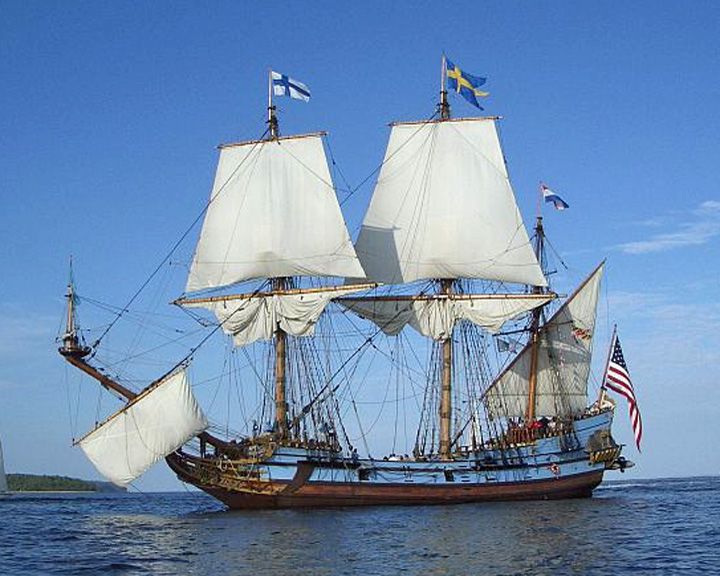 (Another (Another Kalmar Nyckel — Swedish full-rigged pinnace The ship is famed for carrying Swedish settlers to North America in 1638 to establish the colony of New Sweden. A replica (as seen in "Another IMAGE) was launched in 1997. The Kalmar Nyckel made four successful round trips from Sweden to North America, a record unchallenged by any other colonial vessel. LAUNCHED: 1625 → FATE: The original ship was sunk in the North Sea by the Dutch in a war against the English in July of 1652. Replica is in service as a tourist attraction at Wilmington, Delware. |
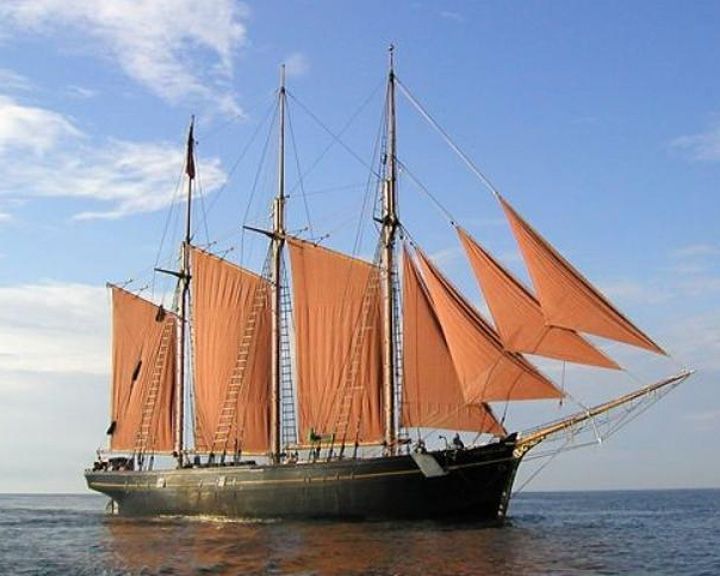 Kathleen and May — British three masted schooner Last remaining British built wooden hull three-masted top sail schooner. Originally equipped with the first known fitting of Appledore roller reefing. After years of service, during restoration in 2000, 70% of the original planking was stripped from the frames, enabling most of her internal timbers to later be refitted. LAUNCHED: 1900, April → FATE: Restored and based in Bideford on the River Torridge. |
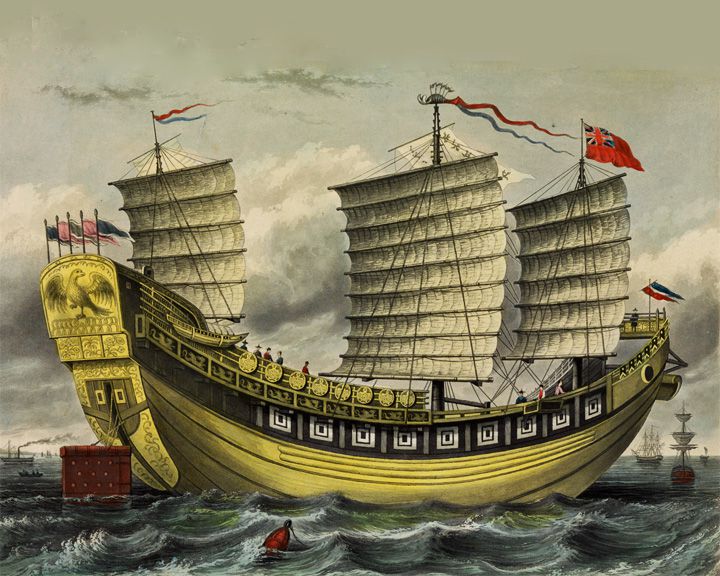 Keying, Junk — Chinese junk, three-masted (trading ship) The first ship from China to visit New York where it was visited by 4,000 tourists a day paying 25 cents to board the ship and meet its crew. She was manned by 30 Chinese and 12 Englishmen, and commanded by the British Captain Charles Alfred Kellett during her travel. LAUNCHED: 1846, circa → FATE: Neglected and rotted in England in 1855. |
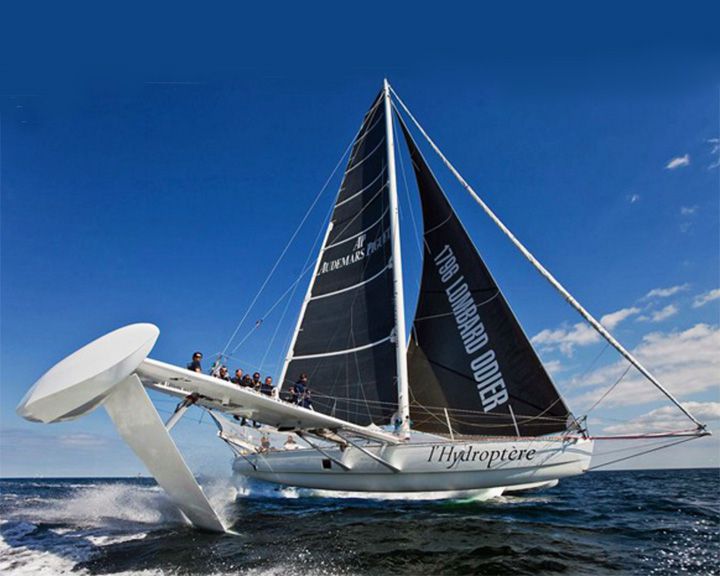 L'Hydroptère — French speed sailboat; experimental Currently the world's fastest sailboat. In 2008, it reached a sailing speed of 56.3 knots, the first sailboat to ever pass 100 km/h. LAUNCHED: 2008 → FATE: Still sailing. |
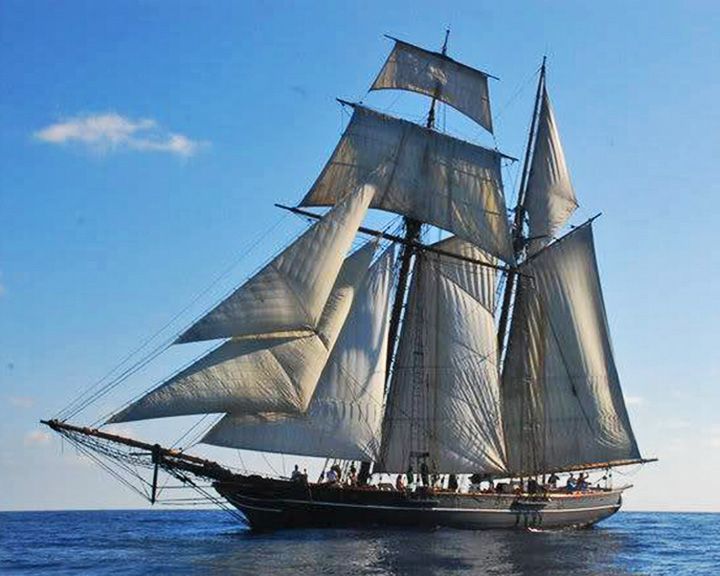 La Amistad — Spanish schooner, two-masted; built in U.S. In 1839, Africans being transported as slaves revolted against their captors aboard. She primarily engaged in short coastal trade with sugar-industry cargo. Her normal route ran from Havana to her home port of Guanaja. LAUNCHED: 1838, maybe → FATE: Renamed Ion, she was sold in Guadeloupe in 1844. No record after 1844. |
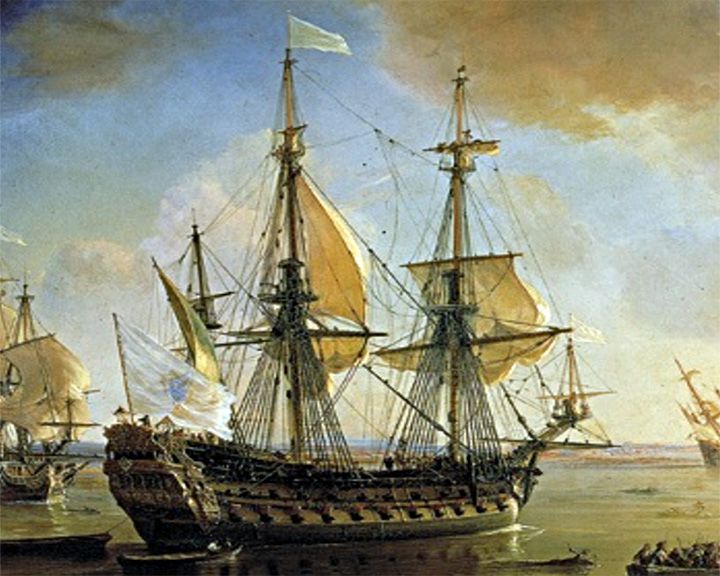 (Another (Another La Belle — French barque Explorer Robert De La Salle's flagship in the 1680s; its wreckage recovered in the late 1990s was an important maritime archaeological achievement. Discovered in 1995, the hull of the ship was recovered with over a million artifacts, many on display at the Bob Bullock Texas State History Museum in Austin, Texas. LAUNCHED: 1684, probably → FATE: Washed aground and wrecked in Matagorda Bay in the Gulf of Mexico in 1686. |
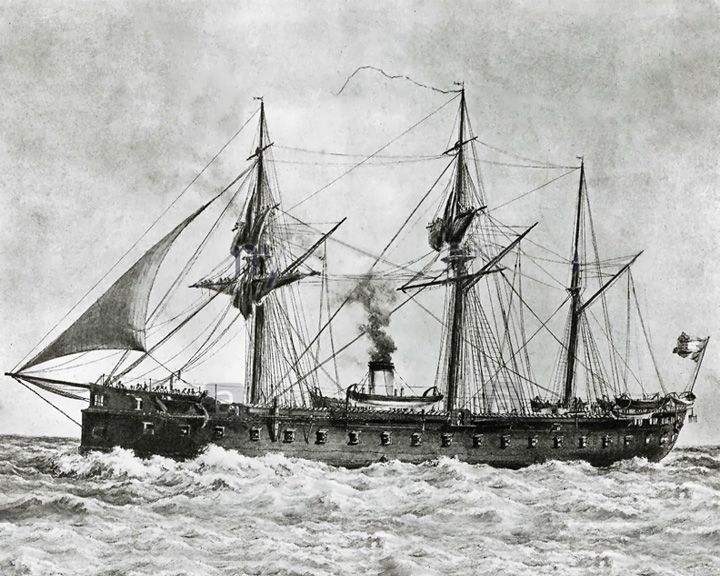 La Gloire — French battleship, steamer The first ocean-going ironclad battleship in history. The ship initiated the obsolescence of traditional unarmored wooden ships-of-the-line. LAUNCHED: 1859, November → FATE: Scrapped in 1883. |
|
Page 10
|
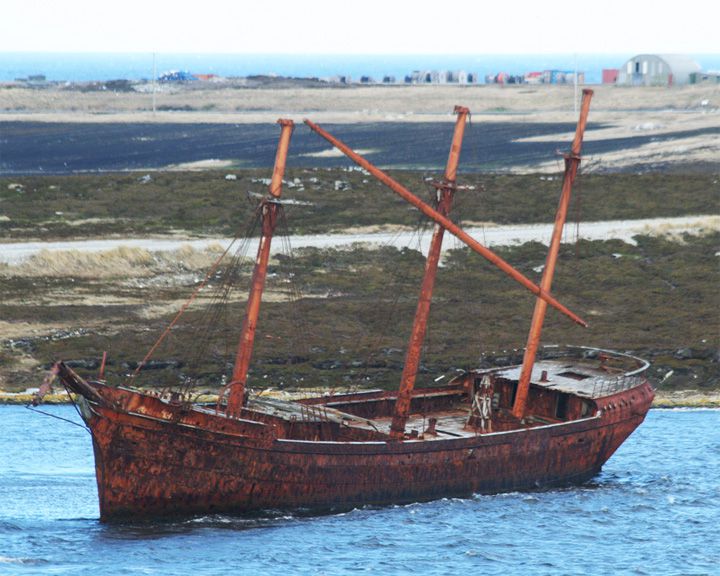 (Another (Another Lady Elizabeth — British 3-masted iron barque The hulk of the ship is the only semi-intact hulk left in the harbours of the Falkland Island. After being condemned in 1913, she served as a timber warehouse alongside the East Jetty. In February 1936 she broke her moorings in a storm and drifted to her present location. LAUNCHED: 1879, June 6 → FATE: Her remains now lie at the bottom of Whale Bone Cove harbour, Stanley, Falkland Islands. |
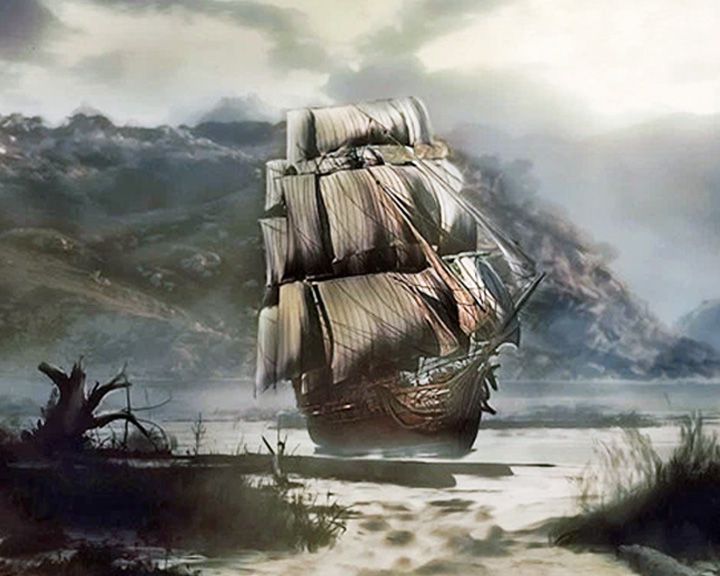 Lady Lovibond — English schooner A legendary ship said to reappear every fifty years as a ghost ship, yet no records of the ship or its sinking exist. The ship may have been a fabrication from a newspaper article in 1924, or based on phantom sightings between 1914 and 1924. LAUNCHED: 1798, February 12, first supposed sighting → FATE: Allegedly wrecked on the Goodwin Sands, off the coast of south-east England, on February 13, 1748, killing everyone aboard. |
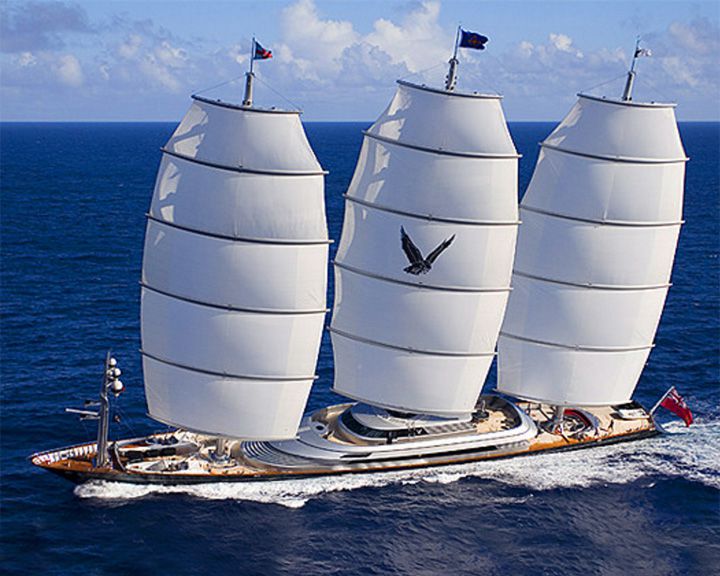 Maltese Falcon — American full-rigged luxury yacht; now owned by a Englishman The largest full-rigged luxury yacht in the world. She has 5 square sails on each of 3 masts that can be fully unfurled in 6 minutes. Some claim the Eos is larger. LAUNCHED: 2006 → FATE: Still in service. |
 (Another (Another Mars — Swedish three masted warship One of the largest warships at the time and the first ship to sink another ship with gunfire. The shipwreck was found by a team of divers north of the island Oland August 19, 2011. LAUNCHED: 1564 → FATE: Caught fire and exploded during the First Battle of Oland, May 31, 1564. |
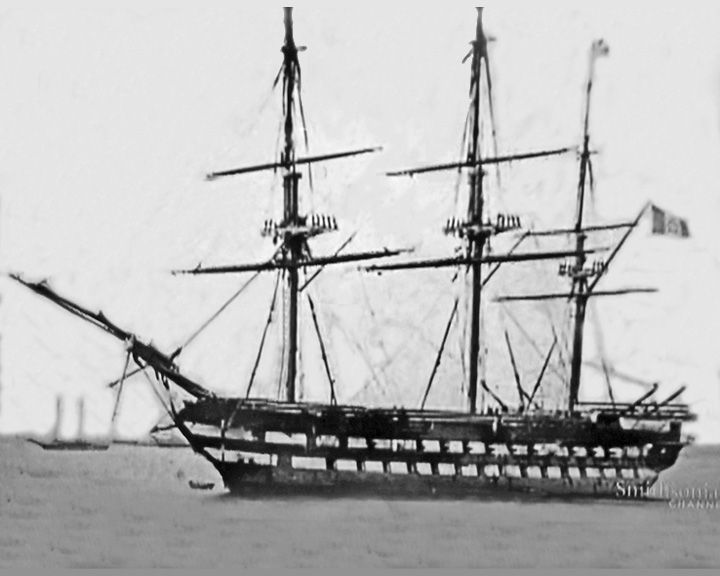 Mary Celeste — American brigantine The "ghost ship" found near the Strait of Gibraltar abandoned by its seven crew members in 1872. The popular mystery of the ship began with Arthur Conan Doyle's story in 1884, about a derelict ship which he called Marie Celeste. LAUNCHED: 1860 → FATE: Intentionally scuttled in January of 1885. |
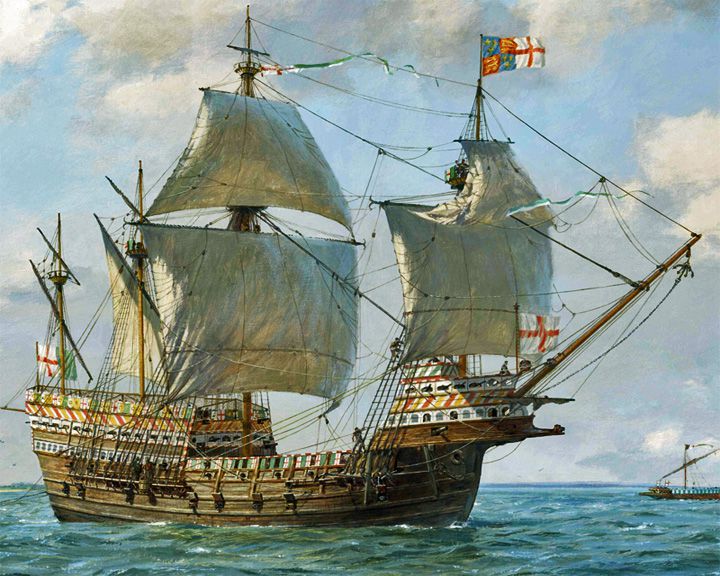 Mary Rose — English carrack-type warship One of the earliest ships built for war sporting the innovation of gun ports. The wreck of the Mary Rose was rediscovered in 1971 and salvaged in 1982. LAUNCHED: 1512 → FATE: Sank in the straits north of the Isle of Wight, 1545. |
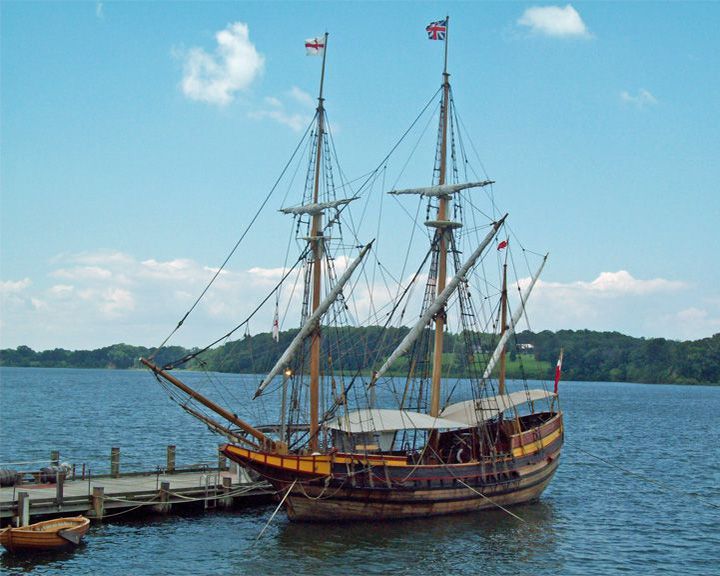 Maryland Dove — American merchant vessel Replica of the Dove, one of two early 17th-century English ship that, in 1634, brought the first settlers to what is now Maryland. The original Dove was the smaller of the two ship, used in shallow waterways along the coast. The accompanied ship with 140 passengers was the Ark. LAUNCHED: 1978, August 18 → FATE: On exhibit at Historic St. Mary's City and occasionally other ports. |
 Matthew — English caravel Sailed by John Cabot, first European to reach North America. Apparently, she was a small ship of fifty tons carrying twenty men and food for seven or eight months. LAUNCHED: 1496, or earlier; replica launched 1996 → FATE: Original ship, unknown; replica on display at M Shed Museum, Bristol, England. |
|
Page 11
|
 Mayflower — English galleon Transported the English Pilgrims from England to Plymouth, Massachusetts in 1620. The ocean crossing took 66 days. A second ship called the Mayflower made a voyage from London to Plymouth Colony in 1629. LAUNCHED: 1607, about → FATE: Sold and taken apart in May of 1624. |
 (Another (Another Medusa — French frigate Most famous sea disaster of the nineteenth century. After hitting a shoal, most of the 400 passengers were evacuated while 151 men took refuge on an improvised raft. After 13 days at sea, the raft was discovered with only 15 men still alive. The raft carrying people was the subject of a famous painting, The Raft of the Medusa by French artist Théodore Géricault. LAUNCHED: 1810 → FATE: Beached on Bank of Arguin in 1817. |
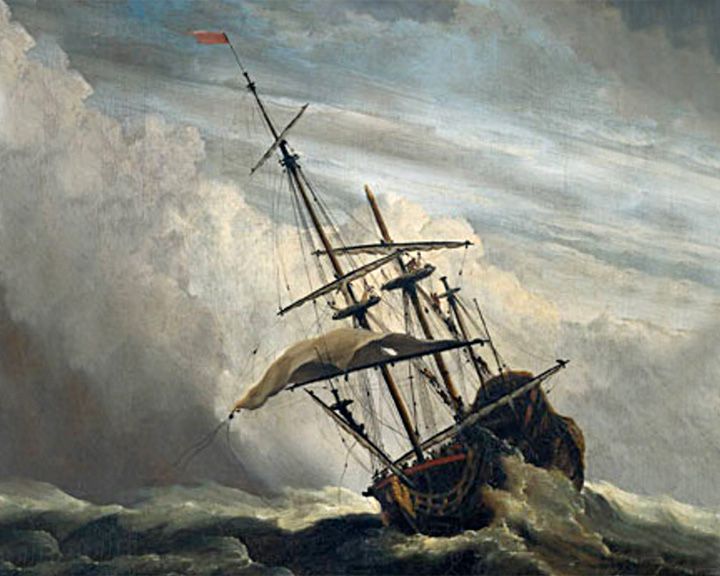 Merchant Royal — English merchant ship Lost at sea with 18 men off Land's End, Cornwall, England, the ship is one of the richest sunken treasures. Lost were more than half million Spanish silver pesos, 500 bars of gold and ingots of silver, and hundreds of pieces of jewelry. LAUNCHED: 1627 → FATE: Sank in bad weather September 23, 1641. |
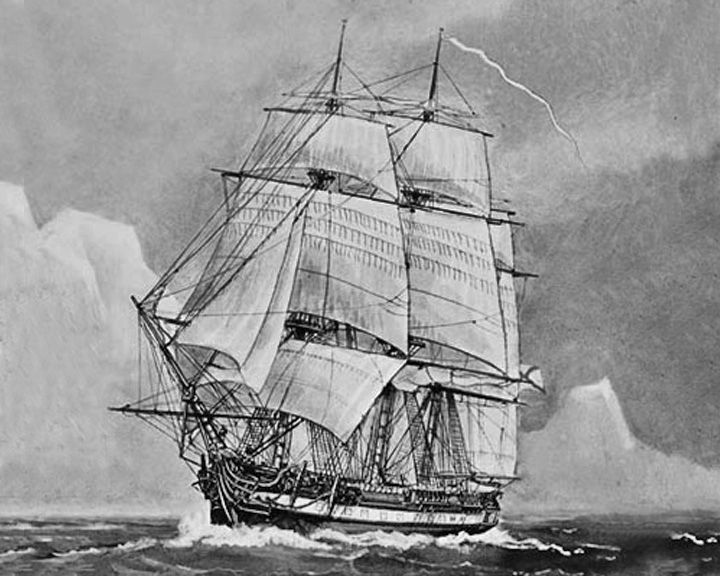 (Another (Another Mirny — Russian sloop-of-war First to discover the continent of Antarctica and circumnavigated it twice. A medal was issued by the Russian Admiralty to commemorate the expedition as seen in "Another IMAGE". LAUNCHED: 1819 → FATE: Unknown. |
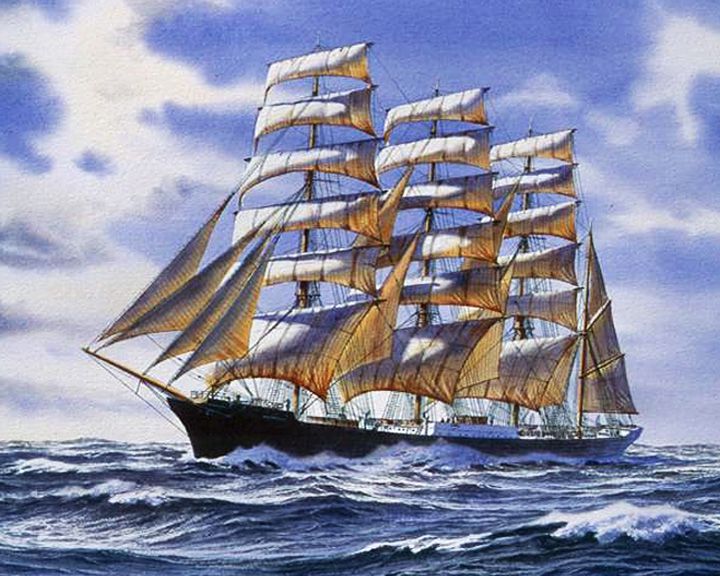 Moshulu — Scottish barque, four-masted Famous through the books of Eric Newby such as The Last Grain Race, 1956. Between 1904 and 1914, under German ownership, Kurt shipped coal, nitrate, coal, and coke around the world. She appeared in several movies. LAUNCHED: 1904, April 18 → FATE: Currently a floating restaurant docked in Penn's Landing, Philadelphia, Pennsylvania. |
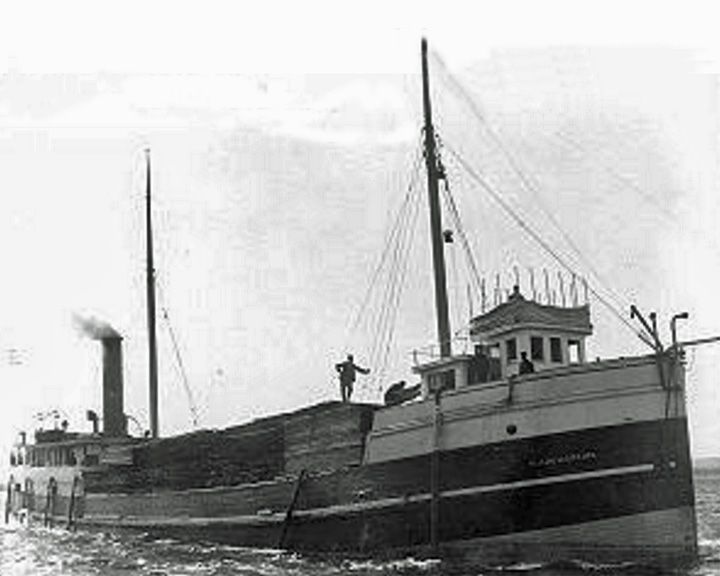 Myron, SS — American wooden steamship, built as a lumber hooker The wreck is protected as part of an underwater museum in the Whitefish Point Underwater Preserve. She defied the adage "Lake Superior seldom gives up her dead" when all 17 crew drifted ashore found frozen to death. The captain survived. LAUNCHED: 1888 → FATE: Sank to the end of Lake Superior during a storm on November 23, 1919. |
 Napoléon, (Le) — French battleship, ship of the line First true steam and screw battleship in the world. She was the lead ship of a class of 9 battleships, all considered as very successful and built over a period of 10 years. LAUNCHED: 1850, May 18 → FATE: Sunk November 6, 1876. |
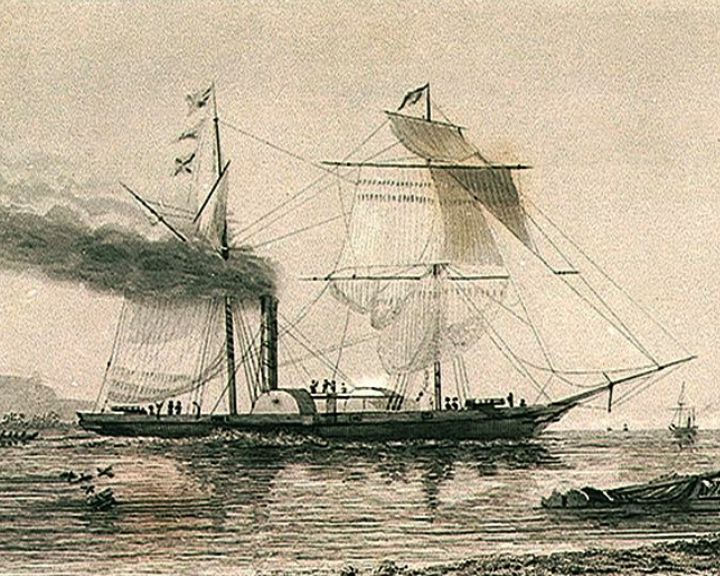 Nemesis — British steam and sail powered warship The first British ocean-going iron warship; also the first iron ship to sail around the Cape of Good Hope. She was greatly effective in the First Opium War. The Chinese referred to her as the "devil ship". LAUNCHED: 1839 → FATE: Ended up in Calcutta, 1855. |
|
Page 12
|
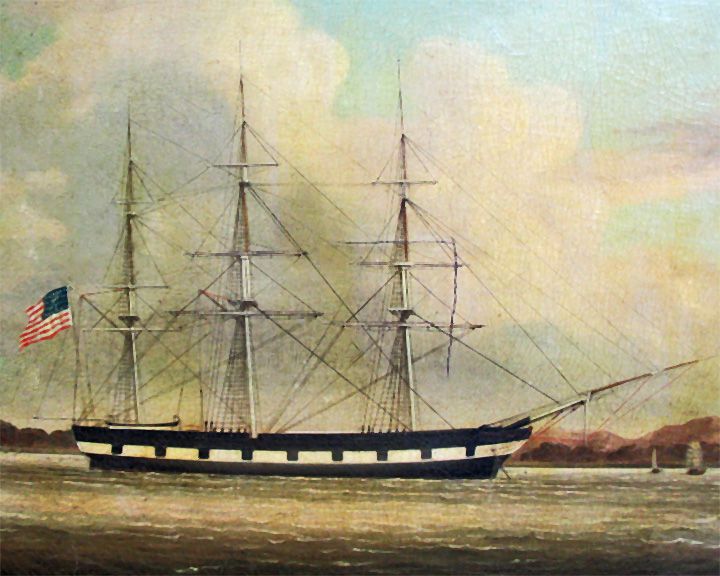 Niantic — American whaling ship Brought fortune-seekers to Yerba Buena (now San Francisco) during the California Gold Rush of 1849. She was a prominent landmark in the booming city for several years. The site of Niantic beside the Transamerica Pyramid is now a California Historical Landmark. LAUNCHED: 1832 → FATE: Converted to hotel in 1849, destroyed by fire 1852. |
 Nina, (La) — Spanish four masted caravel The smallest of Columbus' ships of discovery. She became Columbus' flag ship back to Spain after the loss of Santa Maria. LAUNCHED: 1492 → FATE: Last heard of in 1501; fate unknown. |
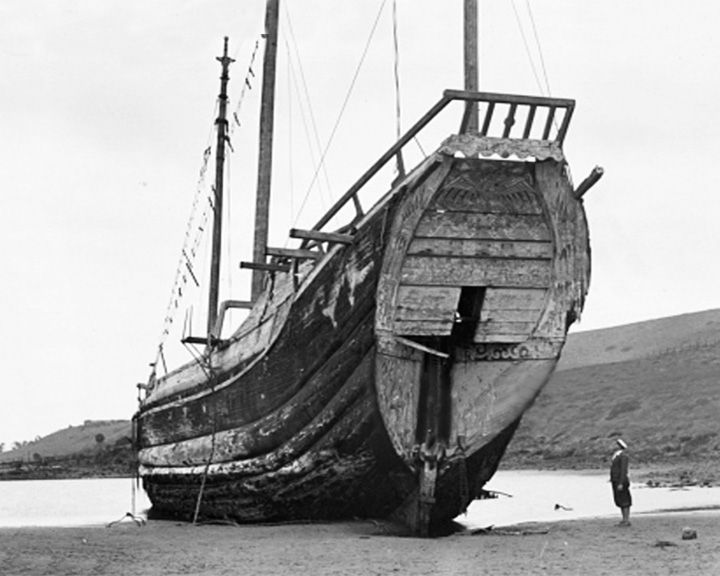 Ning Po — Chinese 3-masted, 291 ton junk Spent 159 years in the Yellow Sea engaging in crimes such as smuggling, slave trading, mutiny, and piracy. During the 1920s and 1930s she sat in Catalina Harbor, Santa Catalina Island, California and was used as a backdrop for movies filmed there. LAUNCHED: 1753 → FATE: Burned in Catalina Harbor in 1938. |
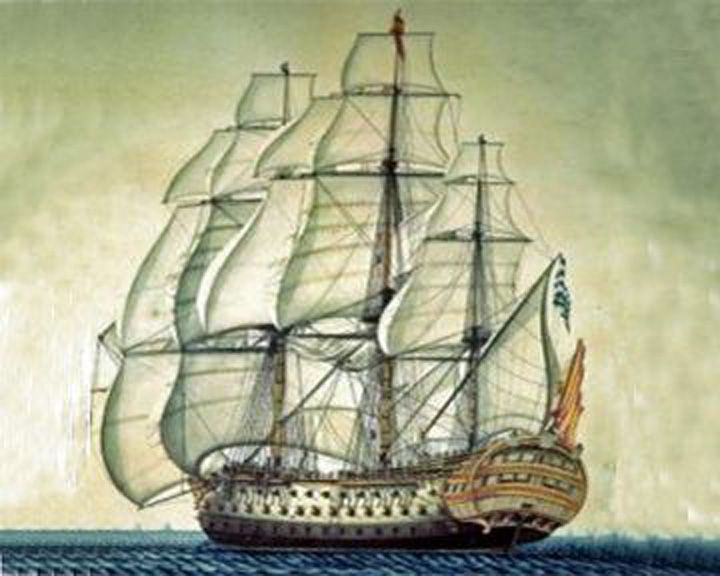 Nuestra Señora de las Mer — Spanish frigate Thought to be the wreck discovered by Odyssey Marine Exploration. Returning to Spain from South America with tons of gold, silver and jewels, she was blown up by the British off Cabo de Santa Maria, Portugal. LAUNCHED: 1786 → FATE: Sunk by the British on October 5, 1804. |
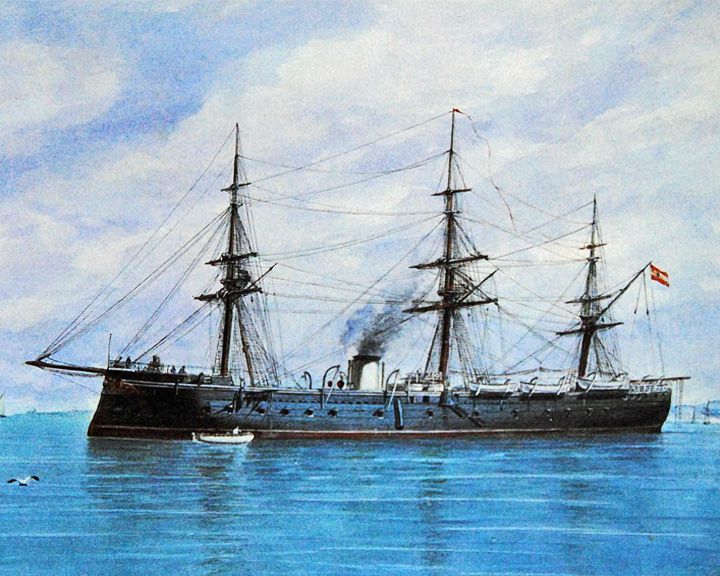 Numancia — Spanish broadside ironclad First ironclad to circumnavigate the Earth. She was built as an armored frigate in France and sold to the Spanish in 1865. LAUNCHED: 1863, November 18 → FATE: Sank while under tow December 17, 1916. |
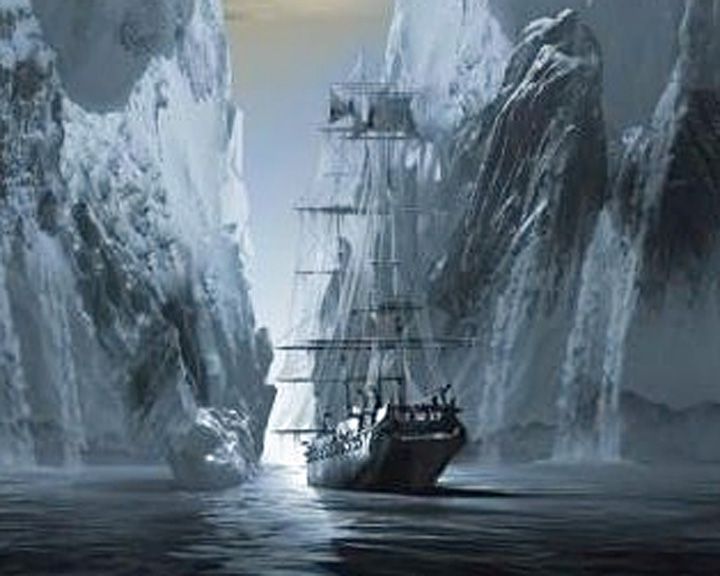 |
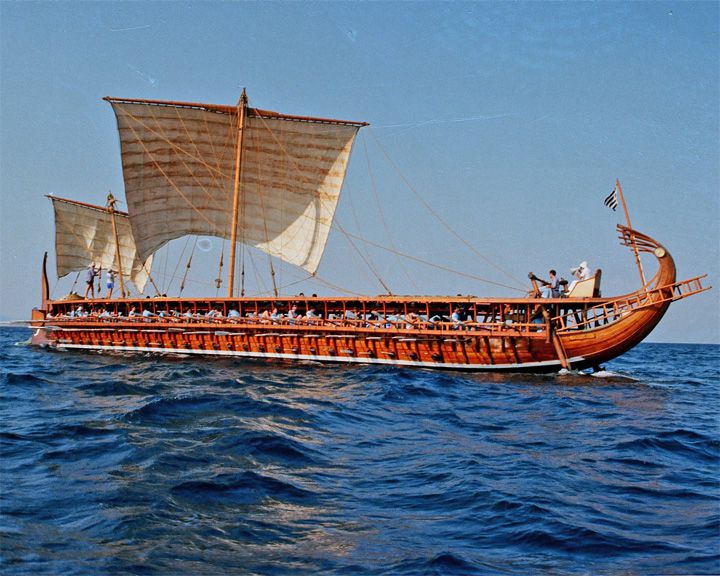 Olympias — Greek trireme The only commissioned replica trireme in the world. She achieved a speed of 9 knots (17 km/h) and was able to turn 180 degree within one minute. LAUNCHED: 1987, August → FATE: On exhibit in a dry dock at the Naval Tradition Park in Palaio Faliro, Athens, Greece. |
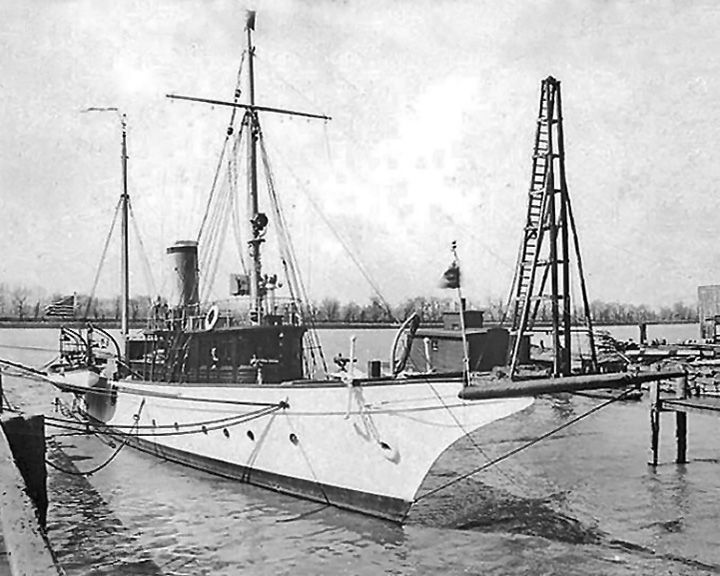 Oneida — American yacht W.R. Hearst's boat and site of the mysterious death of an American film producer that became a scandal and part of early Hollywood lore. The 2001 movie The Cat's Meow dramatized the fateful events on the yacht. LAUNCHED: 1897 → FATE: Sold as scrap August 21, 1940. |
|
Page 13
|
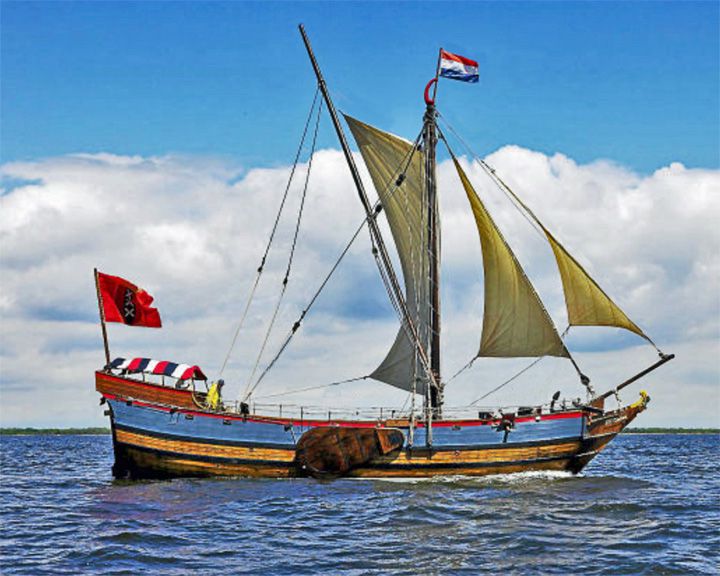 Onrust — Dutch yacht First ship built to reach what is now New York State, and the first fur trading vessel built in America. The ship was the first to explore much of the eastern seaboard around New England. LAUNCHED: 1614, replica launched May 20, 2009 → FATE: Original ship, unknown; replica on display at Connecticut River Museum. |
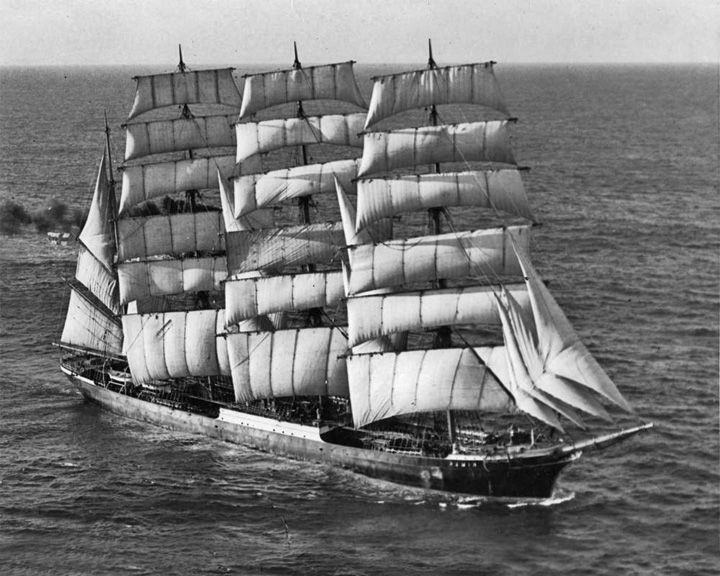 Pamir — German barque, four-masted steel-hulled windjammer Last commercial sailing ship to round Cape Horn in 1949. Over her life at various times, she flew under the flags of Germany, Italy, New Zealand, and Finland. LAUNCHED: 1905, July → FATE: Caught in Hurricane Carrie and sank off the Azores, September 21, 1957. |
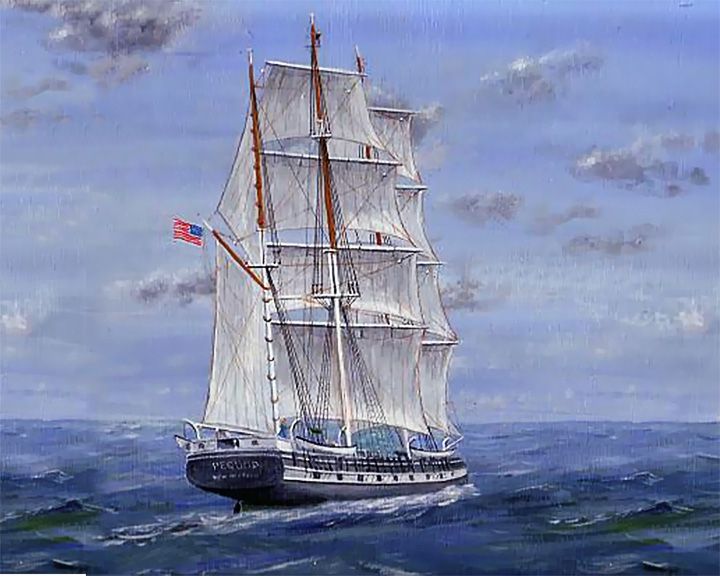 Pequod — American whaling ship Fictitious 19th-century Nantucket whaling ship in the 1851 novel Moby-Dick by Herman Melville and in several movies. In the novel, the ship's captain is the one-legged, monomaniacal Ahab. LAUNCHED: 1840, or earlier → FATE: Destroyed by a whale supposedly in 1851. |
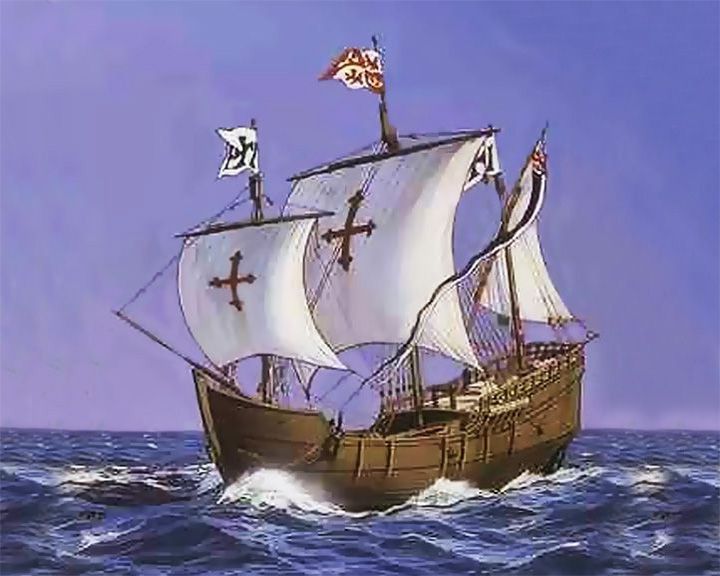 Pinta, (La) — Spanish three masted caravel One of Columbus' ships of discovery. The fastest of Columbus' three ships to America in 1492, and Columbus' flag ship on the return trip to Spain in 1943. She was among the fleet of 17 ships for Columbus' second voyage. LAUNCHED: 1441, circa → FATE: Around 1501. |
 Portland, PS — American sidewheel steamer Known as the "Titanic of New England" and considered New England's worst maritime disaster, she went down with an estimated 192-245 passengers and crew. The storm that sank her, killed more than 400 persons and sank more than 150 other boats and ships. LAUNCHED: 1889 → FATE: Sank in the Portland Gale off of Cape Ann November 27, 1898. |
 President, SS — British paddle steamship, with sails; ocean-going First steamship lost at sea on a transatlantic run, taking with her all 136 on board. Constructed with a third deck on top of the hull and designed with luxurious staterooms, she was top heavy and rolled excessively. LAUNCHED: 1840, August → FATE: Lost during a gale off Nantucket Shoals March of 1841. |
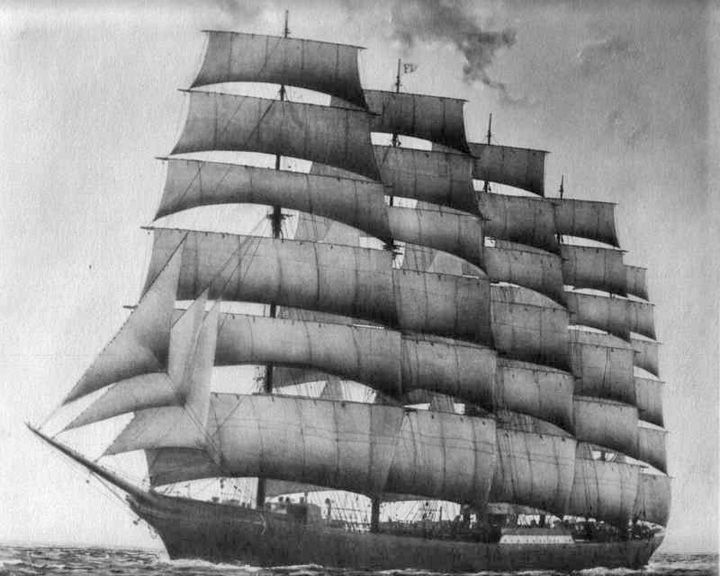 Preußen — German windjammer, five-masted The largest sailed ship ever built and the only five-masted, full-rigged, ship built until the 21st century. She was built entirely of steel. She was used in the saltpeter trade with Chile, setting speed records in the process. LAUNCHED: 1902, May 18 → FATE: Swept onto rocks and sank near the White Cliffs of Dover November 6, 1910. |
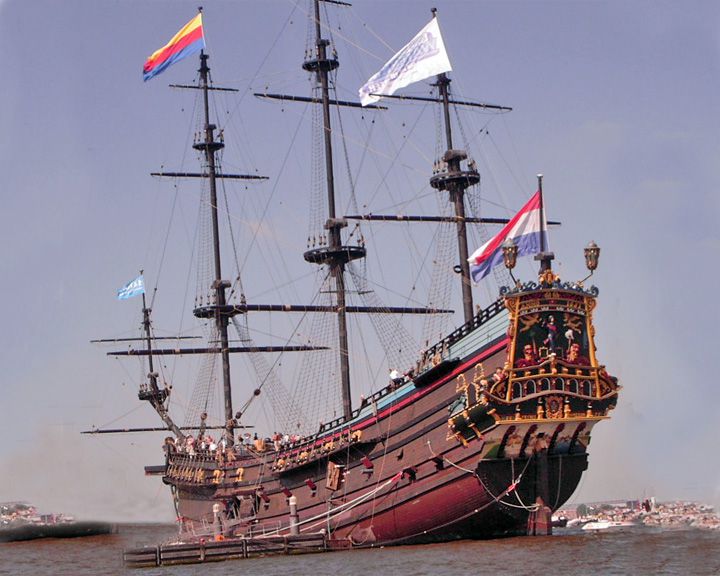 (Another (Another Prins Willem replica — Dutch brig; replica of a full-rigged ship This replica of a ship built in 1649 and sunk in 1662 was lost in fire on the morning of 30 July 2009(See alternate image). In 2004, the replica became part of the theme park Cape Holland in Den Helder, the Netherlands. LAUNCHED: 1985 → FATE: Burned and sank at Den Helder, Netherlands July 30, 2009. |
|
Page 14
|
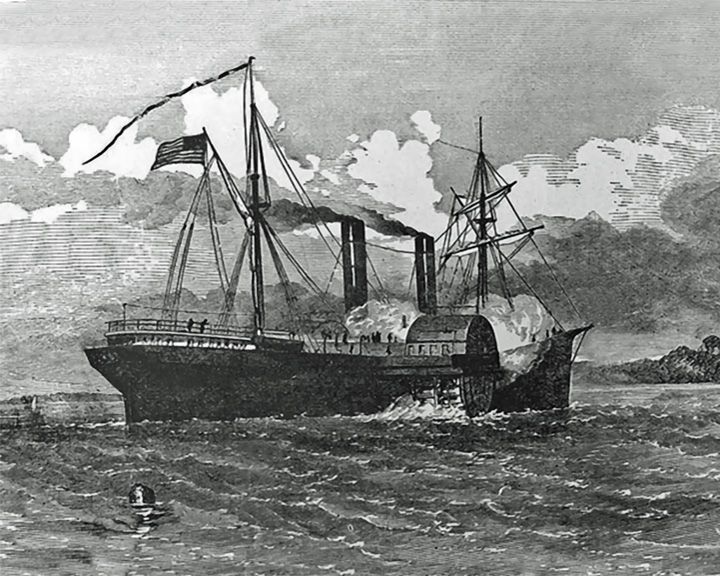 Quaker City, USS — American paddle steamship, side-wheeler During a trip to Europe in 1867, she was the scene of some of the tales related by Mark Twain in his book The Innocents Abroad. During the American Civil War, she one of the most active and effective ships in the Union Navy's blockade of Chesapeake Bay. LAUNCHED: 1854 → FATE: Sold to the Haitian Navy in February of 1871, renamed République, lost at sea off Bermuda in March of 1871. |
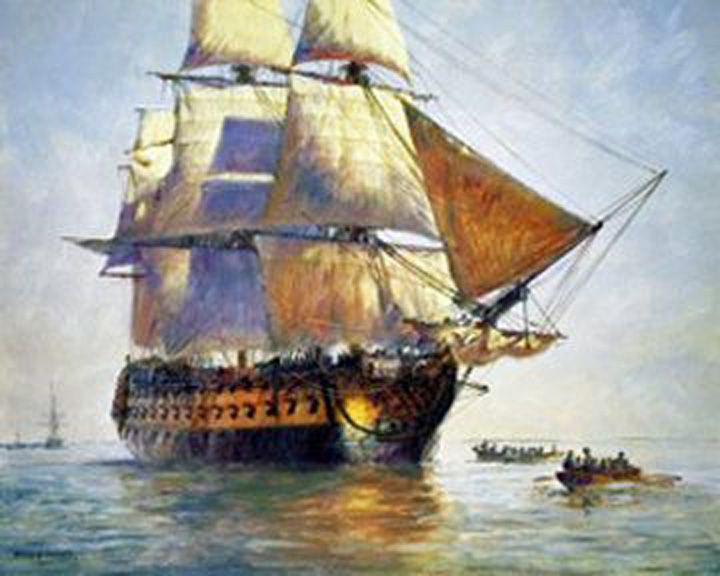 (Another (Another Queen Anne's Revenge — English sloop Flagship of pirate Blackbeard (Edward Thatch). As Conccord was captured by the French in 1711, and then as La Concord she was taken by pirates in 1717. LAUNCHED: 1710 → FATE: Run aground near Beaufort Inlet, North Carolina in May, 1718. |
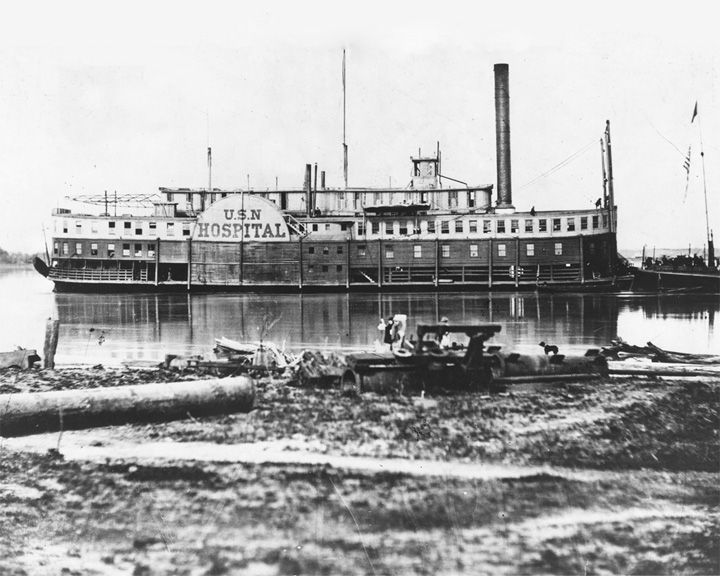 Red Rover, USS — American Confederate paddle steamboat, side-wheeler First ship fitted and staffed as a hospital ship. During the American Civil War, she was a Confederate barracks ship until the Union captured and refit her in March of 1862. LAUNCHED: 1859 → FATE: Decommissioned and sold at public auction November 29, 1865. |
 Resolution, HMS — British Collier The first ship to cross the Antarctic Circle reaching beyond latitude 71 degrees south. She was the ship on which Captain James Cook made his second and third voyages of exploration in the Pacific. LAUNCHED: 1770 → FATE: Taken by the French June 10, 1782, renamed La Liberté and ended up rotting in Narragansett Bay not far from Cook's other ship, Endeavour. |
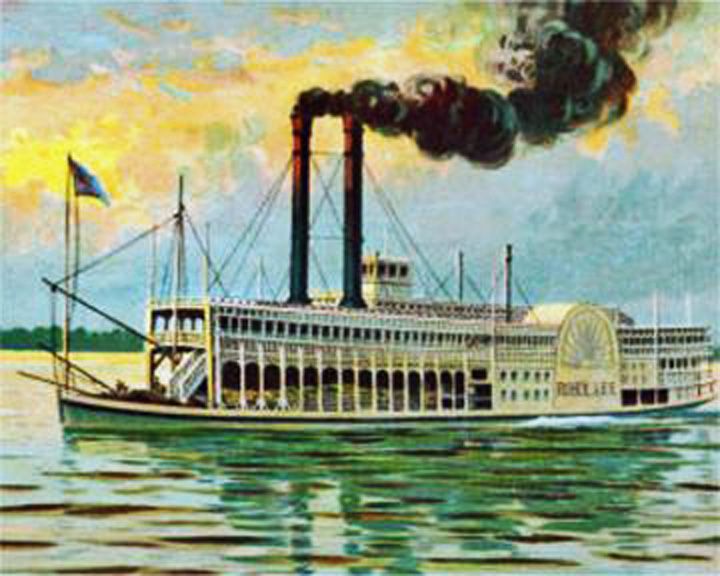 Robert E. Lee — American paddle steamboat, side-wheeler Won a steamboat race against the Natchez VI, going from St. Louis, Missouri to New Orleans, in 3 days, 18 hours and 14 minutes. The speed record still stands. A replica of the ship was built but it also burned in 2010. LAUNCHED: 1866 → FATE: Caught fire and lost north of New Orleans September 30, 1882. |
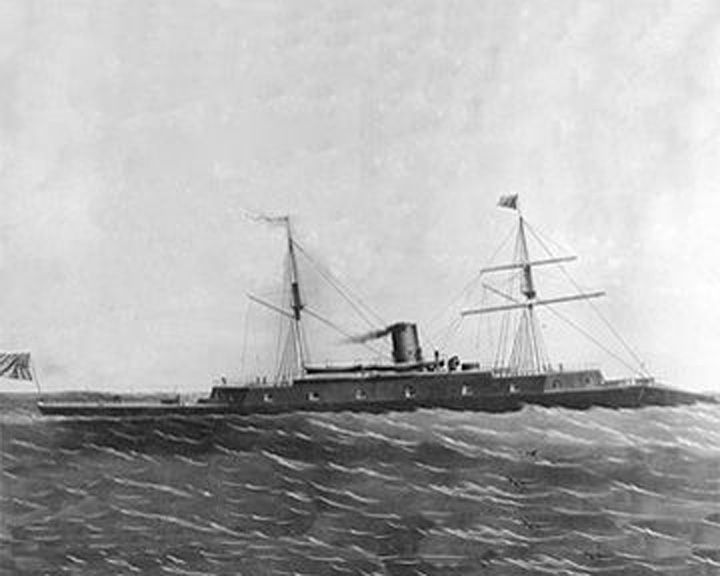 Rochambeau — American frigate, ironclad The longest wooden ship ever built. When the French thought Otto von Bismarck might be interested in the ship, they hurriedly bought her from the Americans and commission her in 1867. LAUNCHED: 1862, July 22 as Dunderberg → FATE: The French scrapped her in 1874. |
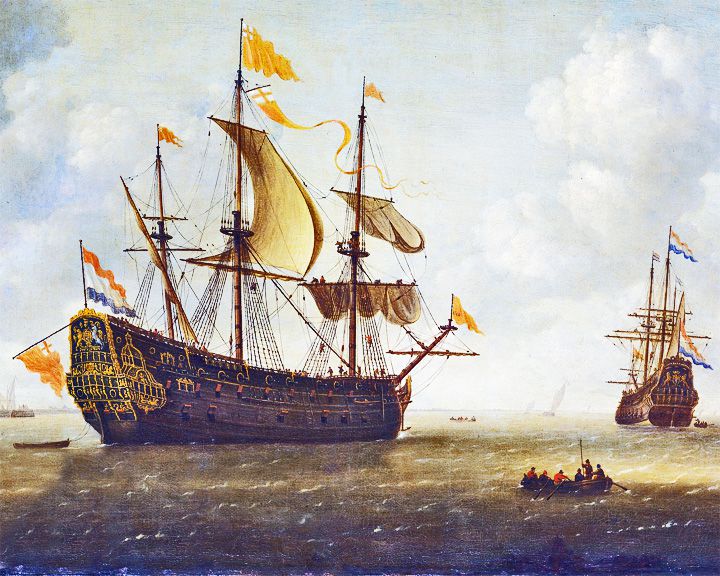 Royal Charles, HMS — British first-rate three-decker ship of the line During the English Restoration, she brought Charles II and his entourage from the Dutch Republic to England to reclaim his crown. At 1,229 tons, she was larger than Sovereign of the Seas, the first three-deck ship of the line. LAUNCHED: 1655, April 18 → FATE: Sold for scrap in 1673 by Dutch navy. |
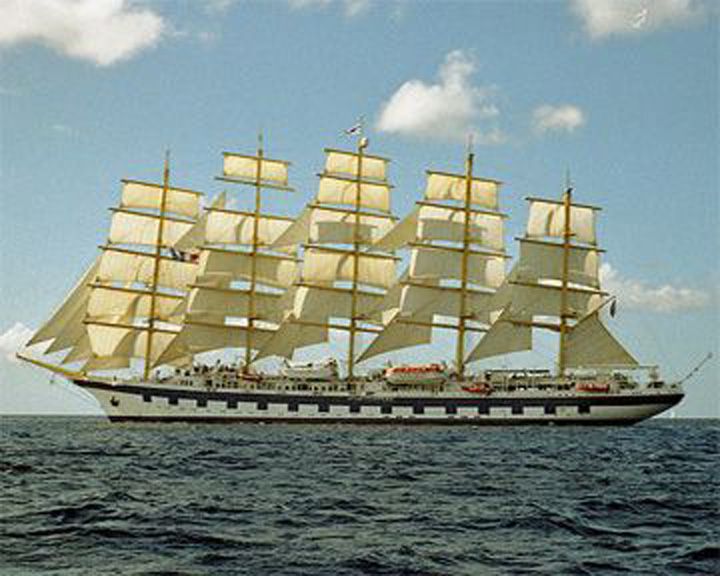 Royal Clipper — German tall ship; steel-hulled five masted fully rigged design The largest and only five-masted full-rigged sailing ship in service. Her design was based on the German ship Preussen, but was configured for passenger comfort rather than cargo carrying. LAUNCHED: 2001 → FATE: Still in service. |
|
Page 15
|
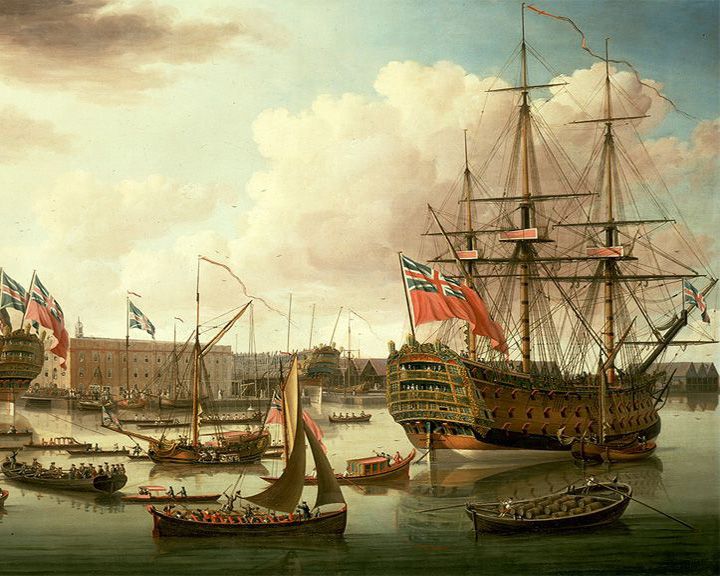 Royal George, HMS — English first-rate ship of the line One of the most serious maritime losses to occur in British water, sinking while undergoing routine maintenance taking more than 800 lives. She was the largest warship in the world at the time of launching. LAUNCHED: 1756, February 18 → FATE: Sank while anchored off Portsmouth August 29, 1782. |
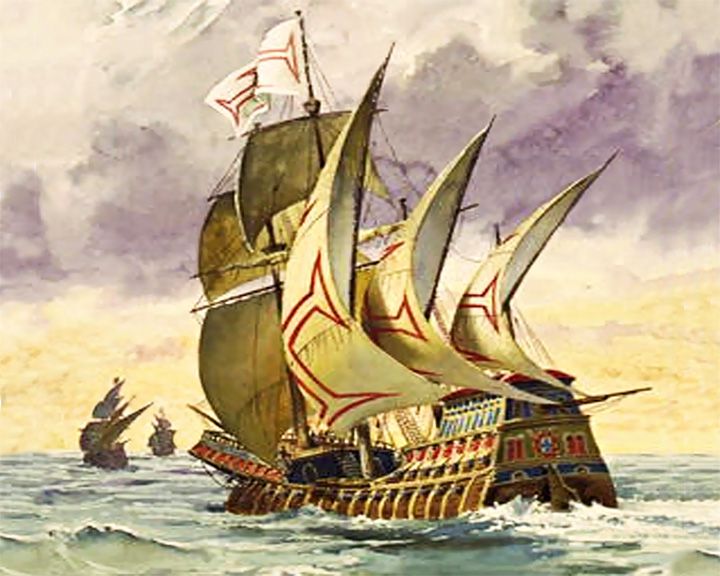 São Gabriel — Portugese caravel Flagship of Vasco da Gama's armada which carried the first Europeans to the coast of India. She, along with ships São Rafael, Bérrio, and São Miguel, made the round trip in two years. LAUNCHED: 1497 → FATE: Unknown. |
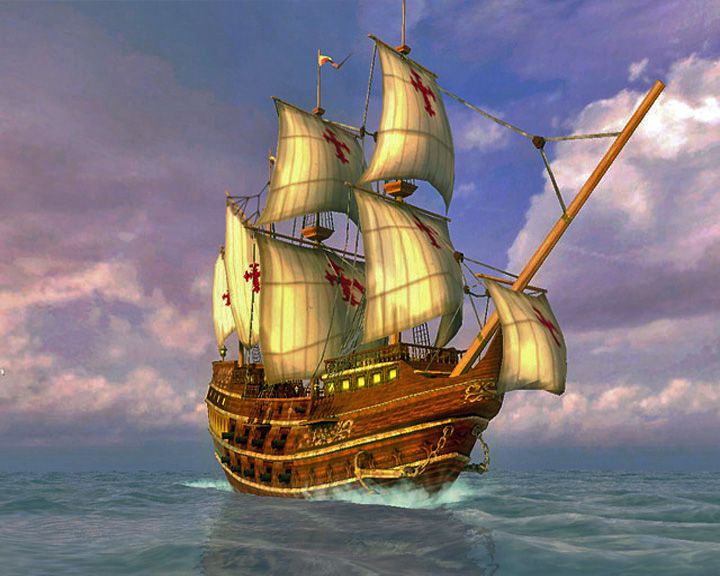 São Martinho — Portuguese galleon Flagship of Duke of Medina Sedonia, commander-in-chief of the Spanish Armada. In September 1588, she was among the few Armada ships to make it back to the port city of Santander, Spain, after suffering heavy damage by English ships. LAUNCHED: 1580 → FATE: 1589 perhaps. |
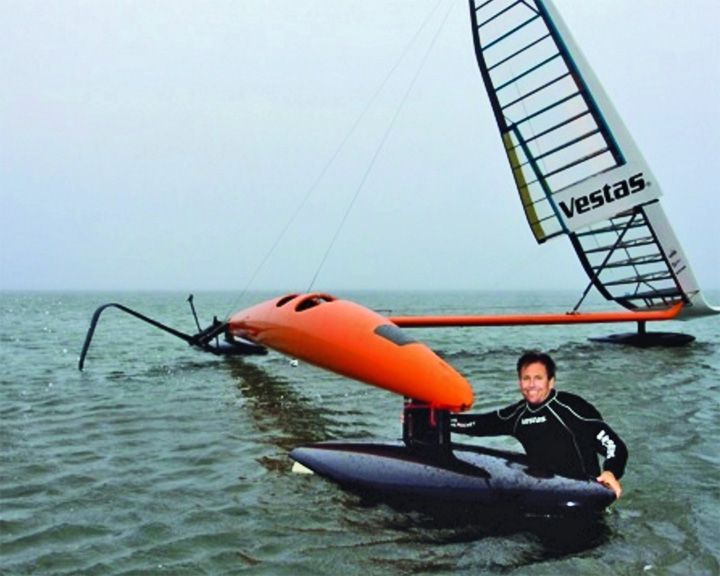 Sailrocket 2 — Australian speed sailboat Built to capture the class D sailing speed record, piloted by the project leader Paul Larsen at 65.45 knots in Walvis Bay, Namibia. In 2008, before crashing, the first Sailrocket reached a reported unofficial speed of 52.22 knots. LAUNCHED: 2011, March → FATE: Still racing. |
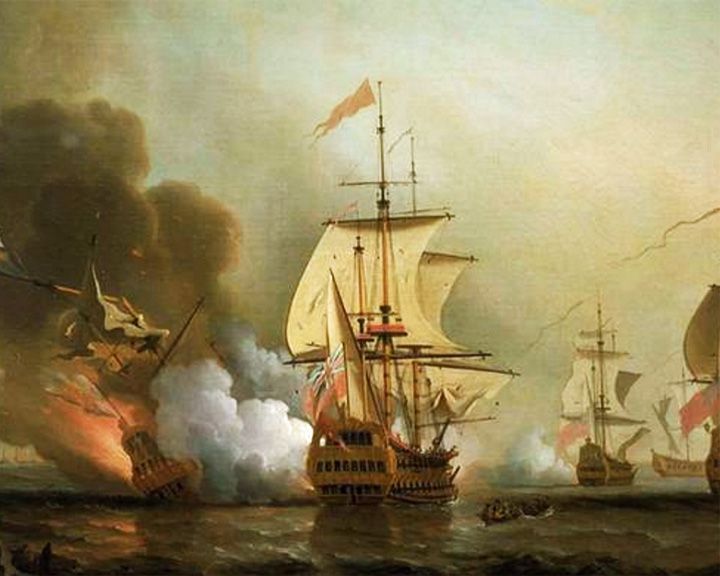 San José — Spanish galleon,60-gun Sunken treasure ship with 7 to 10 million Spanish pesos on board. She was discovered in 2015 with treasure estimated to be worth between 4-17 billion US dollars. LAUNCHED: 1696 → FATE: Sunk in battle off the coast of Cartagena, Colombia in 1708. |
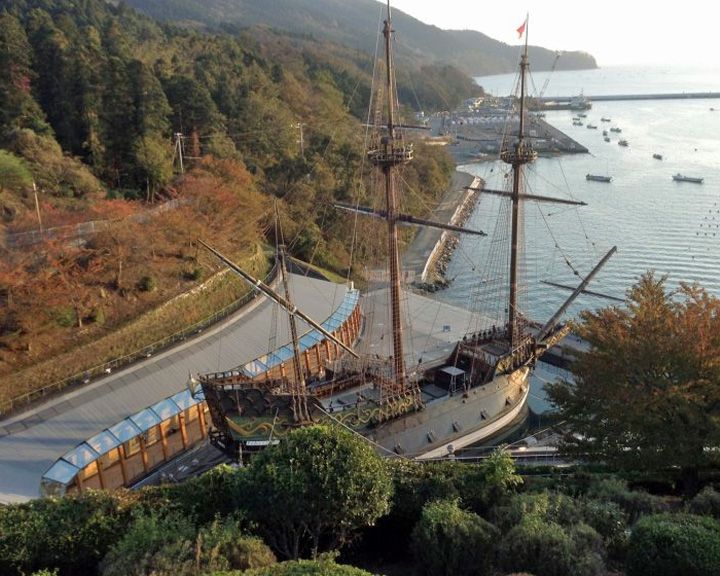 San Juan Bautista — Japanese galleon One of Japan's first Japanese-built Western-style sailing ships. She crossed the Pacific in 1614 transporting a Japanese diplomatic mission to the Vatican. By 1619, then owned by Spain, she was a slave ship. A full sized replica of the San Juan Bautista is the centerpiece of museum in Ishinomaki, Japan. LAUNCHED: 1613, September → FATE: Unknown |
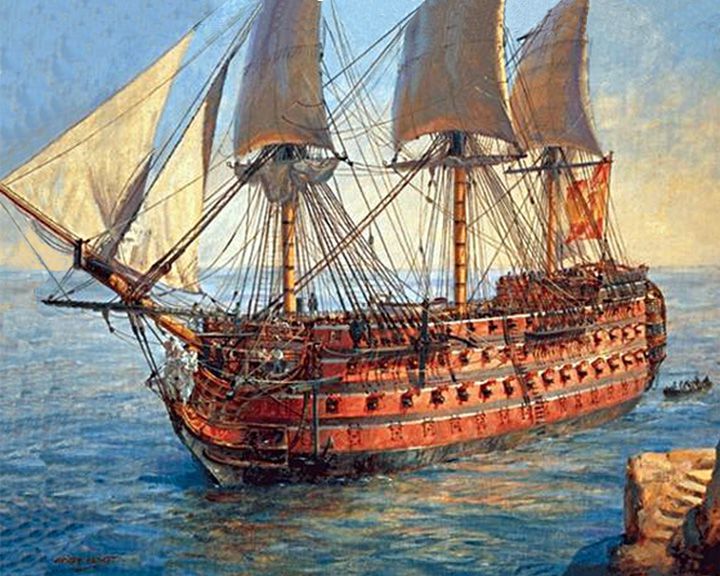 (Another (Another Santísima Trinidad — Spanish ship of the line, first-rate After refitting in 1804, the largest and heaviest-armed ship in the world with 140 guns on four decks. A full-size representation in on display in the harbour of Alicante, Spain as shown in "Another IMAGE". LAUNCHED: 1768 → FATE: Sank at the Battle of Trafalgar in October of 1805. |
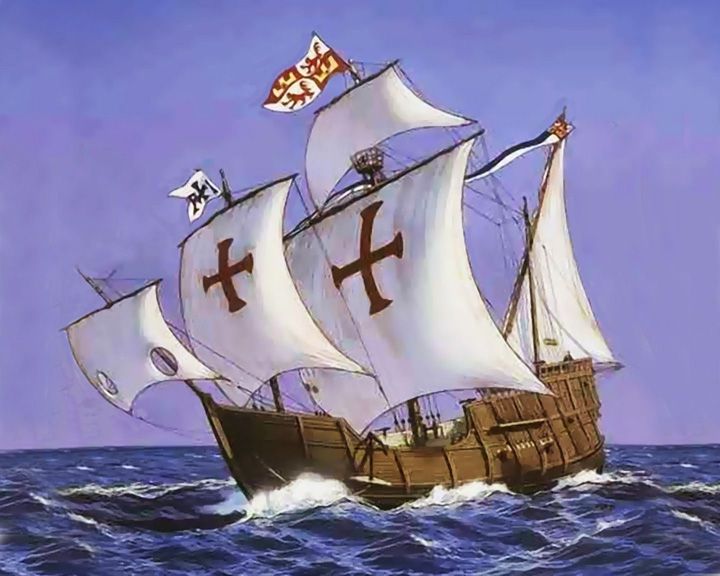 Santa Maria — Spanish carrack The largest of Columbus' ships of discovery. The anchor of the Santa María now resides in the Musée du Panthéon National Haitien, in Port-au-Prince, Haiti. LAUNCHED: 1460, circa → FATE: Ran aground and lost near Cap-Haitien, Haiti, December 25, 1492. |
|
Page 16
|
 Savannah, SS — American paddle steamship, side-wheeler with sails First steamship to cross the Atlantic Ocean. After ocean crossing, her steam plant was removed and she continued sailing up and down the east coast. LAUNCHED: 1819, March → FATE: Ran aground off Long Island, NY in 1823. |
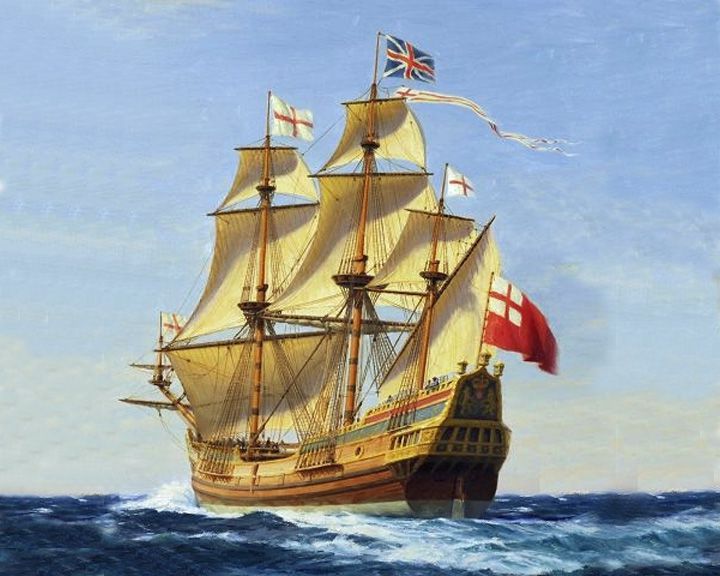 Sea Venture — English merchant ship; purpose-built First dedicated emigration ship as part of the Third Supply mission to the Jamestown Colony. During the storm, massive leaks developed because of faulty construction. All 150 people aboard and one dog made it to shore safely. LAUNCHED: 1609 → FATE: Damaged in a hurricane and scuttled at Discovery Bay, June 1609. |
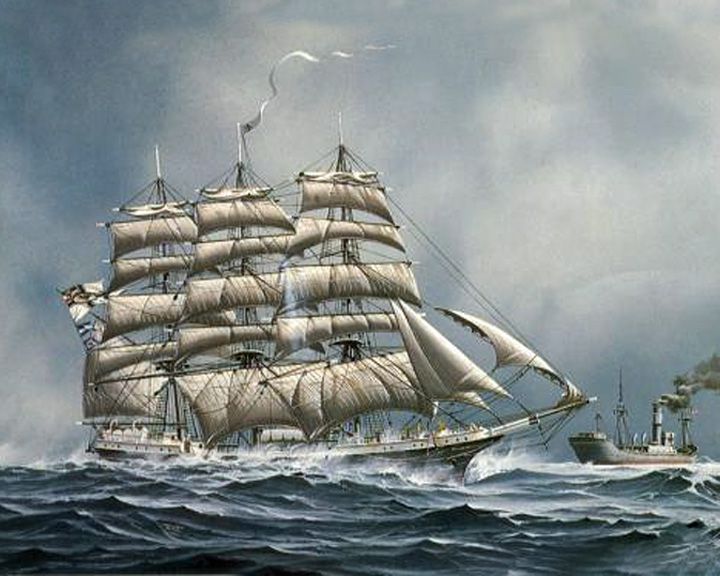 Seeadler, SMS — Scottish windjammer, three-masted; American owned One of the last sailing ships used in a war; as a German merchant raider disguised as a Norwegian wood carrier. she was originally named Pass of Balmaha before capture by a German submarine. LAUNCHED: 1888 → FATE: Wrecked on a reef at the island of Pacific, August 2, 1917. |
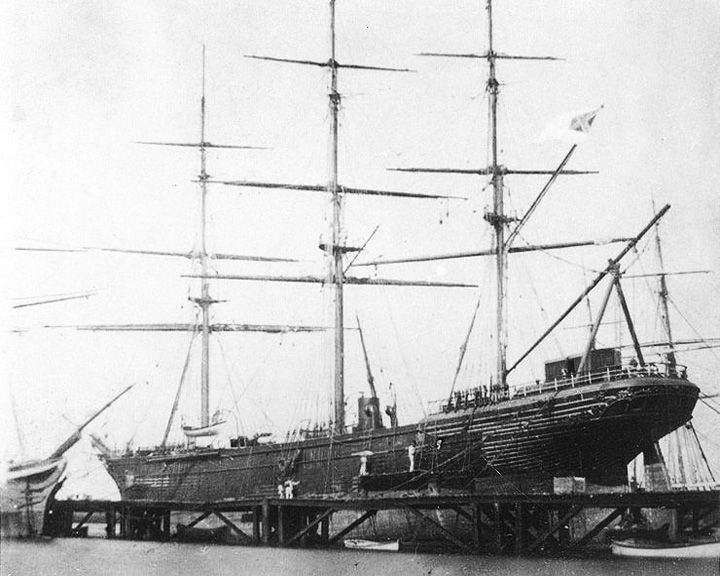 Shenandoah, CSS — American Confederate full-rigged ship, iron-clad During the US Civil War, she captured and/or sank 38 Union merchant vessels. She fired the last shot of the Civil War off the Aleutian Islands, then was surrendered to the British. She was sold to Majid bin Said, the first Sultan of Zanzibar who renamed her El Majidi after himself. LAUNCHED: 1863, August 18 → FATE: As El Majidi, beached during hurricane near Zanzibar in 1872. |
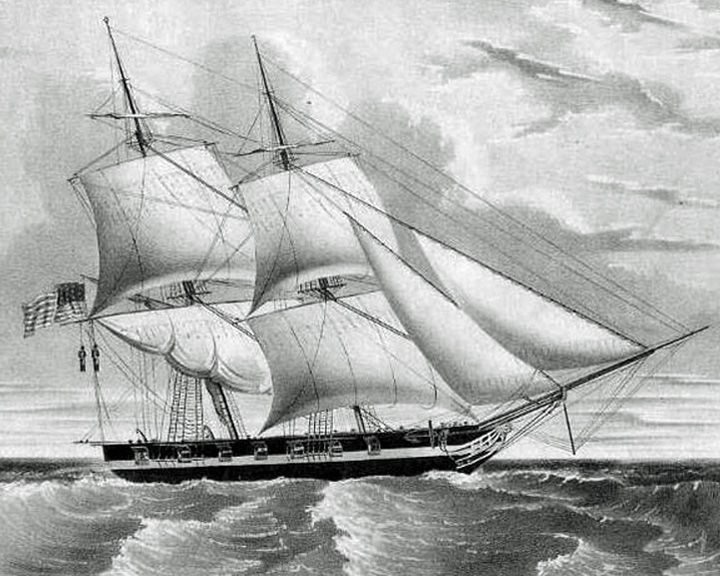 Somers, USS — American brig The only U.S. Navy ship upon which a conspiracy of mutiny took place. Known as the "Somers Affair", it was the basis for several books and dramatizations. December 1, 1842, three of the mutineers who intended to take over the ship and use it for piracy were found guilty of "intention to commit a mutiny," hanged and buried at sea. LAUNCHED: 1842, May 18 → FATE: Capsized and foundered in a sudden squall off Vera Cruz December of 1846. |
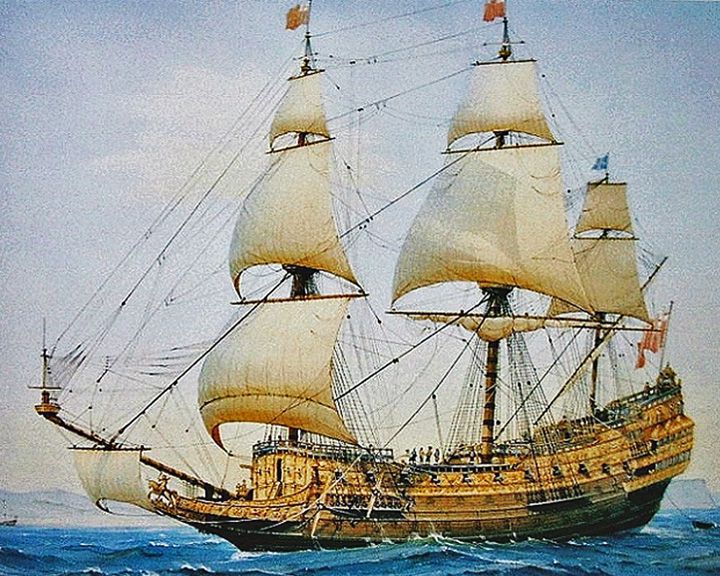 Sovereign of the Seas, HMS — English full-rigged warship The most extravagantly decorated warship in the early Royal Navy. She was armed with 102 bronze guns at the insistence of the king, Charles I of England. LAUNCHED: 1637, October 18 → FATE: Burnt to the water line January 27, 1697. |
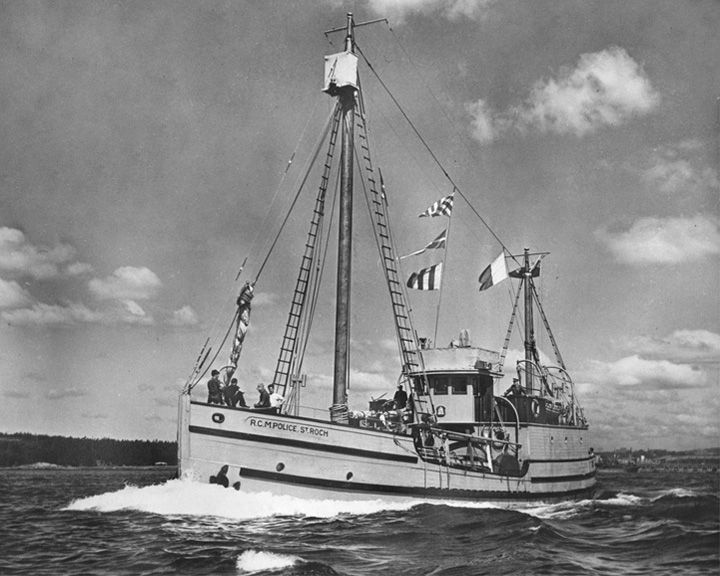 St. Roch — Canadian schooner The first ship to completely circumnavigate North America, and first to complete passage through the Northwest Passage west to east. She was also the first vessel to pass through the more northerly route of the Northwest Passage, and was also the first to navigate the passage in a single season. LAUNCHED: 1928, May 18 → FATE: On exhibit at the Vancouver Maritime Museum. |
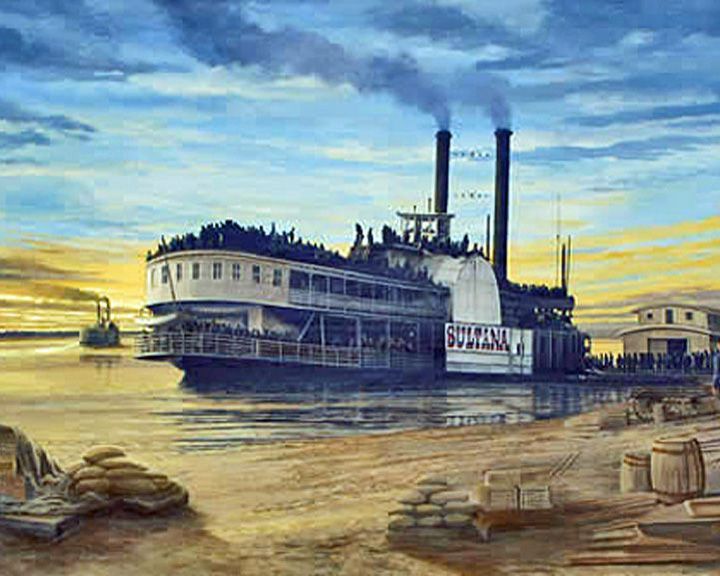 Sultana, SS — American paddle steamboat, stern-wheeler Tragically collided with the SS Narragansett. An estimated 1,800 of 2,400 passengers were killed when the ship's boilers exploded, earning her the appellation "Titanic of the Mississippi." LAUNCHED: 1863 → FATE: Sank April 27, 1865. |
|
Page 17
|
 Surprise, HMS — Canadian tall ship based on the 1757 HMS Rose, a sixth-rate frigate As HMS Rose, she appeared in the 2003 movie Master and Commander: The Far Side of the World and was officially re-registered as HMS Surprise in honor of her role in the film. In 2010, she portrayed HMS Providence in the movie Pirates of the Caribbean: On Stranger Tides. LAUNCHED: 1970 → FATE: Since 2007, based in Maritime Museum of San Diego. |
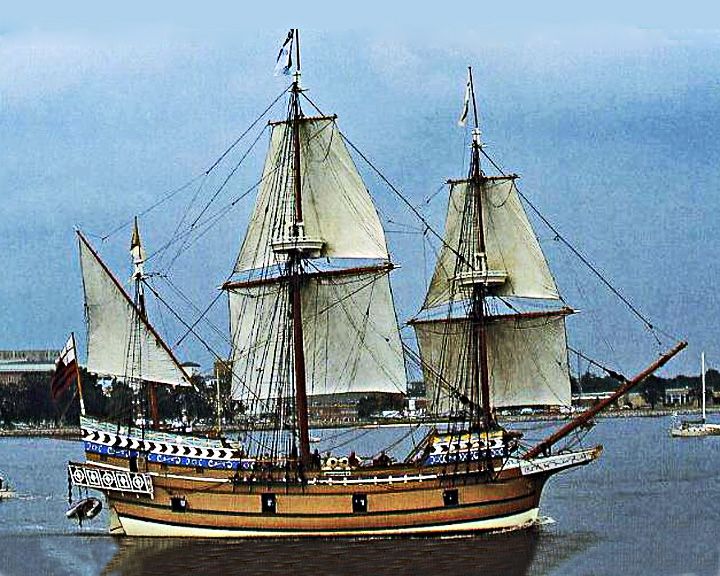 Susan Constant — British fully-rigged ship The largest of three ships of the English Virginia Company sailing to establish the new Colony of Virginia, Jamestown. Replicas of Susan Constant, shown in image, and her sister-ships are docked in the James River at Jamestown Settlement. LAUNCHED: 1607 → FATE: After 1615, fate unknown. |
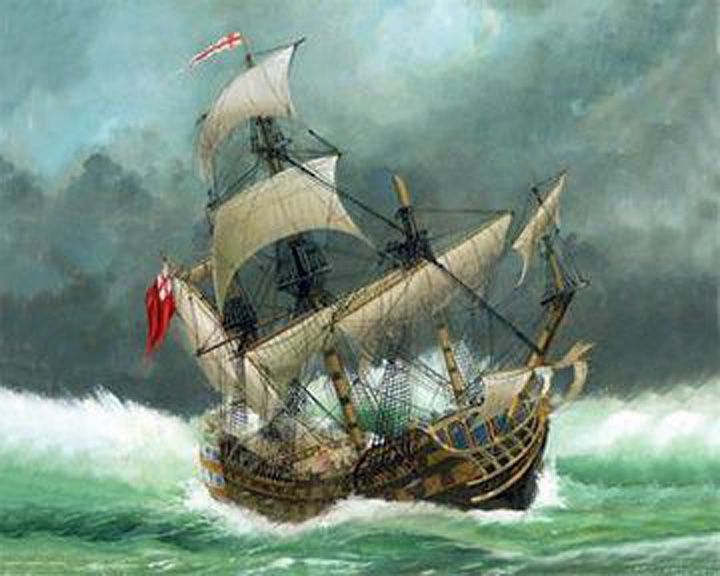 Sussex, HMS — English ship of the line, third-rate One of the most valuable wrecks ever with possibly 10 tons of gold coins and other valuables on board. Besides Sussex, 12 other ships of her flotilla sank with about 1,200 casualties making the disaster one of the worst in Royal Navy history. LAUNCHED: 1693, April 18 → FATE: Sank in a violent storm near the Strait of Gibraltar February 27, 1694. |
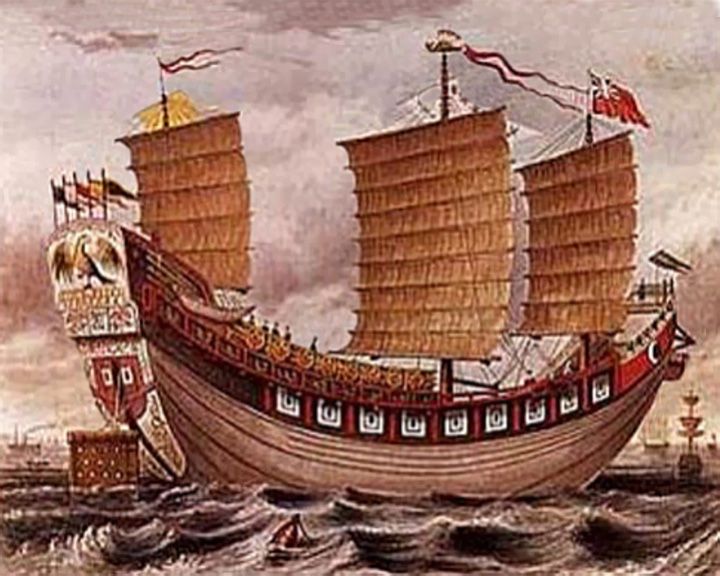 Tek Sin — Chinese ocean-going junk Called the "Titanic of the East" when it sank taking with it over 1,600 people. Only about 200 people survived, being rescued by another ship the next day. LAUNCHED: 1820, circa → FATE: Grounded on a reef, then sank on February 6, 1822. |
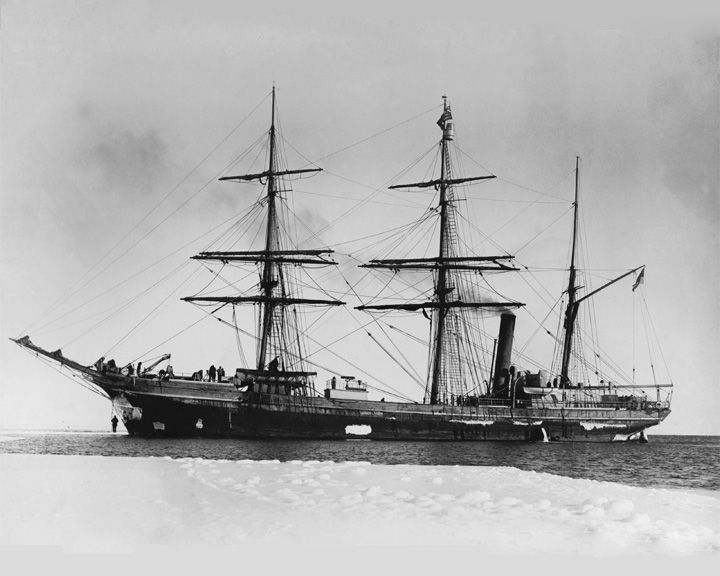 Terra Nova — British wooden-hulled barque Serving in the British Antarctic Expedition 1910, best remembered for the death of Captain Scott and four companions. She was built for the Dundee whaling and sealing fleet, working 10 years in the annual seal fishery in the Labrador Sea. LAUNCHED: 1884 → FATE: Sank off the southwestern tip of Greenland September 13, 1943. |
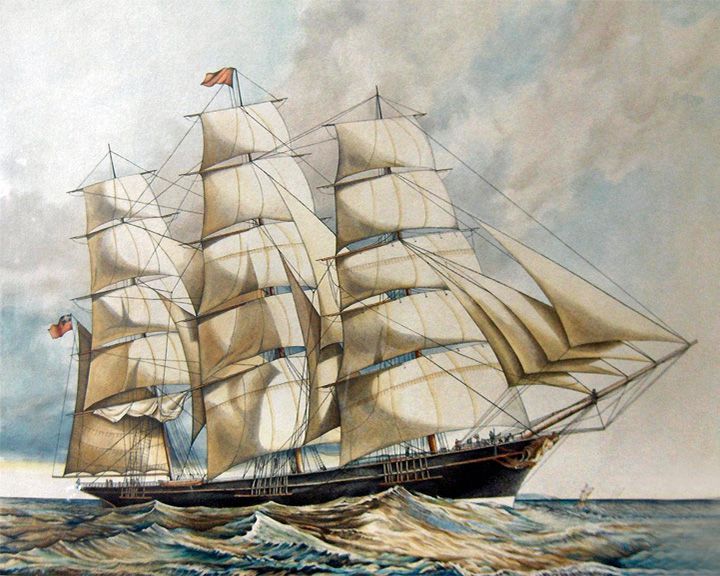 Thermopylae — English extreme clipper Raced the clipper Cutty Sark from Shanghai back to London and won by seven days. In 1897, she was sold to Portugal and renamed Pedro Nunes for used as a naval training ship. LAUNCHED: 1868, August → FATE: Sunk as target practice by the Portuguese Navy, October 13, 1907. |
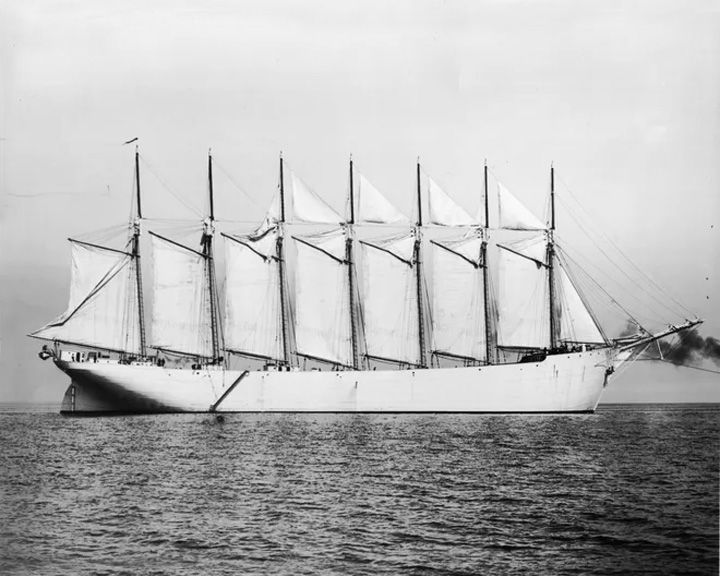 Thomas W. Lawson — American seven-masted schooner The largest schooner and largest sailing vessel without an auxiliary engine ever built. She proved problematic in the ports she was intended to operate in due to the amount of water she displaced. LAUNCHED: 1902, July, 10 → FATE: Sank in a storm while at anchor off Cornwall, England, in 1907 taking 16 of her crew with her. |
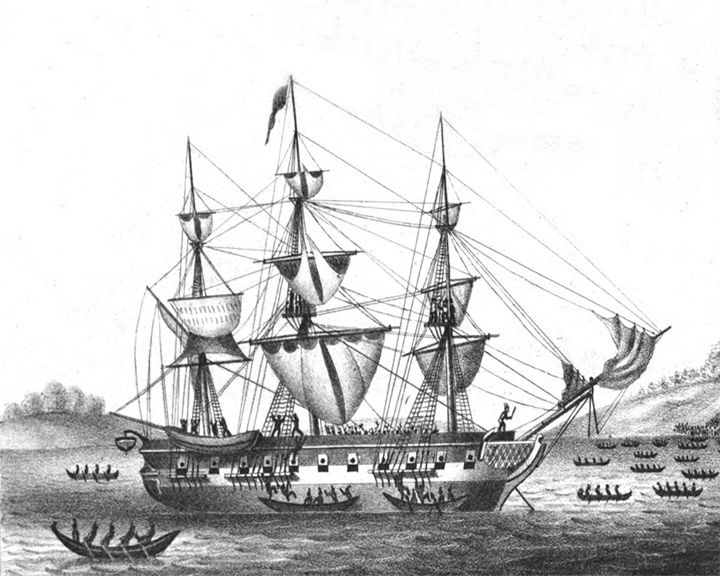 Tonquin — American merchant ship The ship was part of Astor's attempt to establish a fur trading outpost on the Pacific Northwest coast. After an angry encounter with natives, two surviving crew hid in the ship, then when the Indian natives returned to loot the ship, lit a fuse that detonated her powder magazine killing more than 100 natives and two crew. LAUNCHED: 1807, May 26 → FATE: Blown up June 16, 1811. |
|
Page 18
|
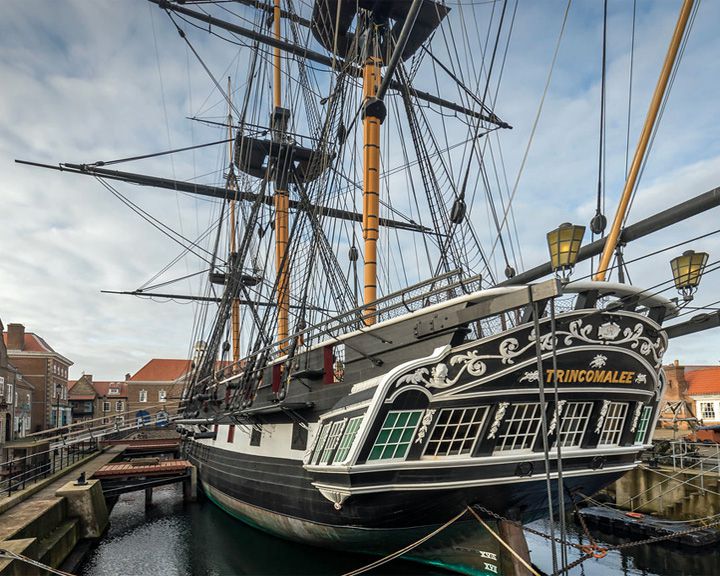 Trincomalee, HMS — British Leda-class frigate One of two surviving British frigates of her era. Holds the distinction of being the oldest British warship still afloat. LAUNCHED: 1817, October 12 → FATE: Restored made the centerpiece museum ship in Hartlepool, England. |
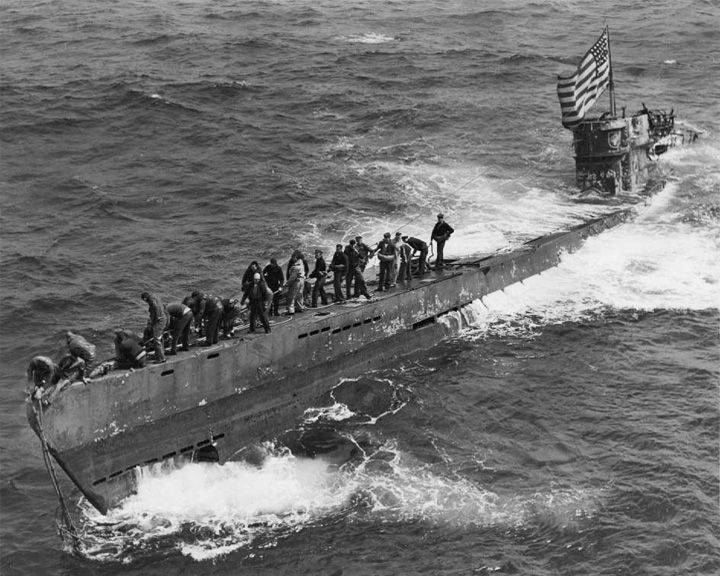 U-505 — German submarine Codebooks, an Enigma machine, and other secret materials that were found on board assisted Allied code breakers during World War II. All but one of crew were rescued from U-505. For U-110, there were casualties among the crew caused by two attacking destroyers. LAUNCHED: 1941, August → FATE: Captured in June 4, 1944. Now at Chicago museum. |
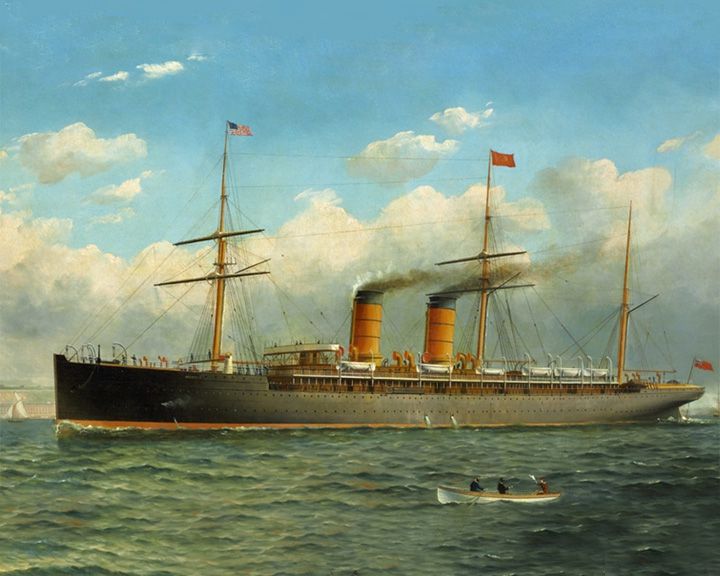 Umbria, RMS — British ocean liner With her sister ship, Etruria, the last two transatlantic ocean liners fitted with auxiliary sails. In May of 1903, the Mafia tried to blow her up but failed. LAUNCHED: 1884, June 18 → FATE: Scrapped in 1910. |
 (Another (Another Unicorn — British three-masted sailing ship Royal Navy vessel appearing in the comics series by Belgian cartoonist Hergé The Adventures of Tintin, and the movie. She is the setting of a battle between pirates and sailors, then scuttled, and discovered years later by the boy Tintin and his friends. LAUNCHED: 1943, first appeared in print; movie release in 2011 → FATE: Inconclusive. |
 Vanguard, HMS — English ship of the line, 74-gun third-rate The flag ship of Horatio Nelson at the Battle of the Nile, 1798. Prince Alberto of Naples and Sicily, part of a royal entourage on board fleeing from Naples and the French, died on board. LAUNCHED: 1787, March 18 → FATE: Broken up in 1821. |
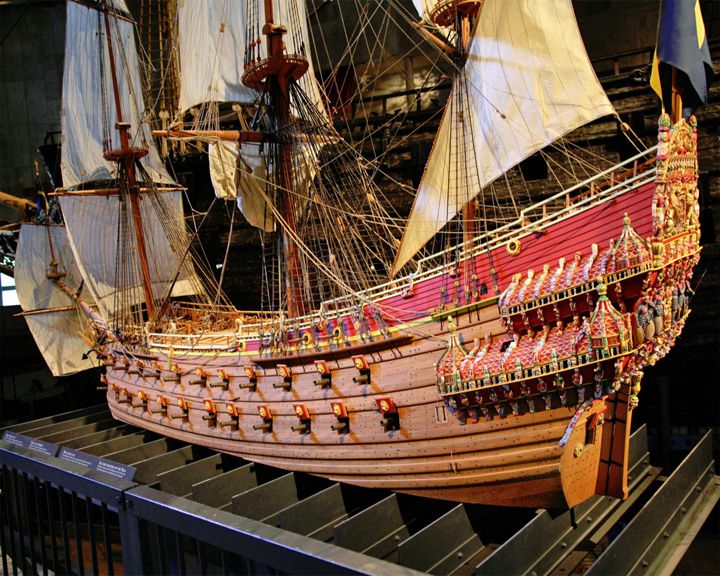 Vasa — Swedish wooden warship One of Sweden's most popular tourist attractions and a widely recognized symbol of the Swedish 'great power period'. During the 1961 recovery, thousands of artifacts and the remains of at least 15 people were found in and around the hull of the Vasa by marine archaeologists. LAUNCHED: 1627 → FATE: Sank on her maiden voyage in 1628 near Södermalm; salvaged in 1961 and now on display in the Vasa Museum in Stockholm. |
 Victoria — Spanish carrack or nao First ship to circumnavigate the world — August, 1519 to September of 1522; a total of 42,000 miles. Captain Ferdinand Magellan was killed in the Phillipines; another four ships were lost along the way. LAUNCHED: 1518, about → FATE: 1522 or soon after. |
 Victory, HMS — English first-rate ship of the line (Galleon) Lord Nelson's flagship at the Battle of Trafalgar in 1805. She was refitted and repainted in 1800-1803, almost broken up in 1831, fitted up as a Naval School 1889, retired in 1904, and eventually restored. LAUNCHED: 1765, May 18 → FATE: Being restored at the HMNB, Portsmouth, England. |
|
Page 19
|
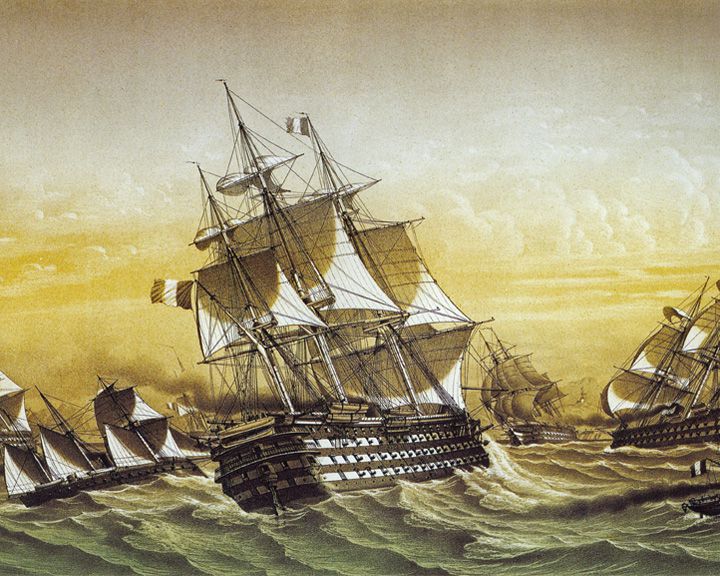 Ville de Paris — French ship of the line, large three-decker The flagship of the Comte de Grasse during the American Revolutionary War and the Siege of Yorktown. A ship of the line of the Royal Navy was named after her, HMS Ville de Paris, and launched in 1795. LAUNCHED: 1764 → FATE: Sank in September 1782 with other ships in a Central Atlantic hurricane. |
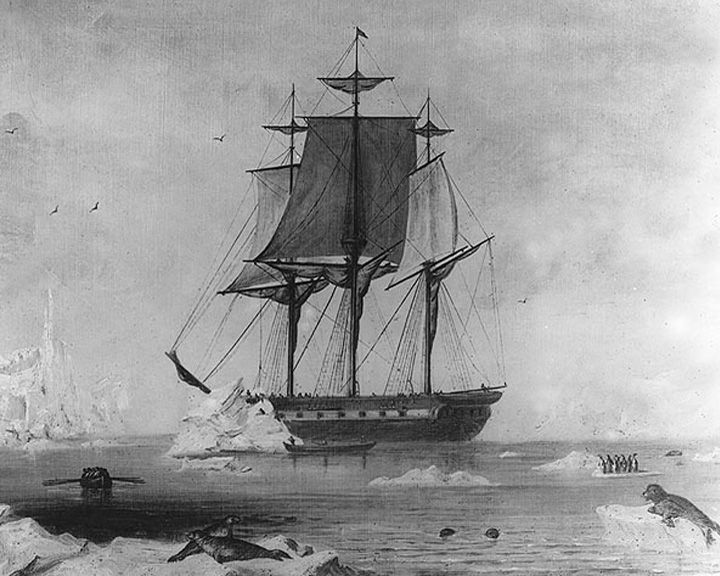 Vincennes, USS — American sloop of war First U.S. ship to circumnavigate the globe. She was the flagship for the U.S. Exploring Expedition of 1838. LAUNCHED: 1826 → FATE: Sold in October of 1867 at Boston, Massachusetts; fate unknown. |
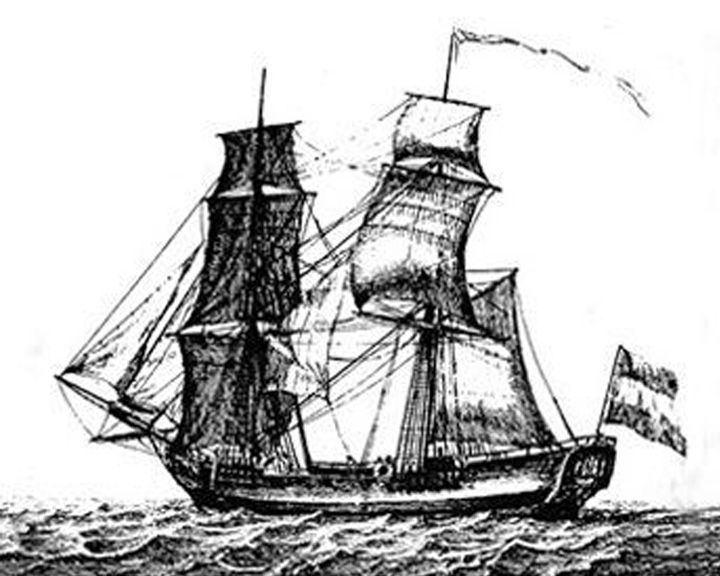 (Another (Another Vrouw Maria — Dutch merchant ship, wooden two-masted Treasure ship that went down with great artworks and jewelry for Catherine the Great. After its discovery in 1999, a Vrouw Maria Maritime Museum was established in Helsinki, Finland. LAUNCHED: 1770, circa → FATE: Sank October 3, 1771. |
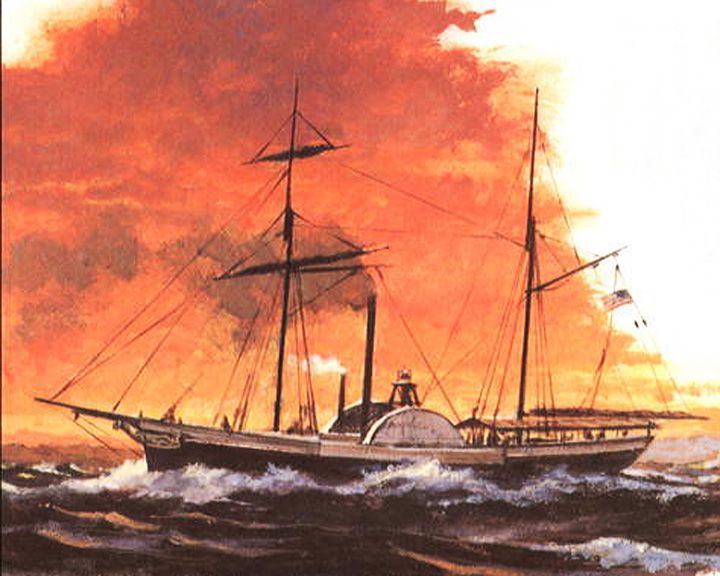 Walk-in-the-Water — American paddle steamboat, stern-wheeler with two masts First steamboat on Lake Erie and the eastern Great Lakes. Two large paddle boxes amidship housed her paddle wheels. LAUNCHED: 1818, August 23, first voyage → FATE: Grounded on the beach south of Buffalo, NY, October 31, 1821. |
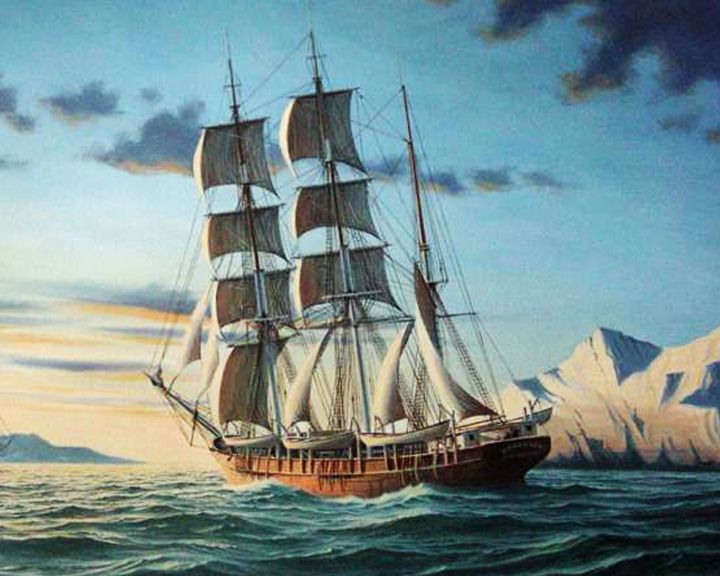 Wanderer — American whaling ship Last American whaling ship. The mast of the Wanderer stands as a flagpole in Boston Navy Yard, a few feet from where it was built. LAUNCHED: 1878 → FATE: Lost in a storm near Cuttyhunk Island, Massachusetts, on August 26, 1924. |
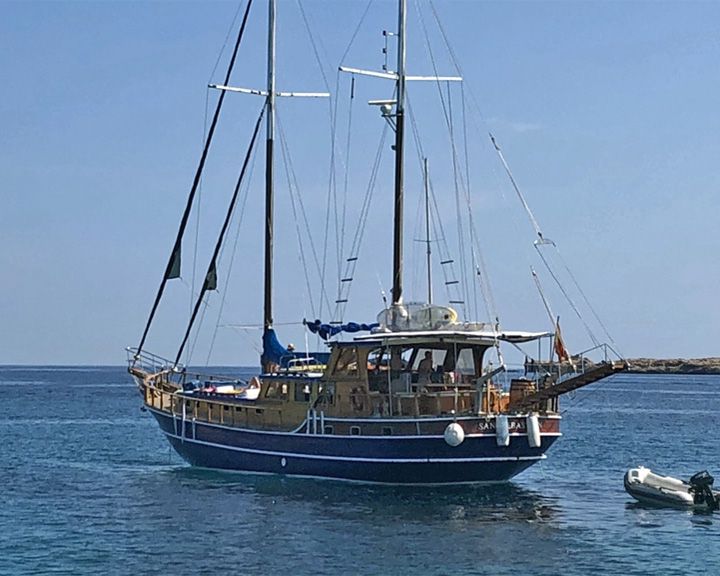 Wanderer — American yacht The boat in the 1992 comedy movie Captain Ron; starring Kurt Russell and Martin Short. The movie received mostly negative reviews. LAUNCHED: 1992 → FATE: Inconclusive. |
 Warrior, HMS — British warship First British iron-hulled, armour-plated warship. She was the largest, fastest, most heavily armed and armored warship up to that time. LAUNCHED: 1860, December 18 → FATE: Currently berthed in Portsmouth, England as a museum. |
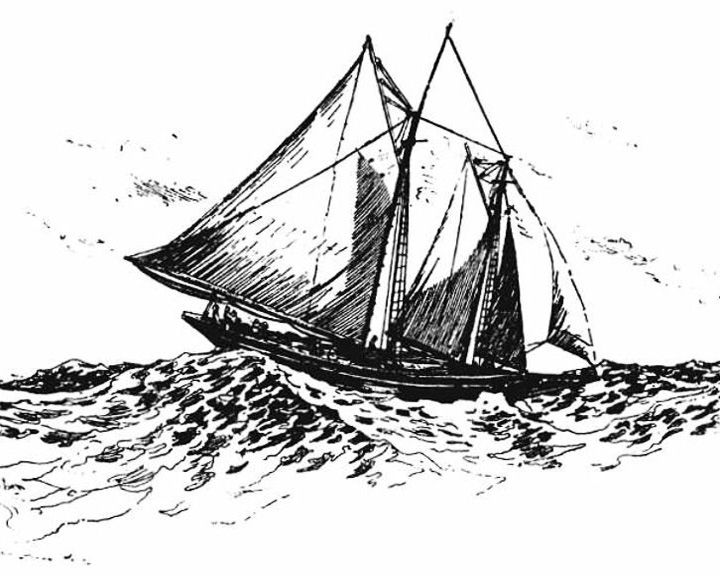 We're Here — American Schooner The fictional ship in the book and movie Captain Couraeous. Based on the 1897 book by Rudyard Kipling, it's a story of a boy and his adventures aboard a the ship. LAUNCHED: 1937 → FATE: Inconclusive. |
|
Page 20
|
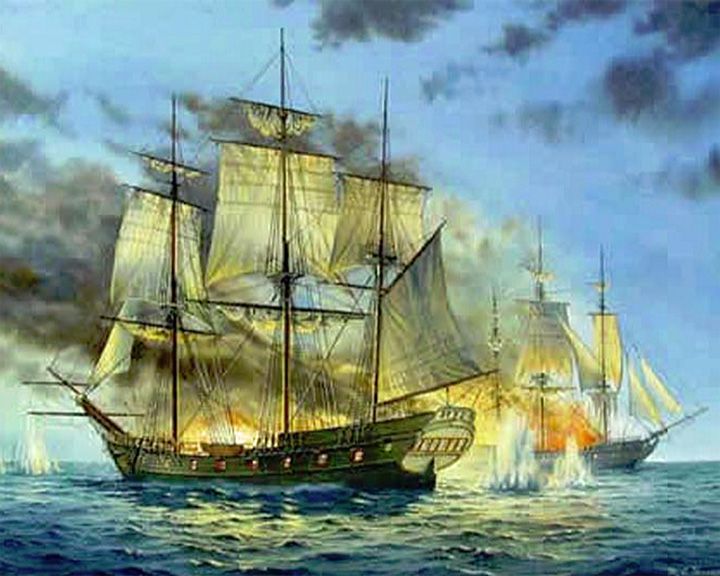 Whydah Gally — British sailing ship, square rigged three-masted Flagship of the pirate "Black Sam" Bellamy. The wreck was found in 1984. Artifacts from the wreck are on display at The Whydah Pirate Museum in Provincetown, Massachusetts. LAUNCHED: 1715 → FATE: Sank in a violent storm April 26, 1717. |
 Wyoming — American six-masted schooner The largest known wooden ship ever built. Because of her length she tended to flex in heavy seas causing the long planks to twist and buckle, allowing water to seep into the hold. LAUNCHED: 1909, December 15 → FATE: Foundered in a storm in 1924 and sank off the coast of Cape Cod with the loss of all 14 crewmen. |
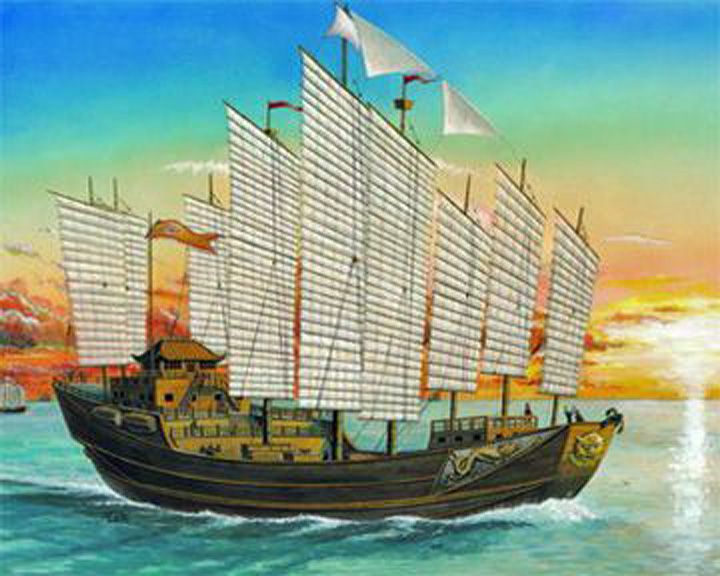 (Another (Another Zheng He's fleet — Chinese treasure ship The fleet's voyages came before most of the famous European voyages of discovery. Zheng He's seven expeditions were designed to establish a Chinese presence in the Indian Ocean and control trade. The ships dwarfed European ships of that century. LAUNCHED: 1405, first voyage → FATE: Last voyage, 1430. |
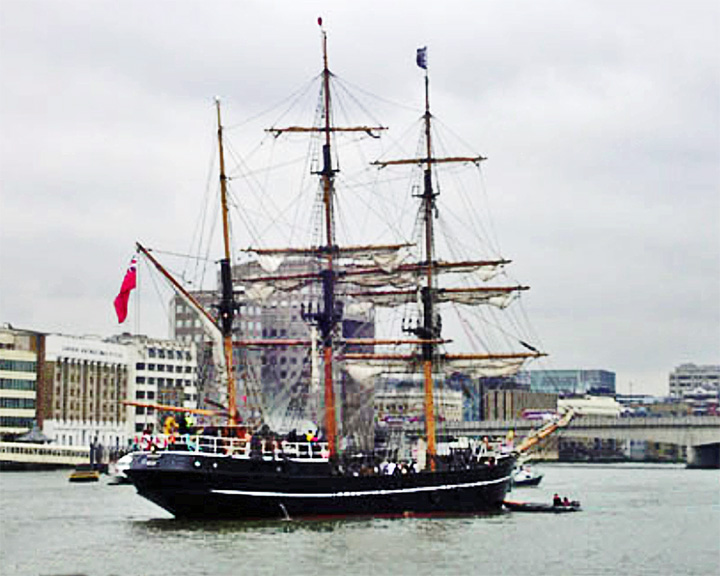 Zong — British square rigger slave ship Infamous for the 1781 massacre of 132 sick and dying slaves thrown overboard so the ship's owners could collect on their cargo insurance. The Zong had been a Dutch vessel the Zorgue seized by the British in 1781 off West Africa, along with 244 Africans on board. LAUNCHED: 1776, or ealier → FATE: Unknown. |
The number of All Countries Ships with Sails listed is 155 The contents of this page are available under the Creative Commons Attribution-Share Alike 3.0 Unported license and the GNU Free Documentation License (GFDL). |
|
|
First Ship on each page
| |
| Page | Ship Name (Country and Type) |
| 1. | Alabama, CSS (American Confederate screw sloop-of-war) |
| 2. | Batavia (Dutch galeon) |
| 3. | C.A. Thayer (American three-masted schooner) |
| 4. | Clermont (American steamboat) |
| 5. | Driver, HMS (British paddle sloop) |
| 6. | Etoile du Roy (British frigate) |
| 7. | Gloire (French ocean-going ironclad) |
| 8. | Gribshunden (Danish warship) |
| 9. | Jylland, HDMS (Danish screw-propelled steam frigate) |
| 10. | Lady Elizabeth (British 3-masted iron barque) |
| 11. | Mayflower (English galleon) |
| 12. | Niantic (American whaling ship) |
| 13. | Onrust (Dutch yacht) |
| 14. | Quaker City, USS (American paddle steamship) |
| 15. | Royal George, HMS (English first-rate ship of the line) |
| 16. | Savannah, SS (American paddle steamship) |
| 17. | Surprise, HMS (Canadian tall ship) |
| 18. | Trincomalee, HMS (British Leda-class frigate) |
| 19. | Ville de Paris (French ship of the line) |
| 20. | Whydah Gally (British sailing ship) |
All Countries | |
| 1. | Alabama, CSS American Confederate screw sloop-of-war |
| 2. | America American racing yacht |
| 3. | Ariel English clipper ship |
| 4. | Ark Royal, HMS English galleon |
| 5. | Artemis American sloop |
| 6. | Association, HMS British second-rate ship of the line |
| 7. | Batavia Dutch galeon |
| 8. | Beagle, HMS English sloop |
| 9. | Birkenhead, HMS British frigate |
| 10. | Bluenose Canadian schooner |
| 11. | Bonhomme Richard, USS American frigate |
| 12. | Boudeuse French frigate |
| 13. | Bounty (replica) Canadian collier |
| 14. | Bounty, HMS English collier |
| 15. | C.A. Thayer American three-masted schooner |
| 16. | Carroll A. Deering American schooner |
| 17. | Central America, SS American paddle steamboat |
| 18. | Challenger, HMS British corvette |
| 19. | Champion of the Seas English clipper ship |
| 20. | Charles W. Morgan American whaling ship |
| 21. | Christina O Greek luxury yacht |
| 22. | City of Adelaide English clipper ship |
| 23. | Clermont American steamboat |
| 24. | Clotilda American two-masted schooner |
| 25. | Colossus, HMS British third-rate ship of the line |
| 26. | Columbia Rediviva American full-rigged |
| 27. | Constellation, USS American sloop-of-war |
| 28. | Constitution, USS American frigate |
| 29. | Cutty Sark English clipper ship |
| 30. | Discovery British barque |
| 31. | Driver, HMS British paddle sloop |
| 32. | Duyfken Dutch barque |
| 33. | Empress of China American three-masted, square-rigged sailing ship |
| 34. | Endeavour, HMS British collier |
| 35. | Endurance Norwegian barquentine |
| 36. | Eos American three-masted Bermuda rigged |
| 37. | Esmeralda Chilean steam corvette |
| 38. | Essex American barque |
| 39. | Etoile du Roy British frigate |
| 40. | Flying Cloud American clipper |
| 41. | Flying Dutchman Dutch sailing ship |
| 42. | Fram Norwegian schooner |
| 43. | Frigorifique French steamship |
| 44. | Gaspée English single-masted sloop-of-war |
| 45. | Ghost American schooner |
| 46. | Gjøa Norwegian sloop |
| 47. | Gloire French ocean-going ironclad |
| 48. | Gokstad Viking clinker-built |
| 49. | Golden Hind English galleon |
| 50. | Golden Hinde English galleon |
| 51. | Great Britain, SS British steamship |
| 52. | Great Eastern, SS British iron paddle steamboat |
| 53. | Great Republic American clipper |
| 54. | Great Western, SS British paddle steamboat |
| 55. | Gribshunden Danish warship |
| 56. | Half Moon Dutch flyboat |
| 57. | Hannah, USS American schooner |
| 58. | Hermione, HMS British frigate |
| 59. | Hotspur, HMS British sloop-of-war |
| 60. | Huáscar Peruvian iron-clad |
| 61. | Investigator, HMS British collier |
| 62. | John Adams, USS American frigate |
| 63. | Jylland, HDMS Danish screw-propelled steam frigate |
| 64. | Kalmar Nyckel Swedish full-rigged pinnace |
| 65. | Kathleen and May British three masted schooner |
| 66. | Keying, Junk Chinese junk |
| 67. | L'Hydroptère French speed sailboat |
| 68. | La Amistad Spanish schooner |
| 69. | La Belle French barque |
| 70. | La Gloire French battleship |
| 71. | Lady Elizabeth British 3-masted iron barque |
| 72. | Lady Lovibond English schooner |
| 73. | Maltese Falcon American full-rigged |
| 74. | Mars Swedish three masted warship |
| 75. | Mary Celeste American brigantine |
| 76. | Mary Rose English carrack-type |
| 77. | Maryland Dove American merchant vessel |
| 78. | Matthew English caravel |
| 79. | Mayflower English galleon |
| 80. | Medusa French frigate |
| 81. | Merchant Royal English merchant ship |
| 82. | Mirny Russian sloop-of-war |
| 83. | Moshulu Scottish barque |
| 84. | Myron, SS American wooden steamship |
| 85. | Napoléon, (Le) French battleship |
| 86. | Nemesis British steam and sail powered warship |
| 87. | Niantic American whaling ship |
| 88. | Nina, (La) Spanish caravel |
| 89. | Ning Po Chinese junk |
| 90. | Nuestra Señora de las Mer Spanish frigate |
| 91. | Numancia Spanish broadside ironclad |
| 92. | Octavius English schooner |
| 93. | Olympias Greek trireme |
| 94. | Oneida American yacht |
| 95. | Onrust Dutch yacht |
| 96. | Pamir German barque |
| 97. | Pequod American whaling ship |
| 98. | Pinta, (La) Spanish three masted caravel |
| 99. | Portland, PS American sidewheel steamer |
| 100. | President, SS British paddle steamship |
| 101. | Preußen German windjammer |
| 102. | Prins Willem replica Dutch brig |
| 103. | Quaker City, USS American paddle steamship |
| 104. | Queen Anne's Revenge English sloop |
| 105. | Red Rover, USS American Confederate paddle steamboat |
| 106. | Resolution, HMS British Collier |
| 107. | Robert E. Lee American paddle steamboat |
| 108. | Rochambeau American frigate |
| 109. | Royal Charles, HMS British first-rate three-decker ship of the line |
| 110. | Royal Clipper German tall ship |
| 111. | Royal George, HMS English first-rate ship of the line |
| 112. | São Gabriel Portugese caravel |
| 113. | São Martinho Portuguese galleon |
| 114. | Sailrocket 2 Australian speed sailboat |
| 115. | San José Spanish galleon |
| 116. | San Juan Bautista Japanese galleon |
| 117. | Santísima Trinidad Spanish ship of the line |
| 118. | Santa Maria Spanish carrack |
| 119. | Savannah, SS American paddle steamship |
| 120. | Sea Venture English merchant ship |
| 121. | Seeadler, SMS Scottish windjammer |
| 122. | Shenandoah, CSS American Confederate full-rigged ship |
| 123. | Somers, USS American brig |
| 124. | Sovereign of the Seas, HMS English full-rigged |
| 125. | St. Roch Canadian schooner |
| 126. | Sultana, SS American paddle steamboat |
| 127. | Surprise, HMS Canadian tall ship |
| 128. | Susan Constant British fully-rigged ship |
| 129. | Sussex, HMS English ship of the line |
| 130. | Tek Sin Chinese ocean-going junk |
| 131. | Terra Nova British wooden-hulled barque |
| 132. | Thermopylae English extreme clipper |
| 133. | Thomas W. Lawson American seven-masted schooner |
| 134. | Tonquin American merchant ship |
| 135. | Trincomalee, HMS British Leda-class frigate |
| 136. | U-505 German submarine |
| 137. | Umbria, RMS British ocean liner |
| 138. | Unicorn British three-masted sailing ship |
| 139. | Vanguard, HMS English ship of the line |
| 140. | Vasa Swedish wooden warship |
| 141. | Victoria Spanish carrack or nao |
| 142. | Victory, HMS English first-rate |
| 143. | Ville de Paris French ship of the line |
| 144. | Vincennes, USS American sloop of war |
| 145. | Vrouw Maria Dutch merchant ship |
| 146. | Walk-in-the-Water American paddle steamboat |
| 147. | Wanderer American whaling ship |
| 148. | Wanderer American yacht |
| 149. | Warrior, HMS British warship |
| 150. | We're Here American Schooner |
| 151. | Whydah Gally British sailing ship |
| 152. | Wyoming American six-masted schooner |
| 153. | Zheng He's fleet Chinese treasure ship |
| 154. | Zong British square rigger |
|
About the Data There are more than 400 ships in this database, but the initial list is only for famous ships names that begin with letters "A-B". For other listings, use the country and type tabs. Touching (or cursor over) a ship image produces an enlargement. Touch anywhere else (or move the cursor off the image) to close the larger image. Touching (or clicking on) any underlined name will link to a page with more information. Although submarines are usually called boats, they are grouped with ships here. Most of the information comes from Wikipedia. |
^
Other Pages in Names Galore: | |
Famous Cowboy Names Sports Team Names Other Name Lists | Name Generators Naming Fun Stories about Names |